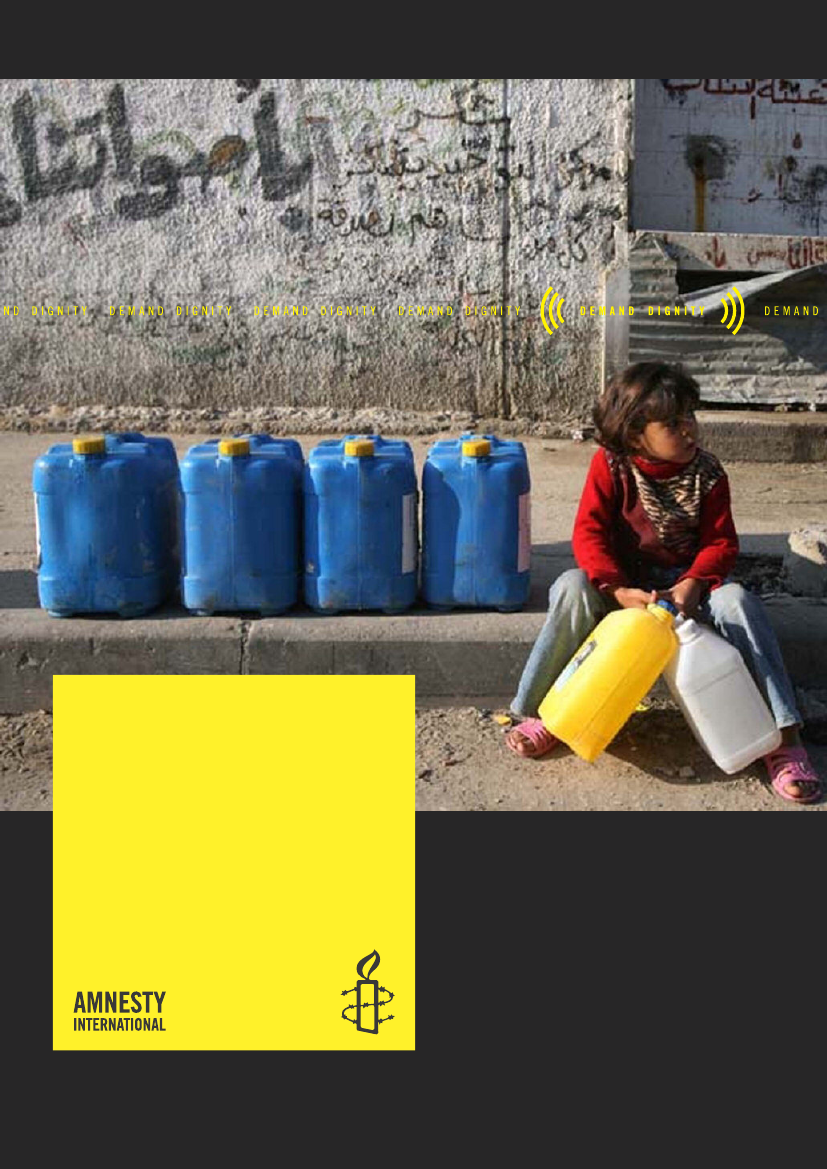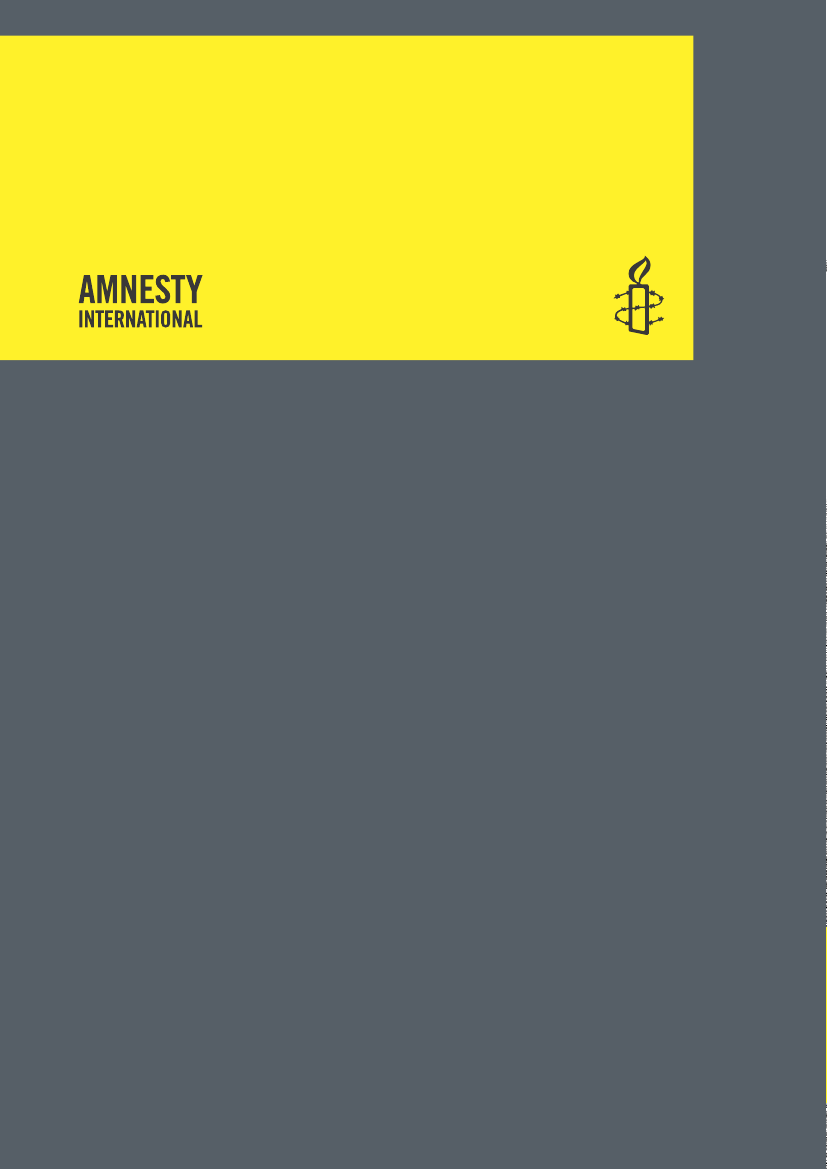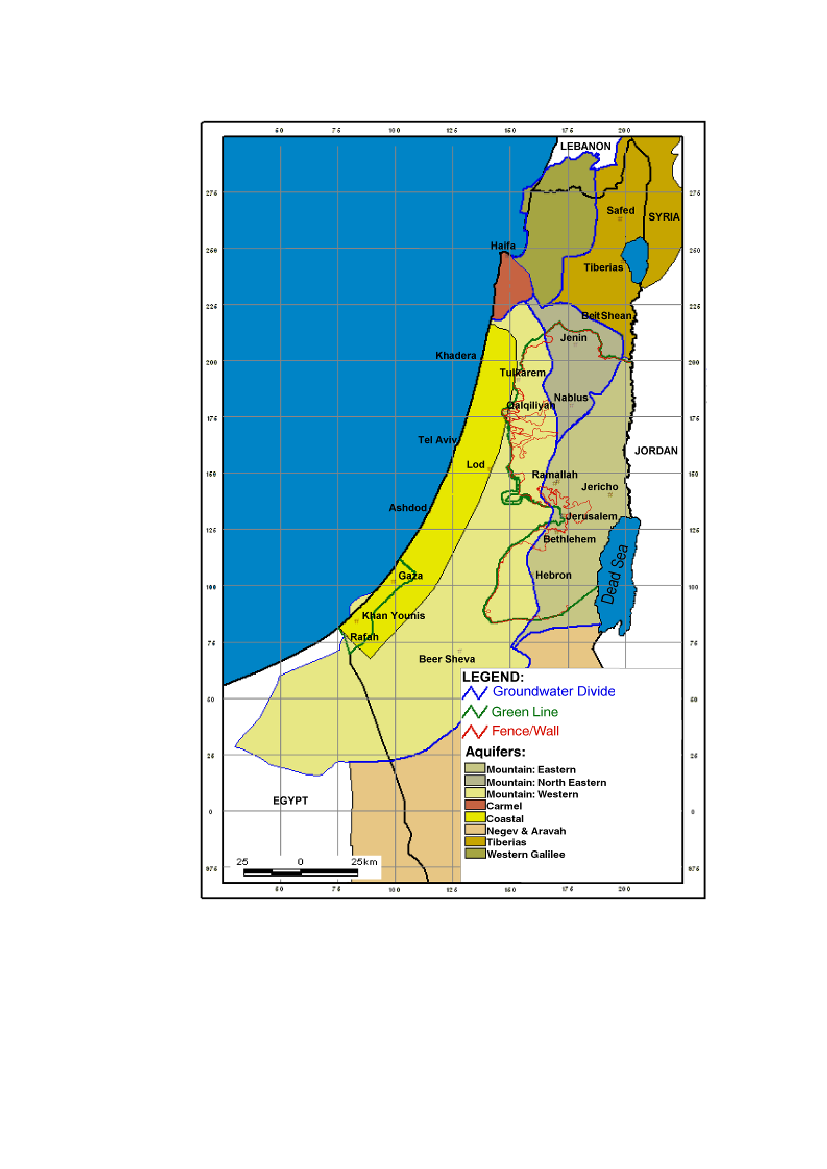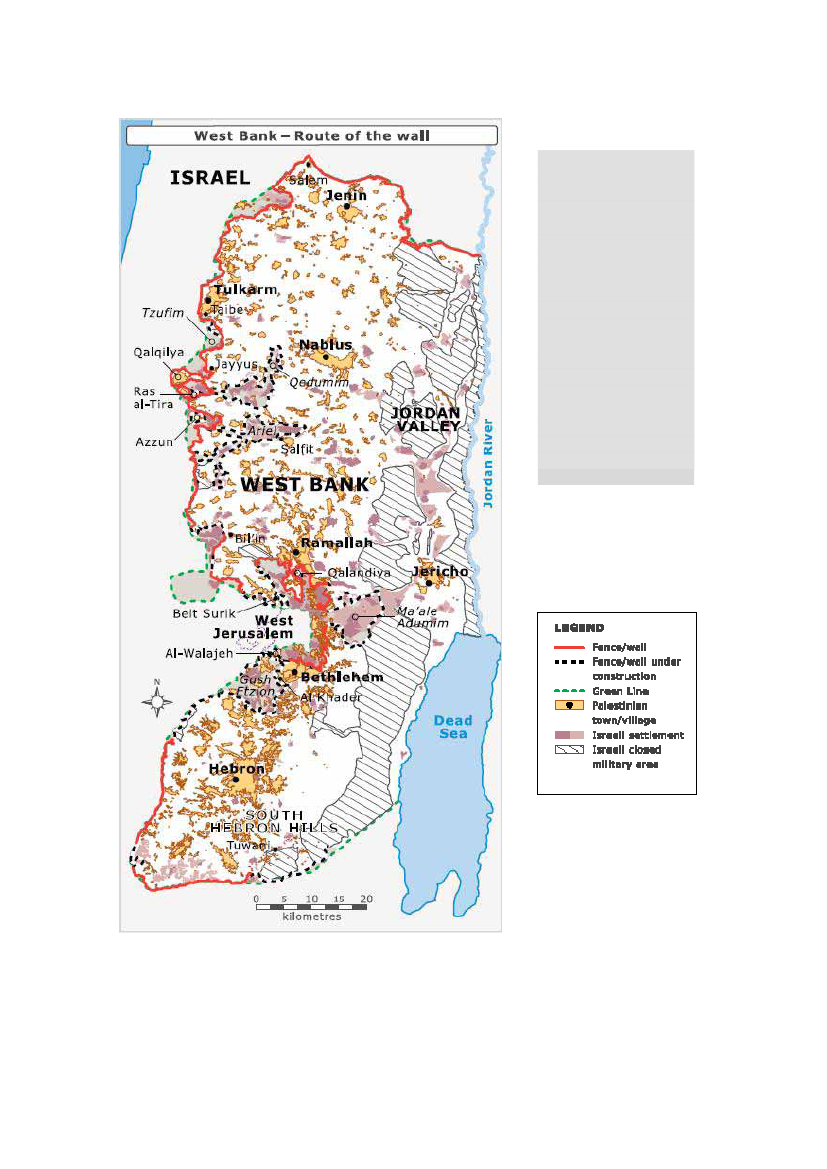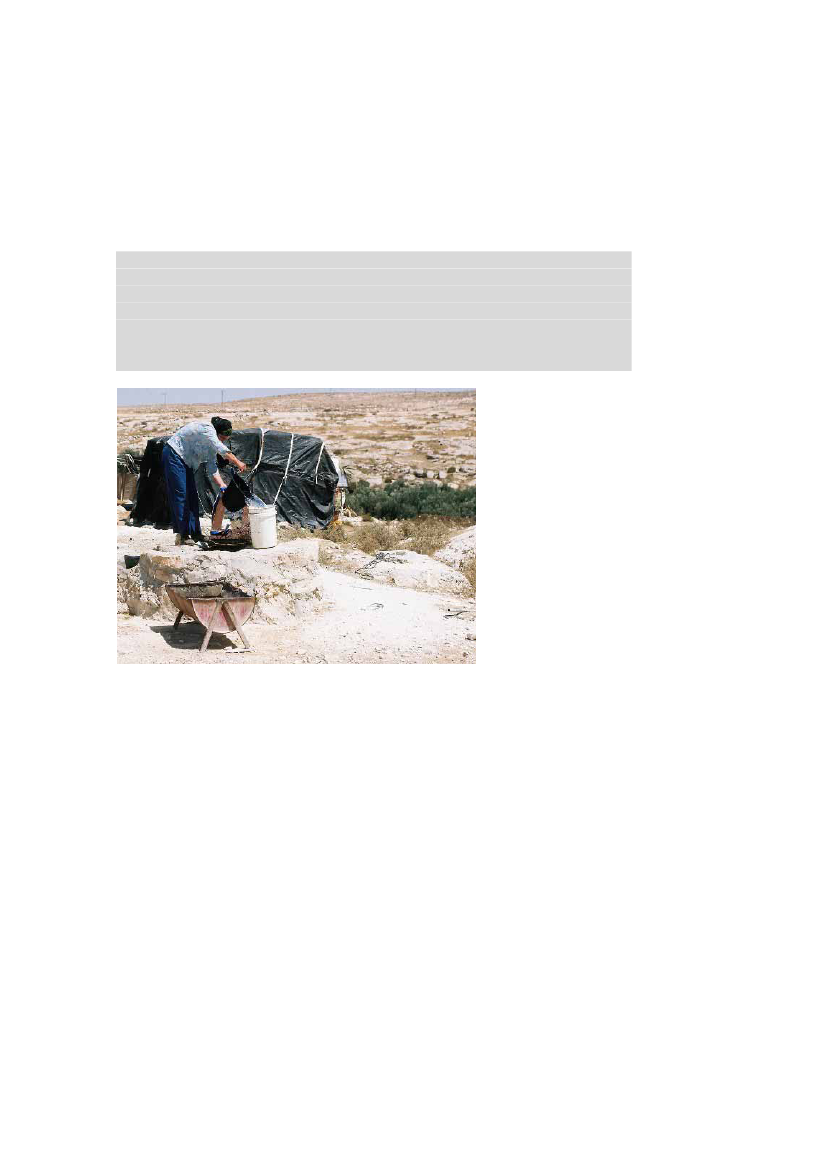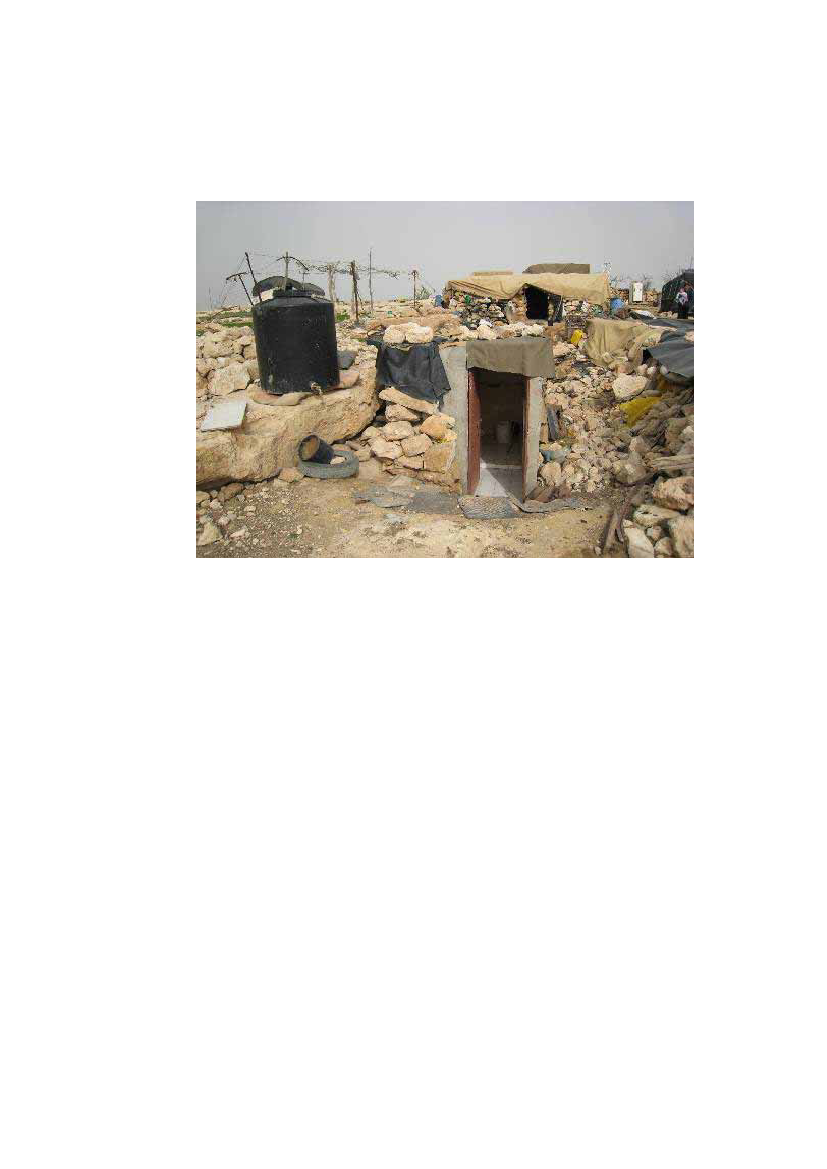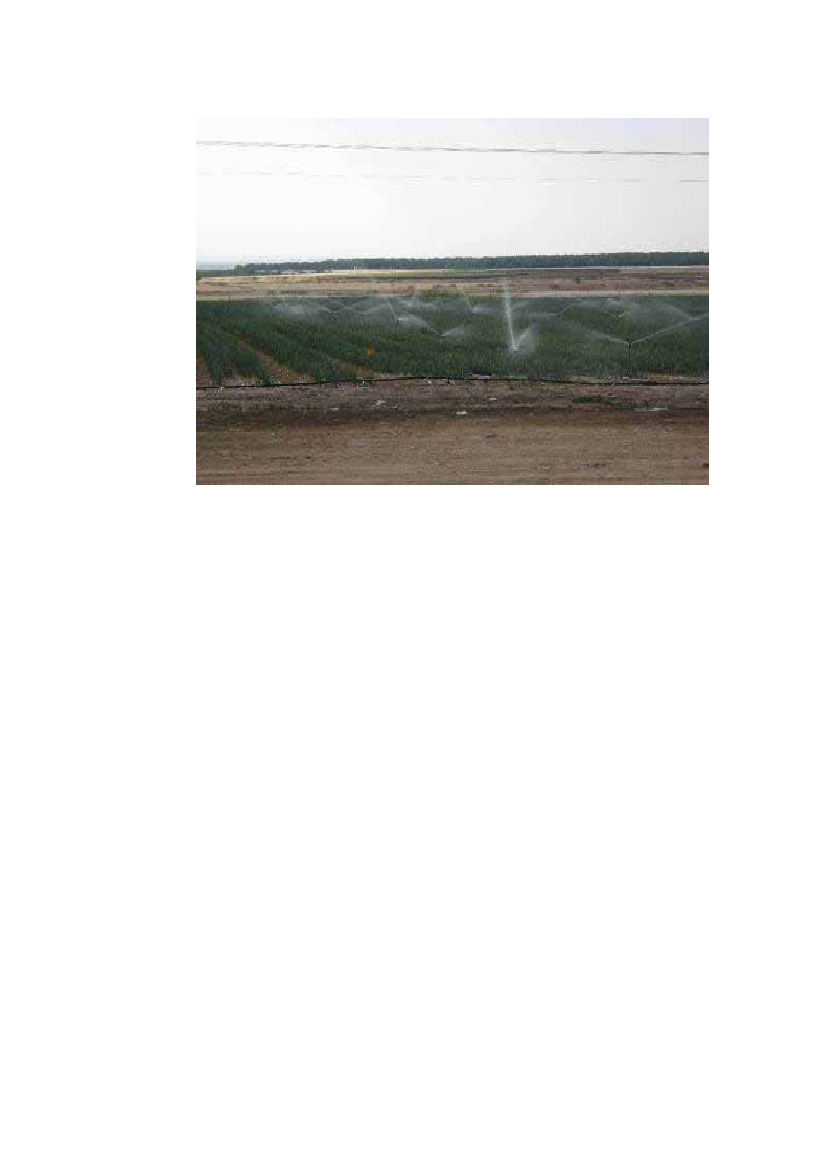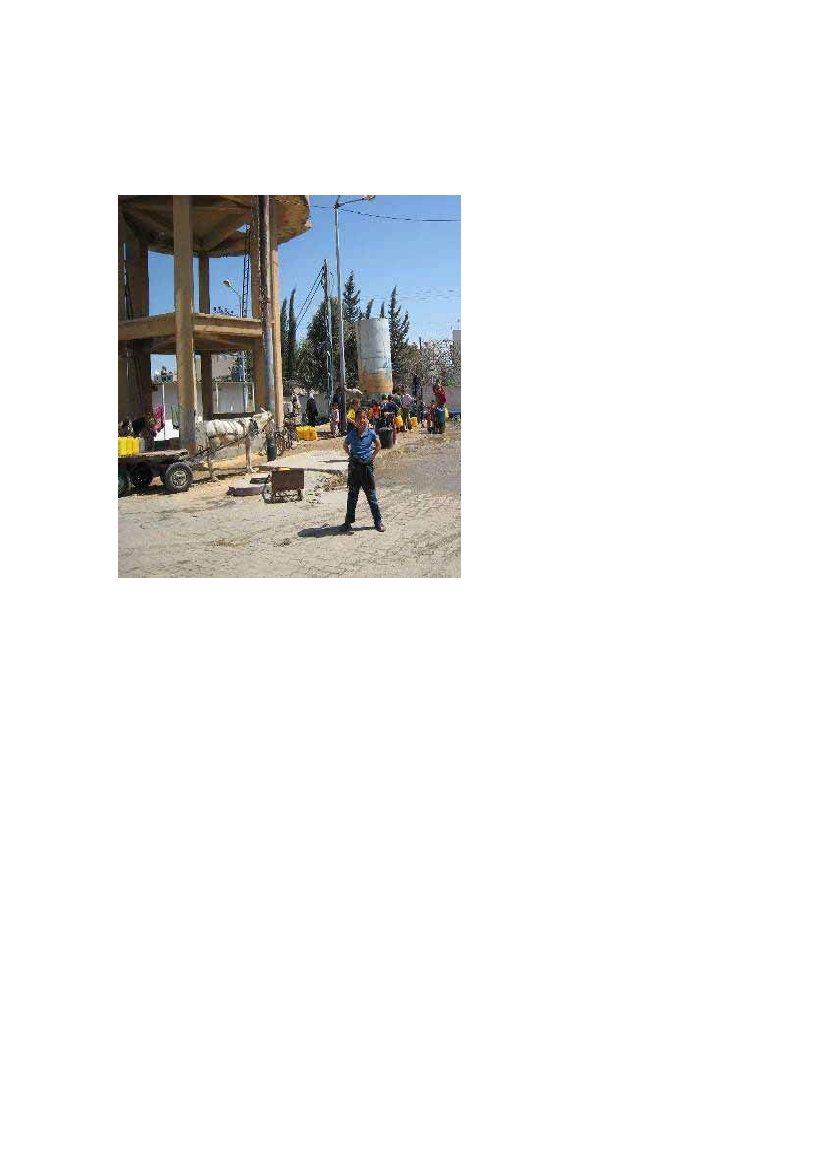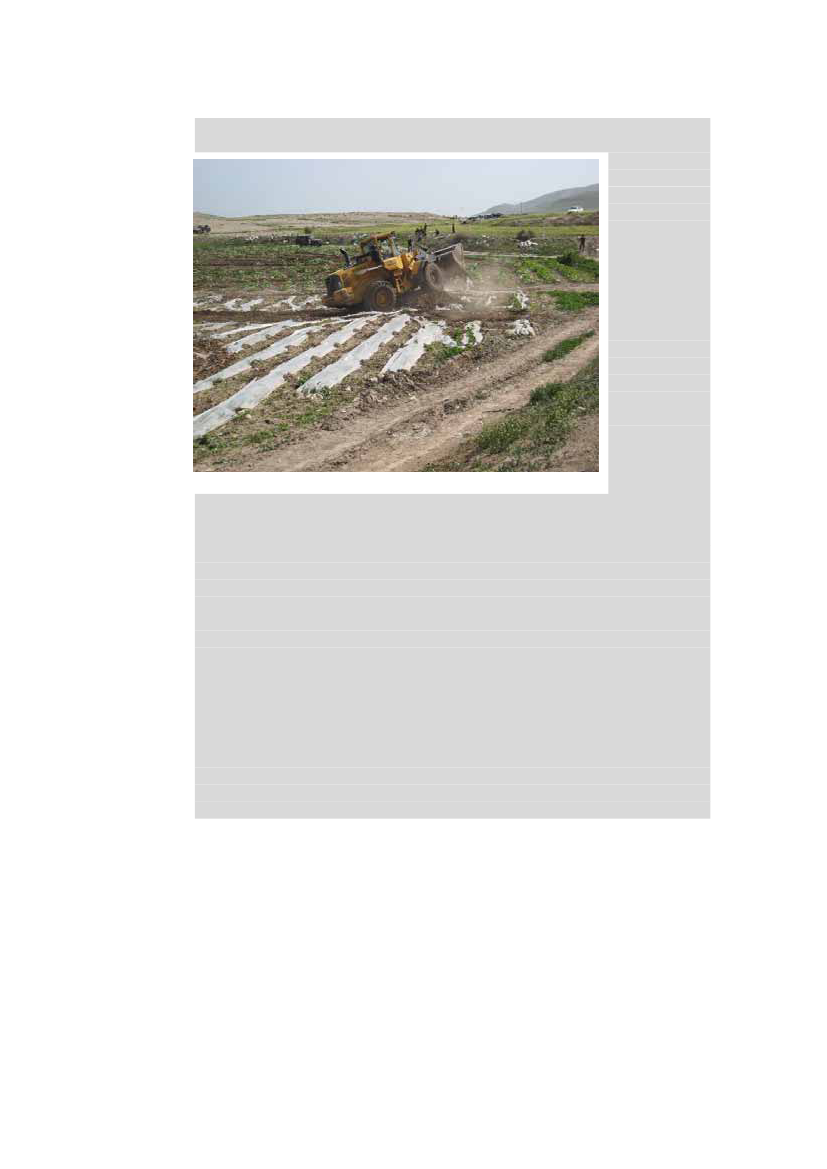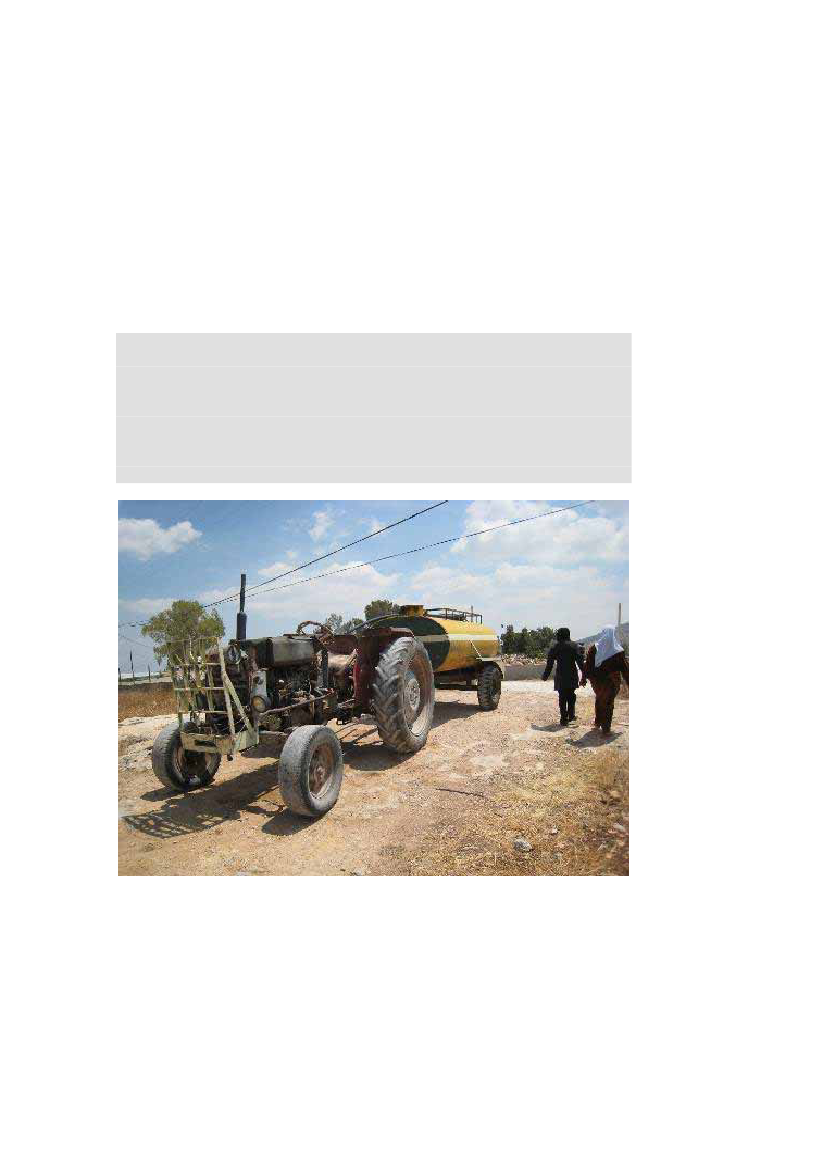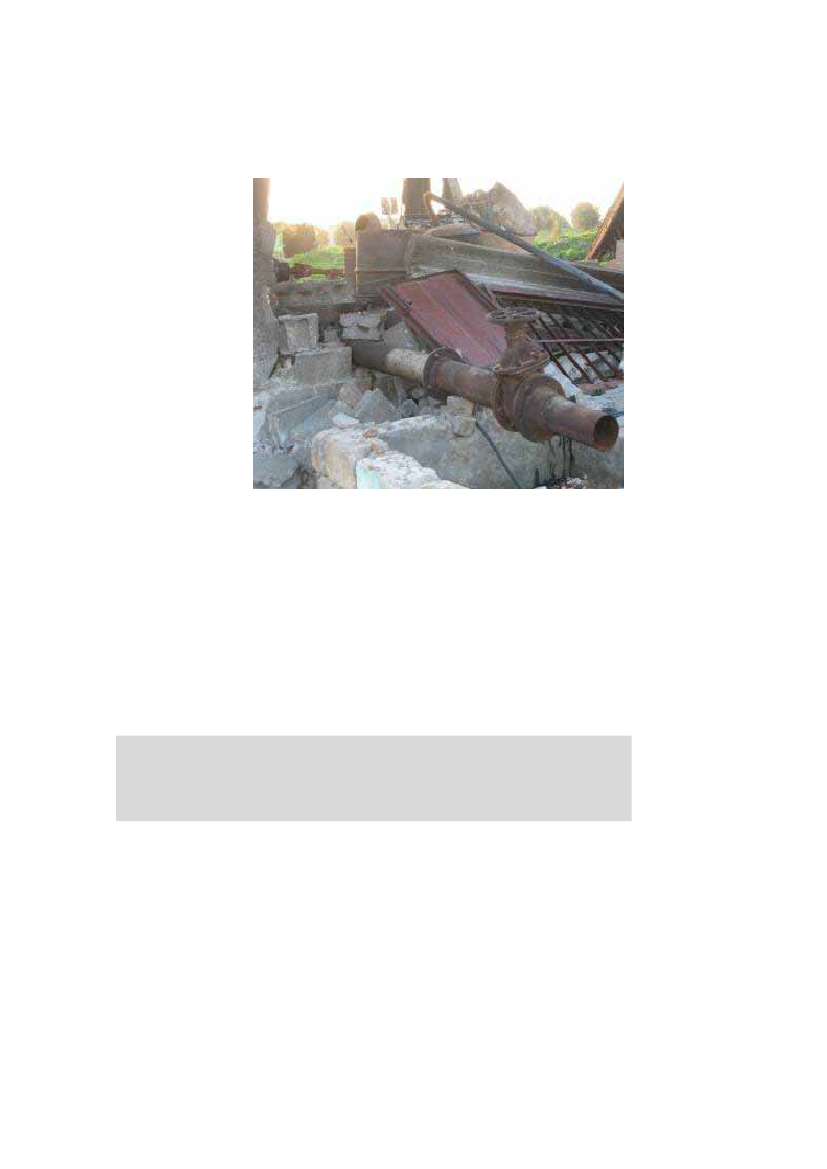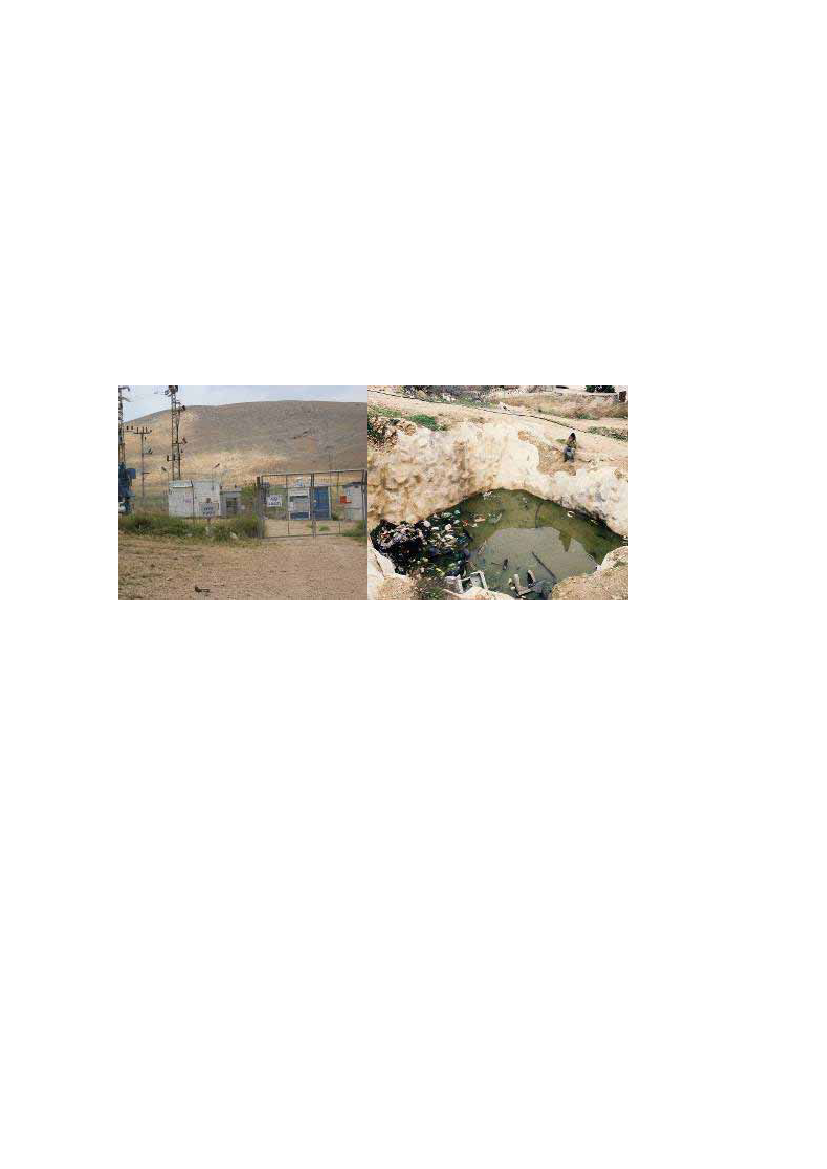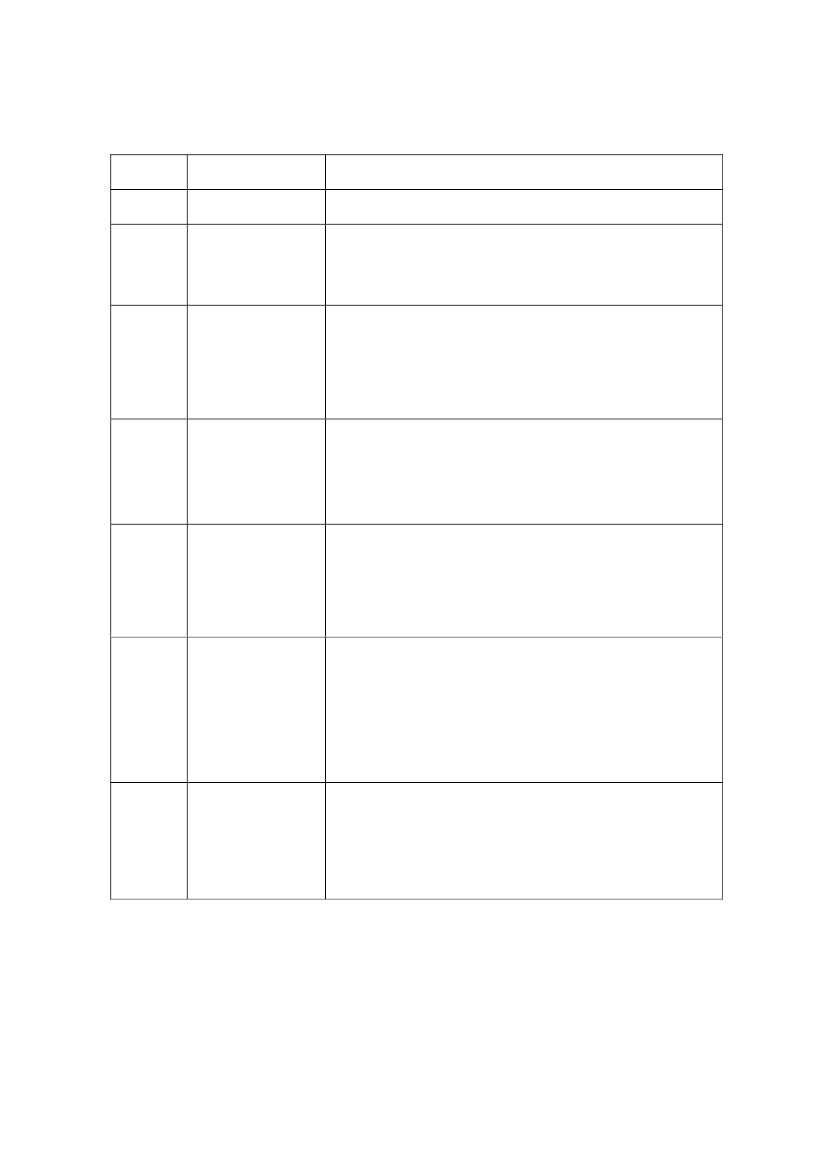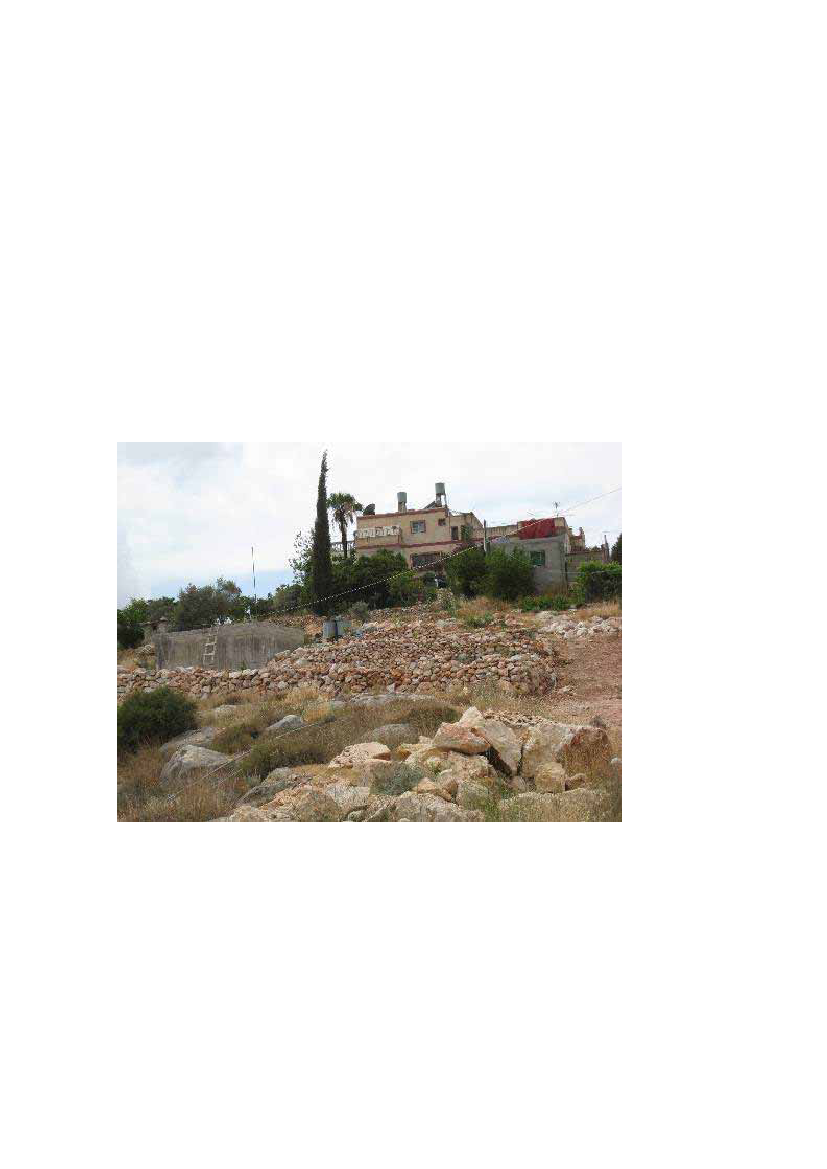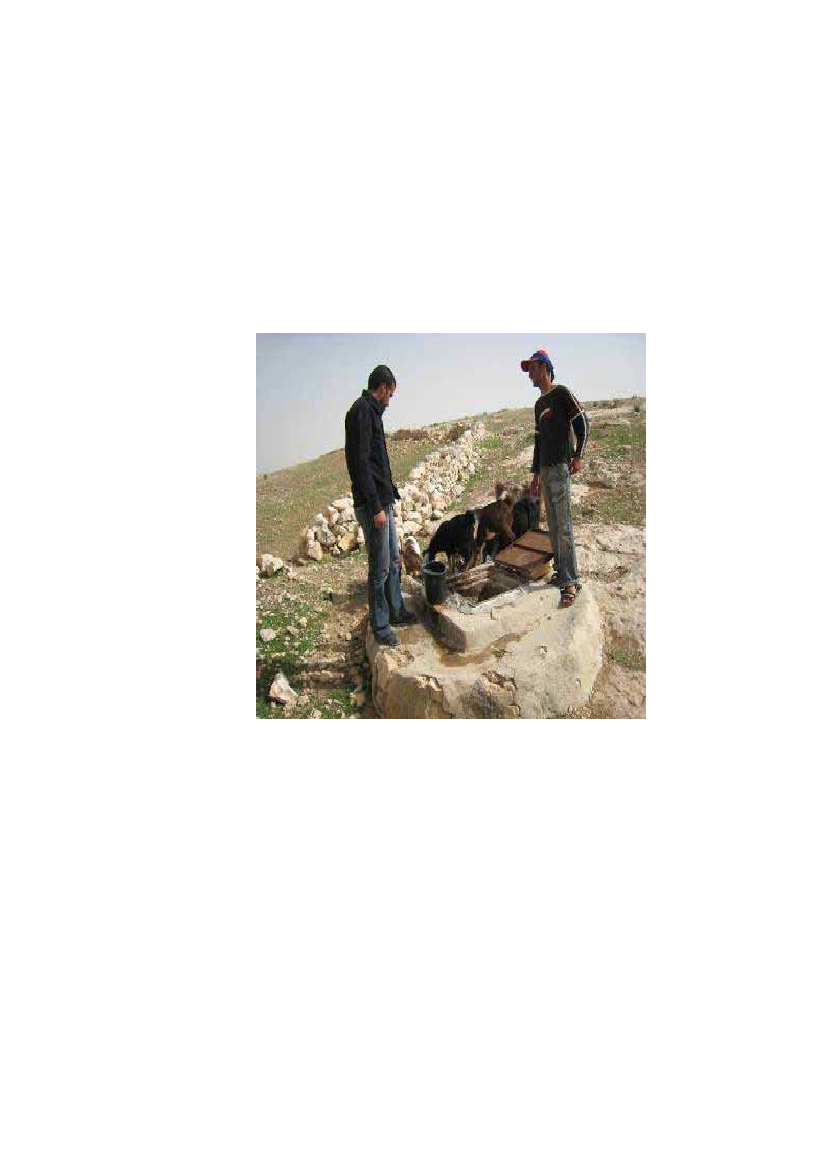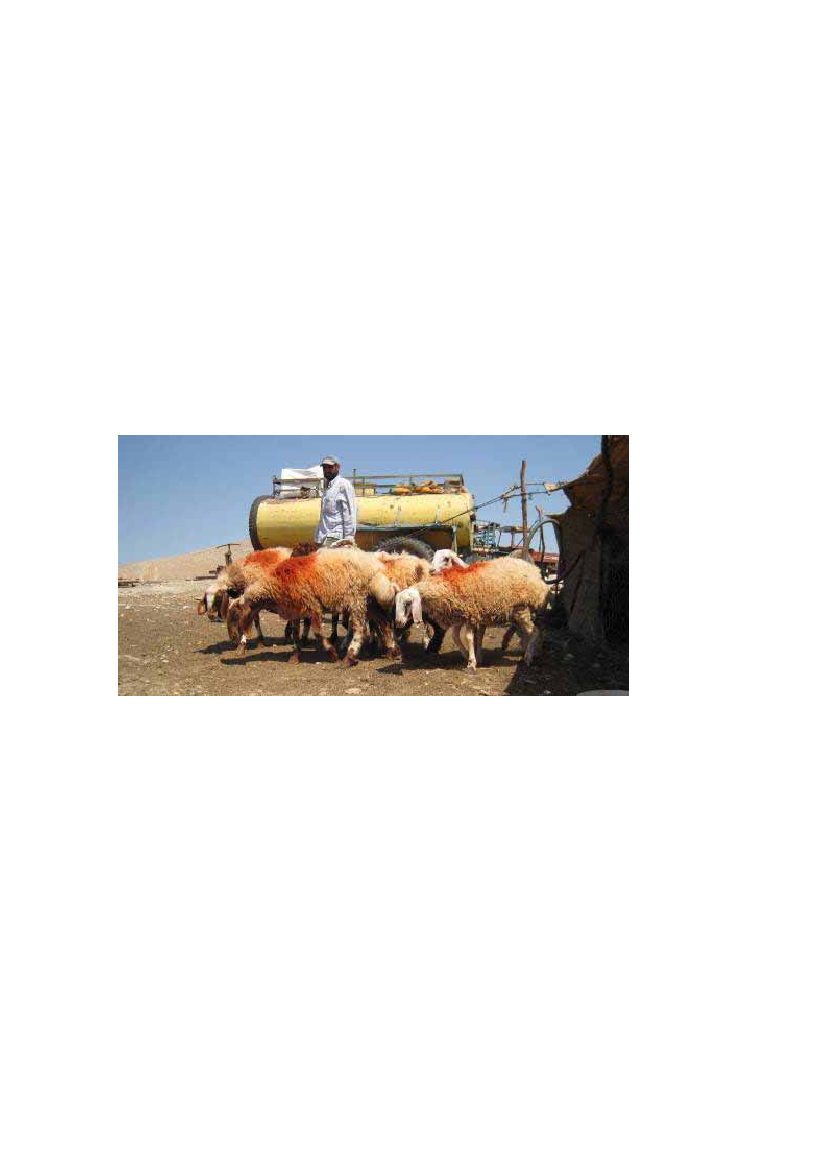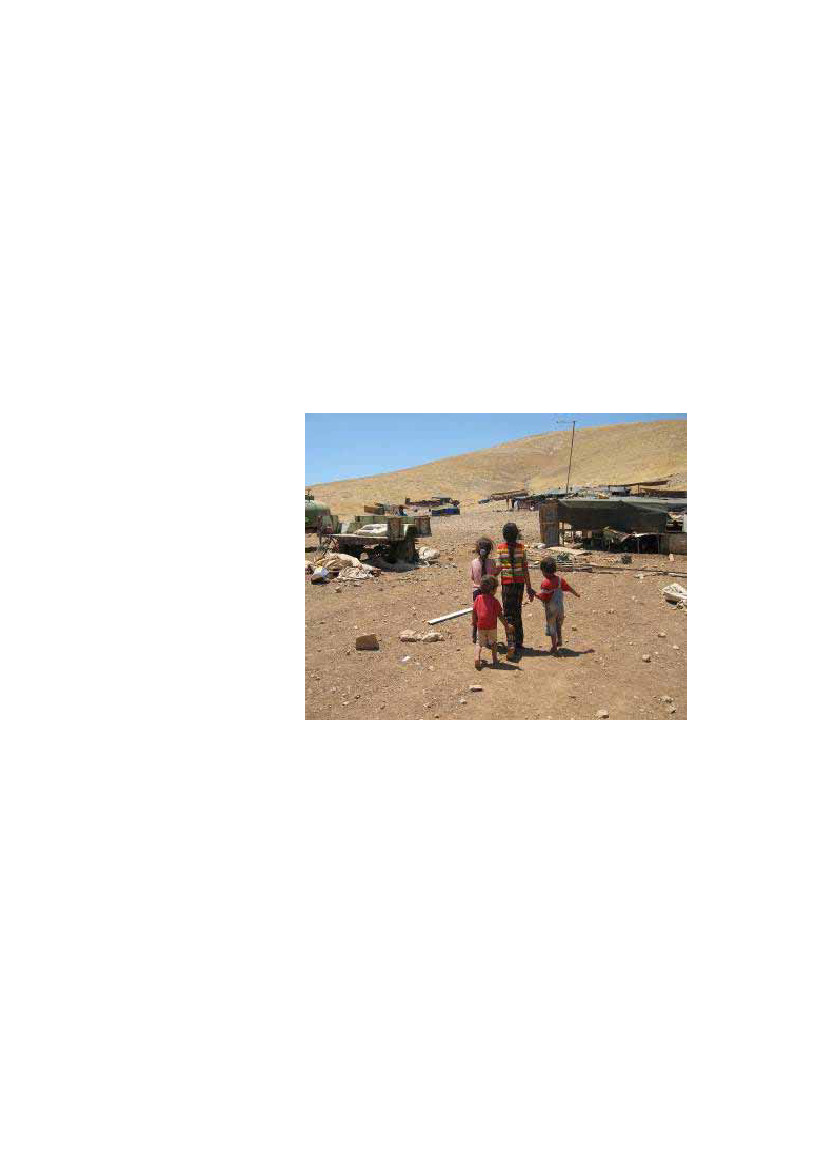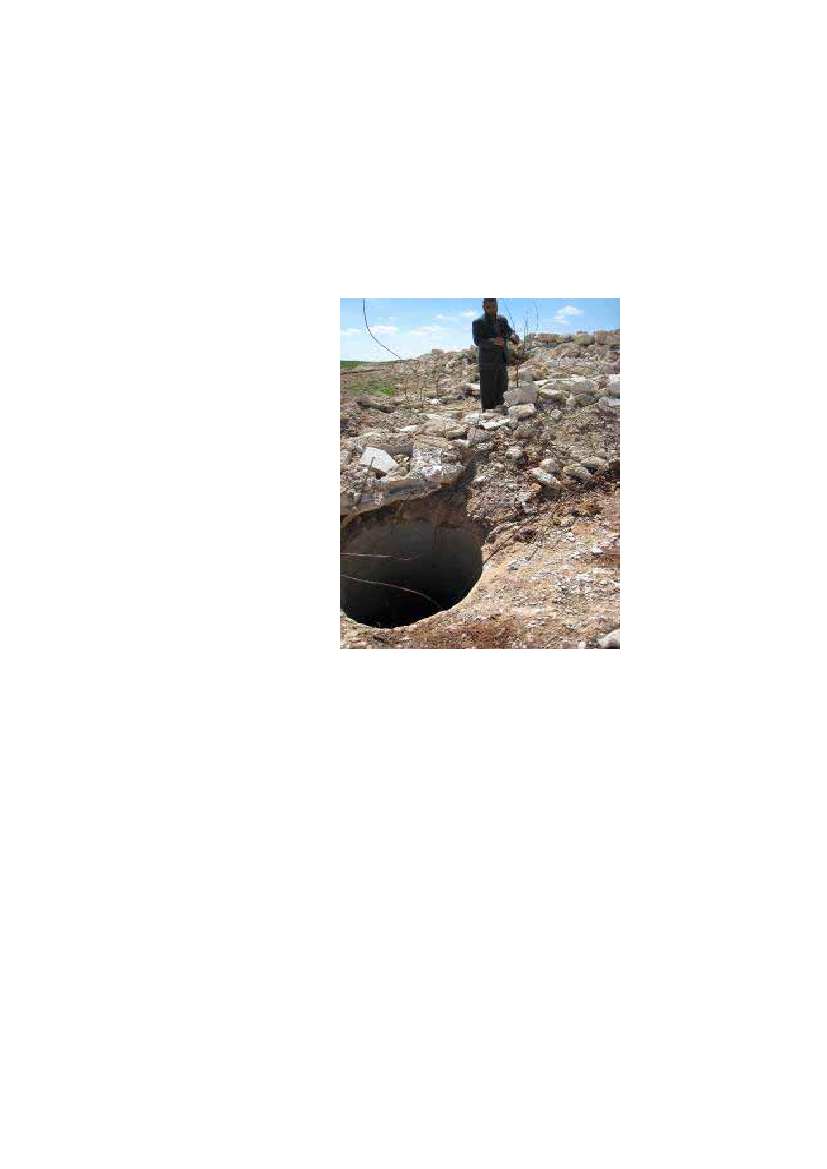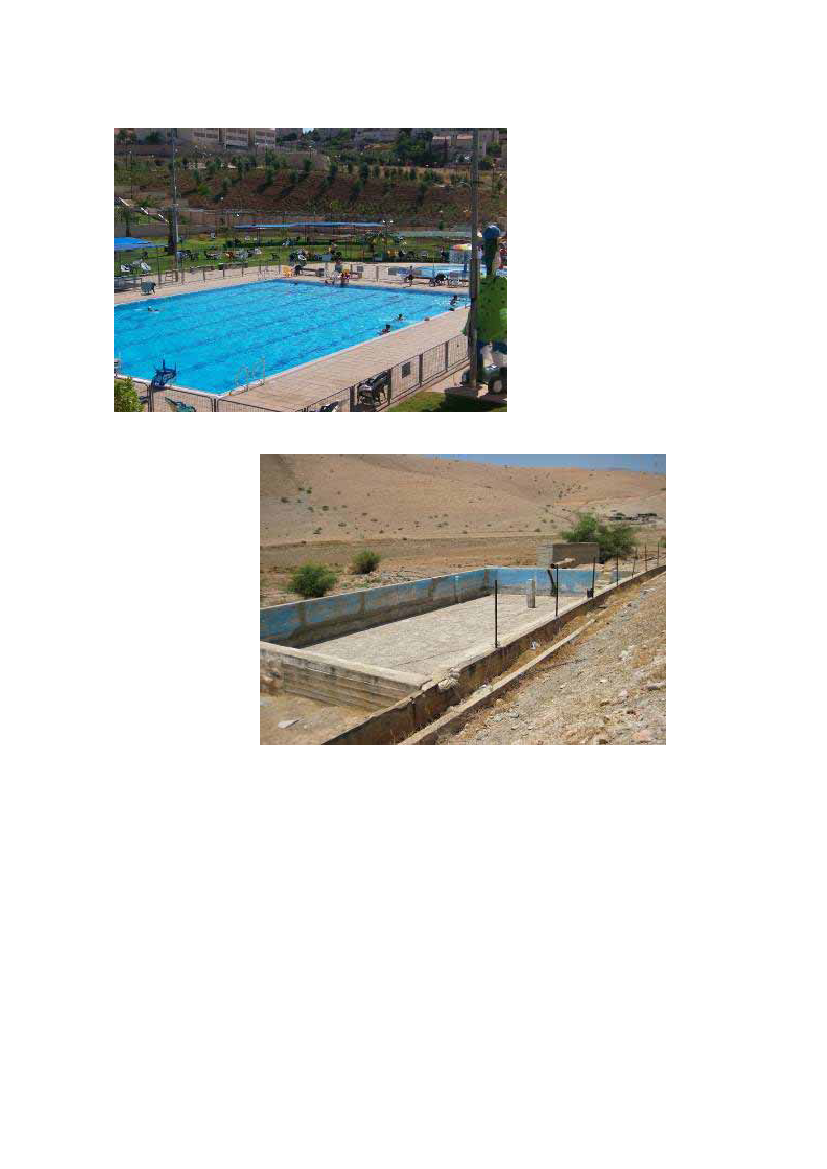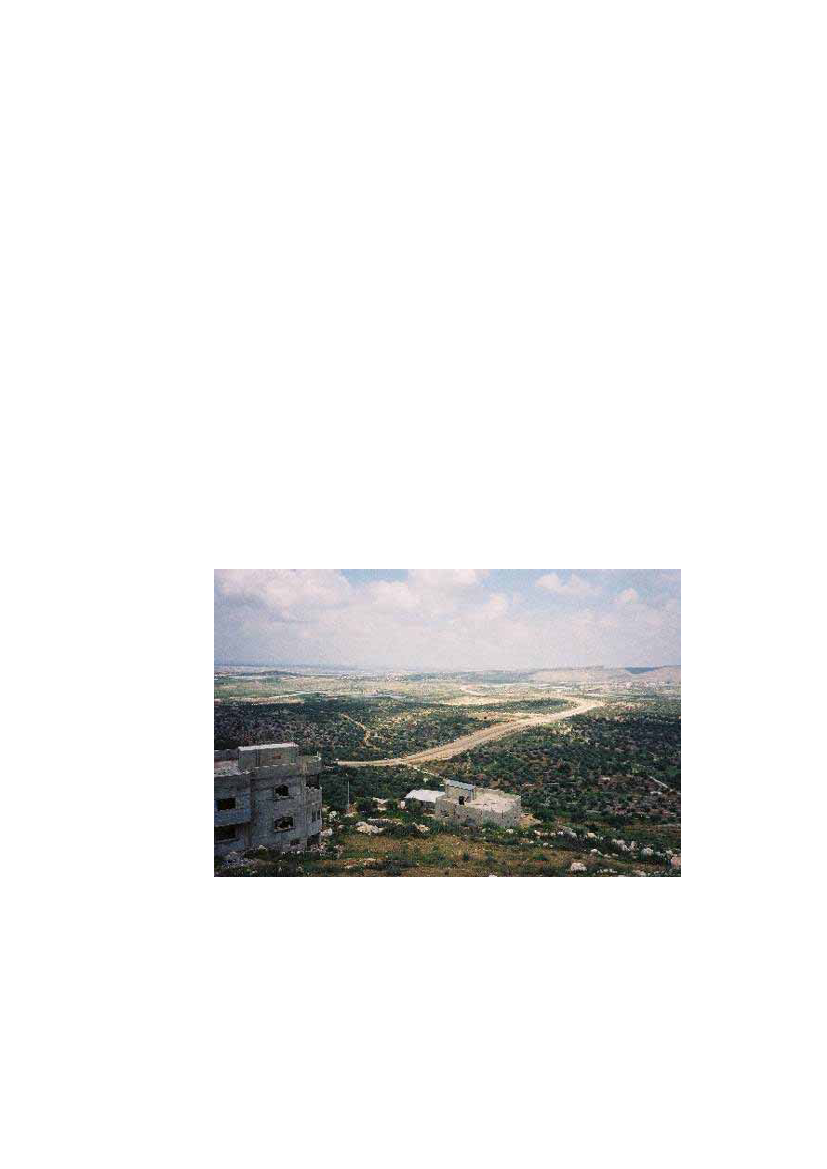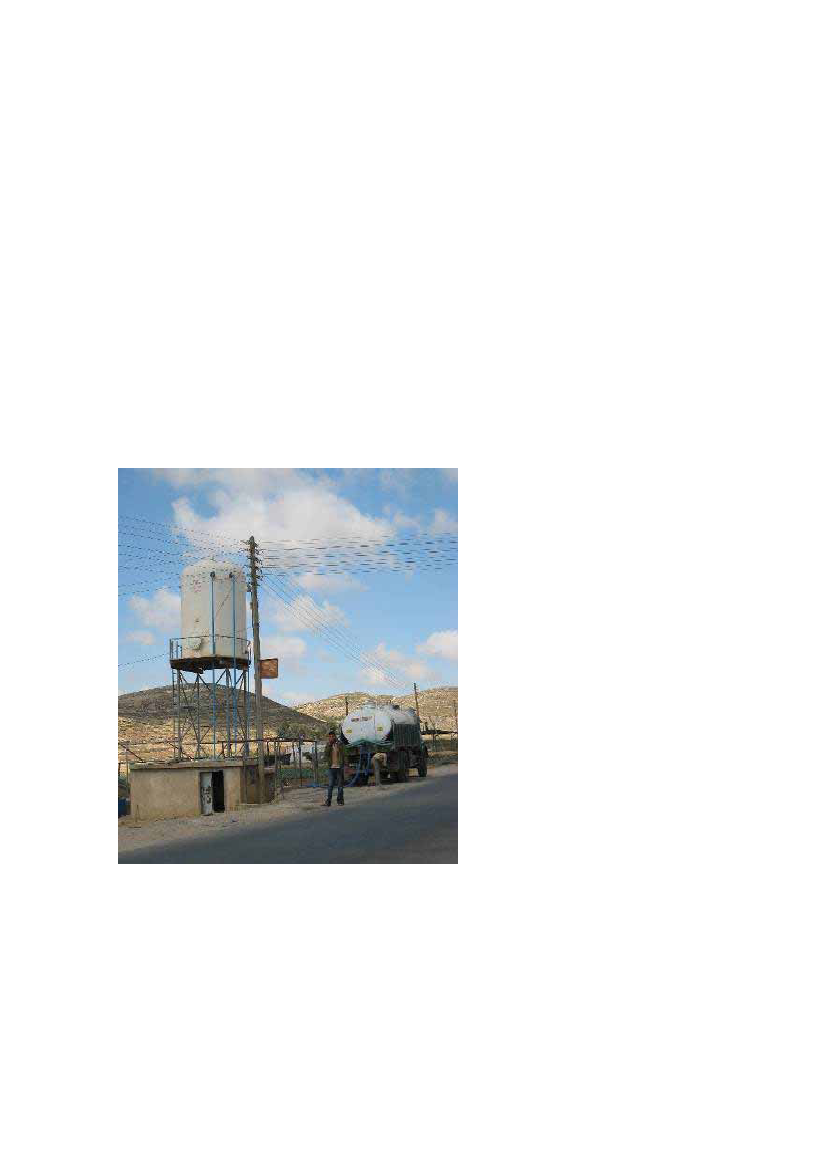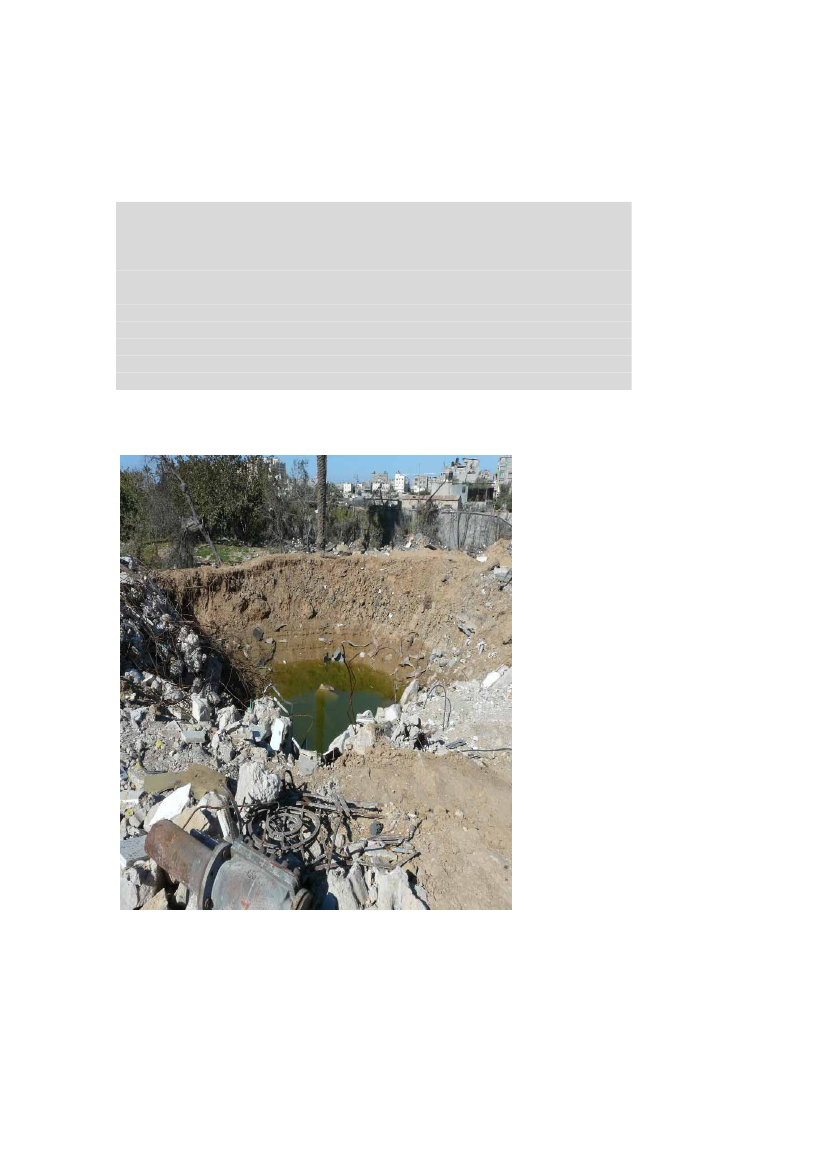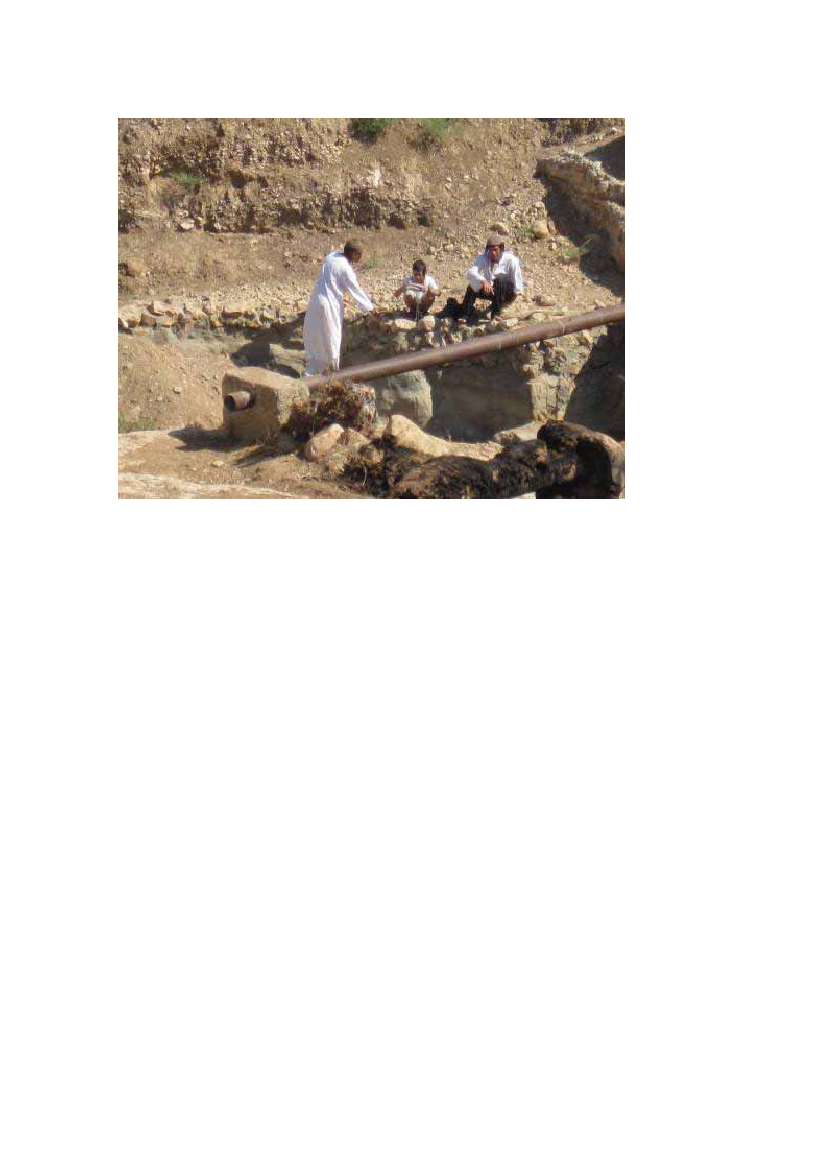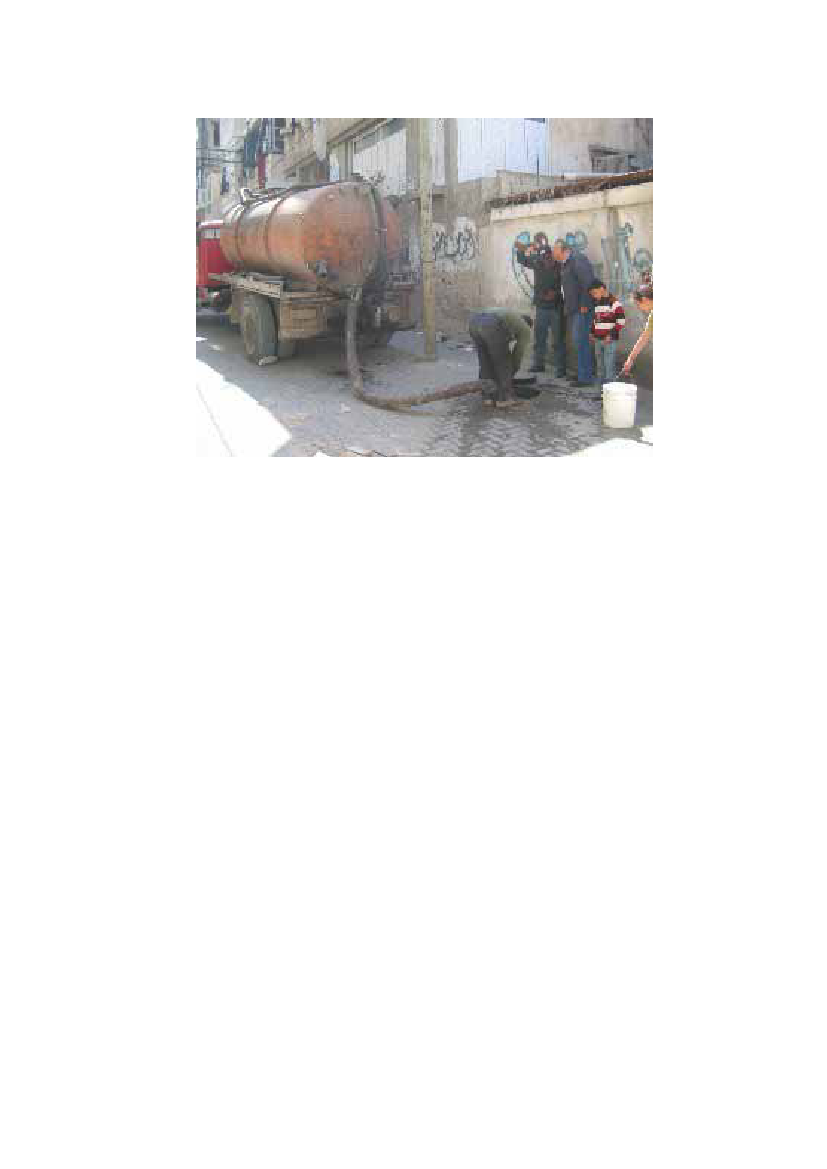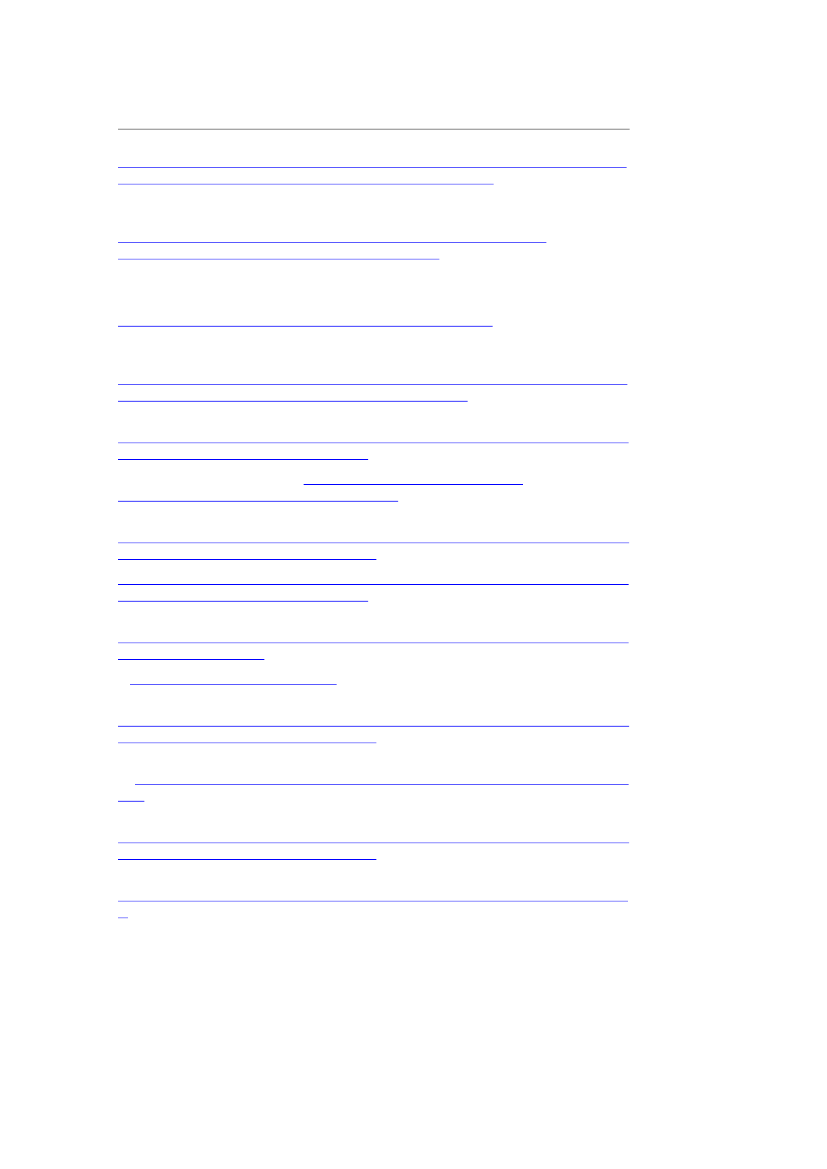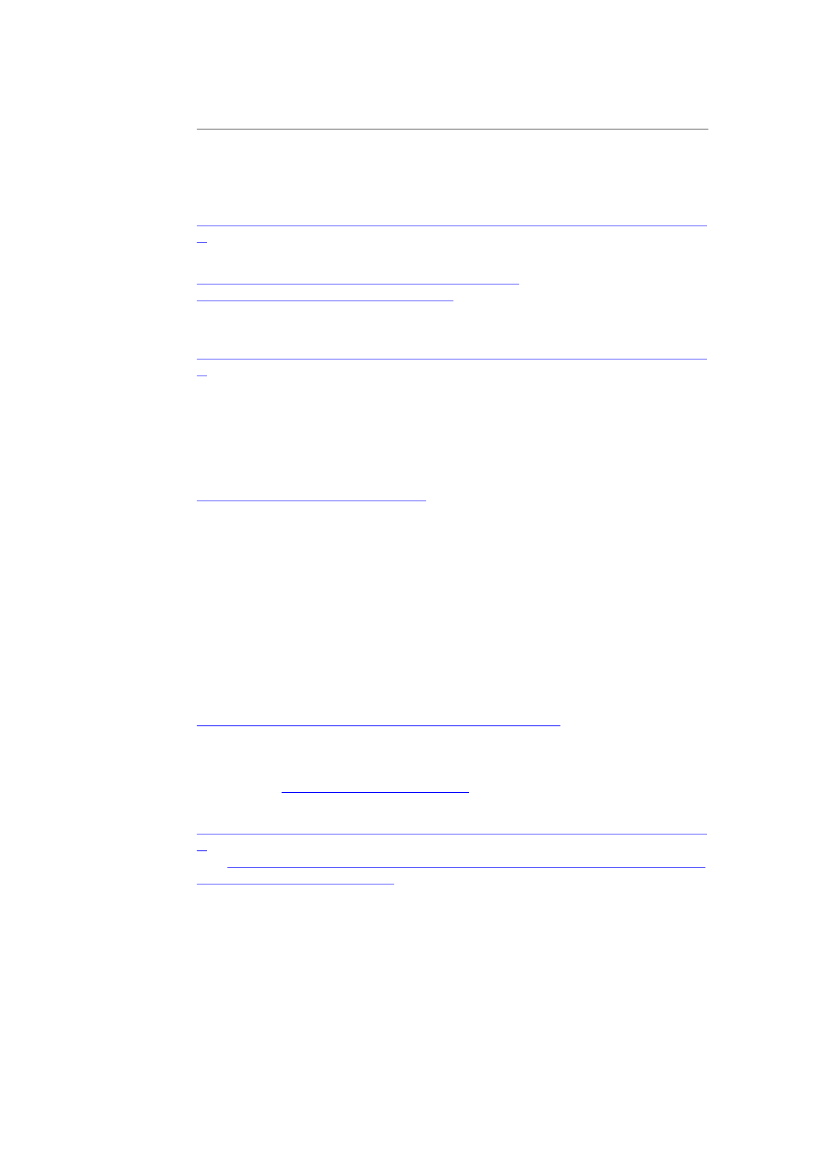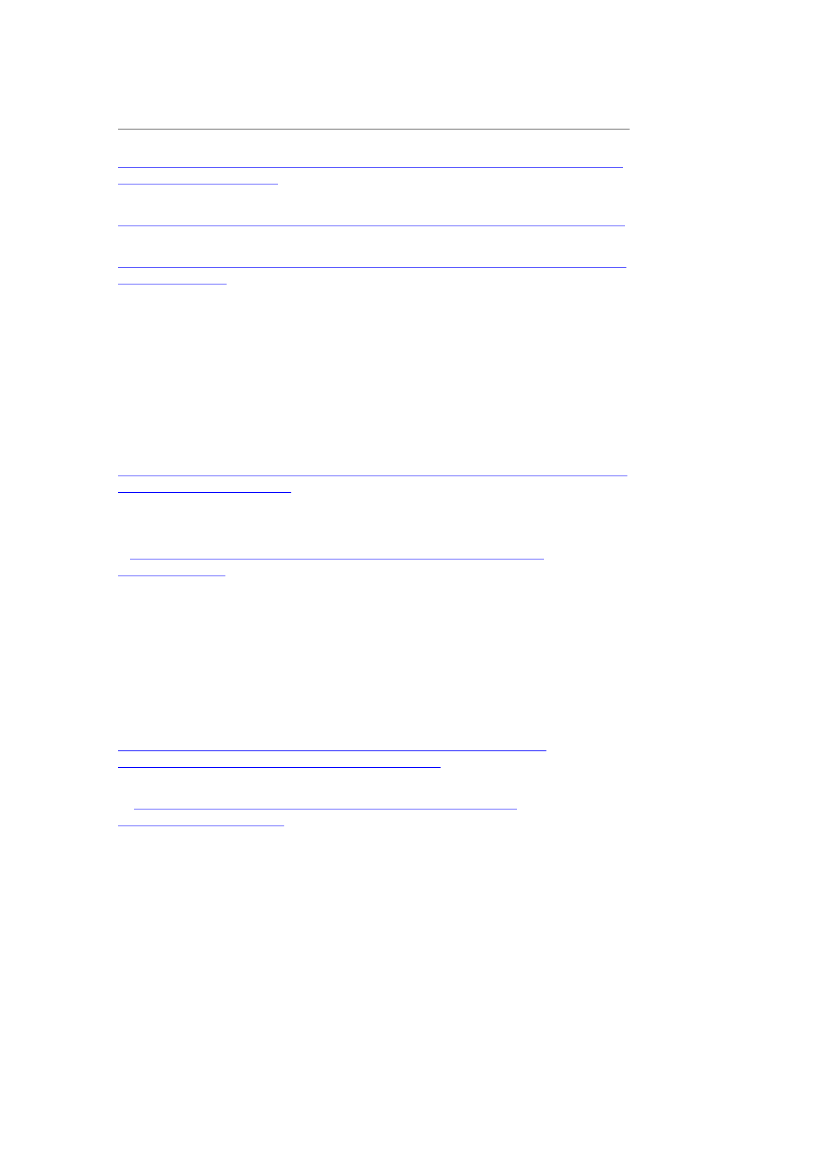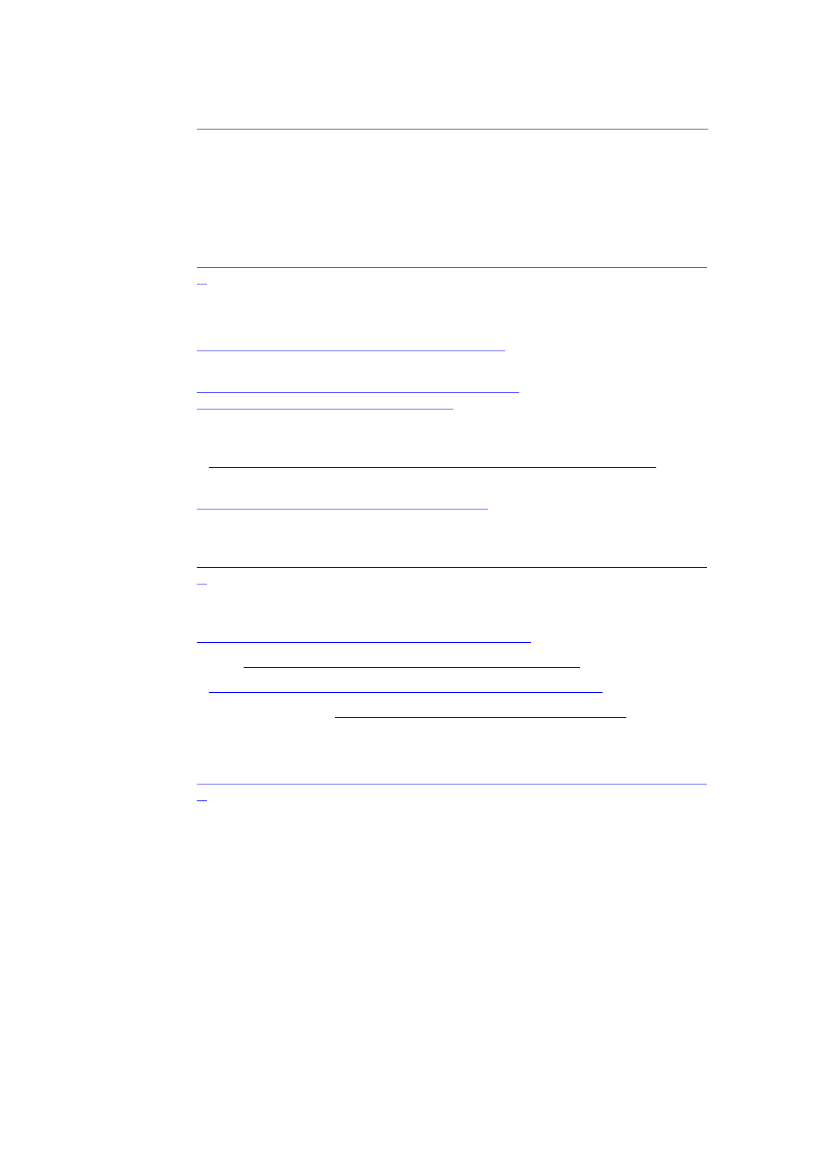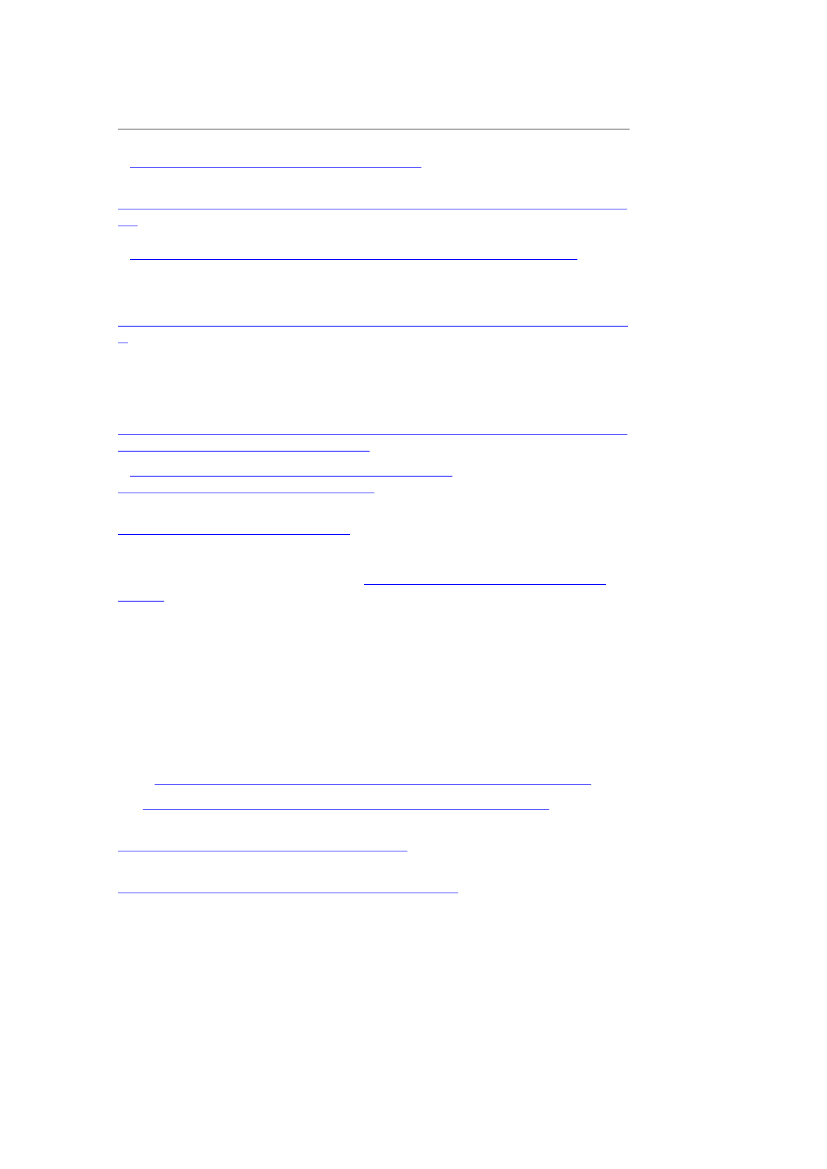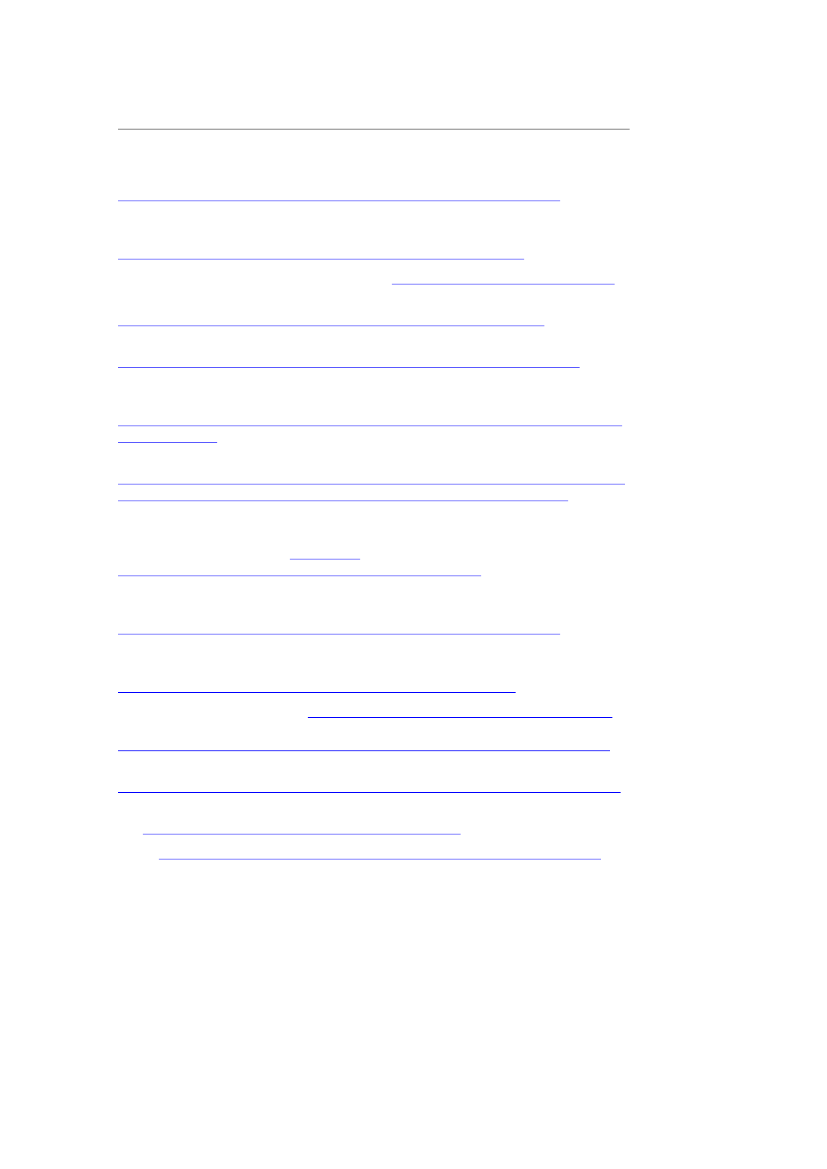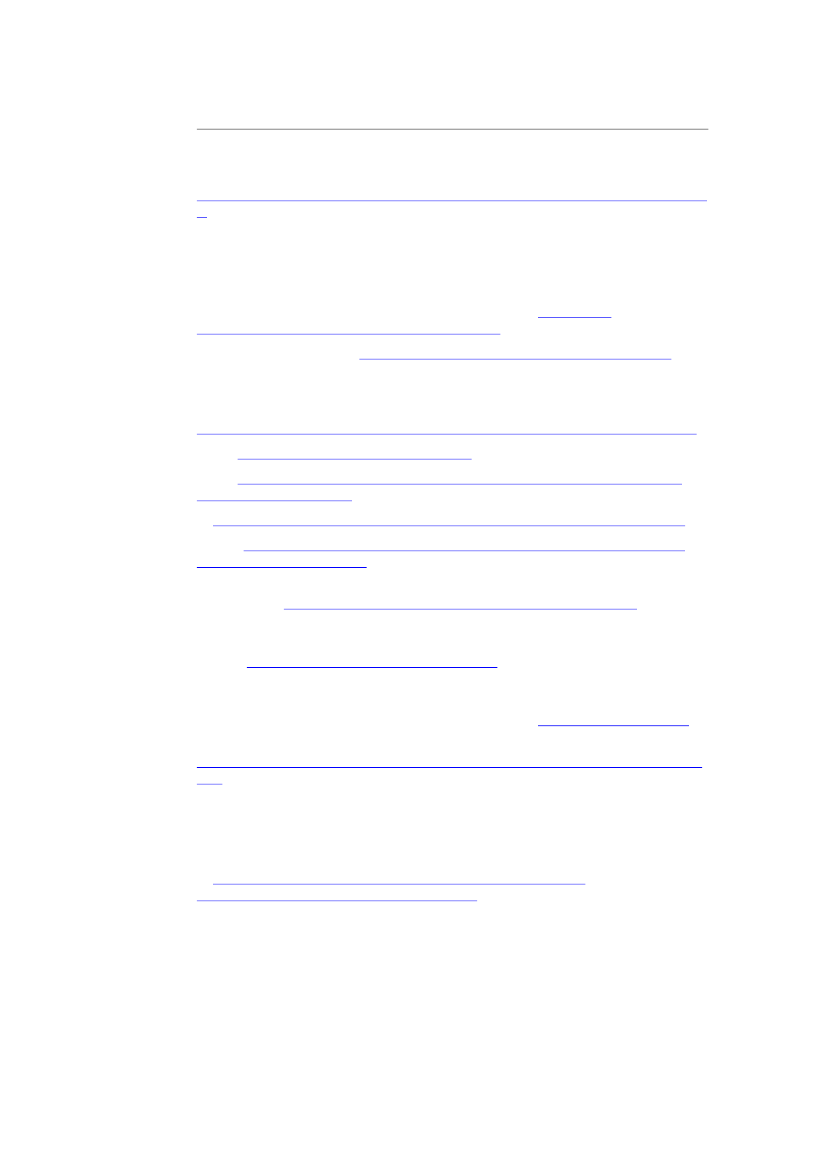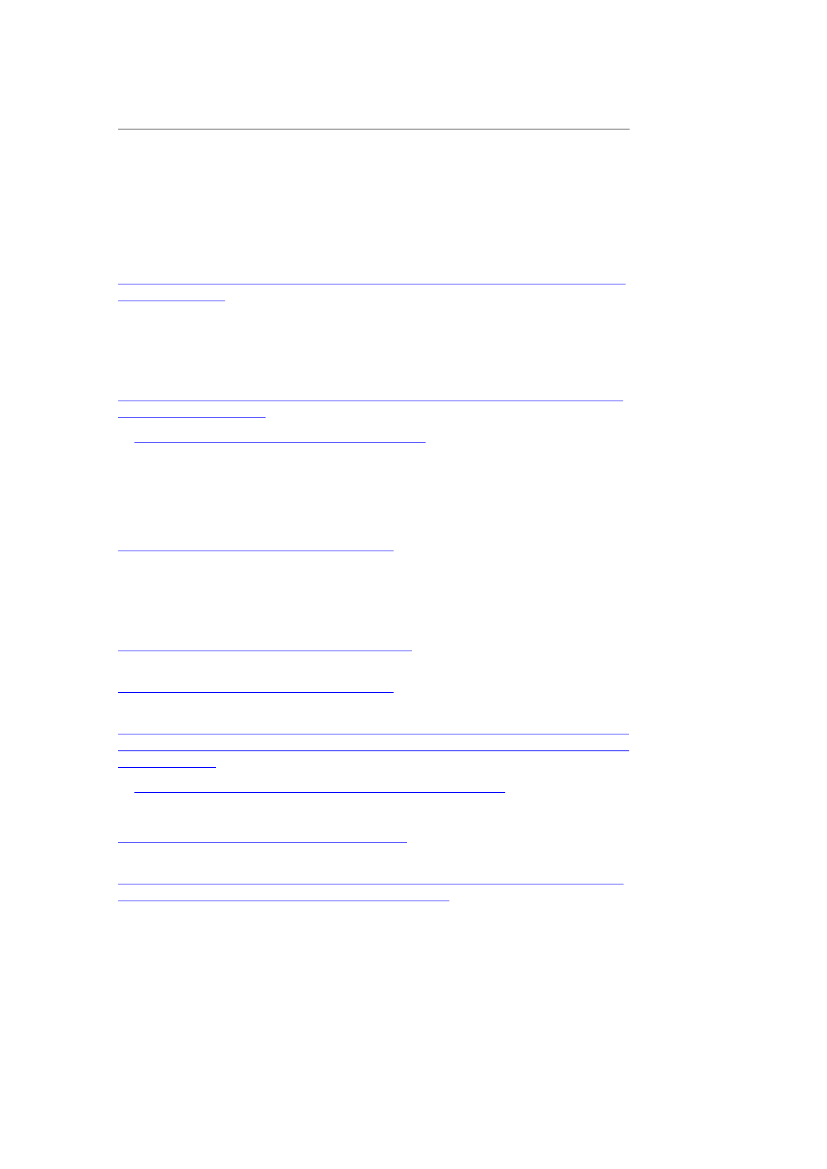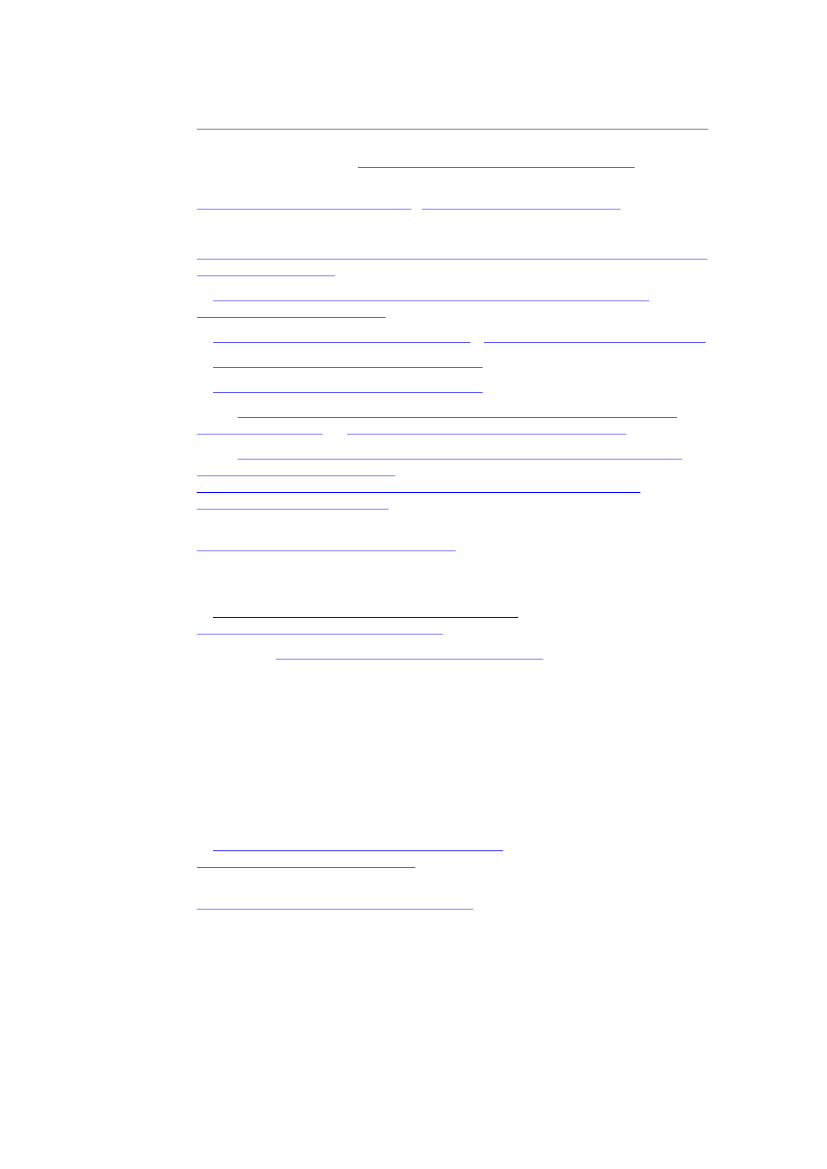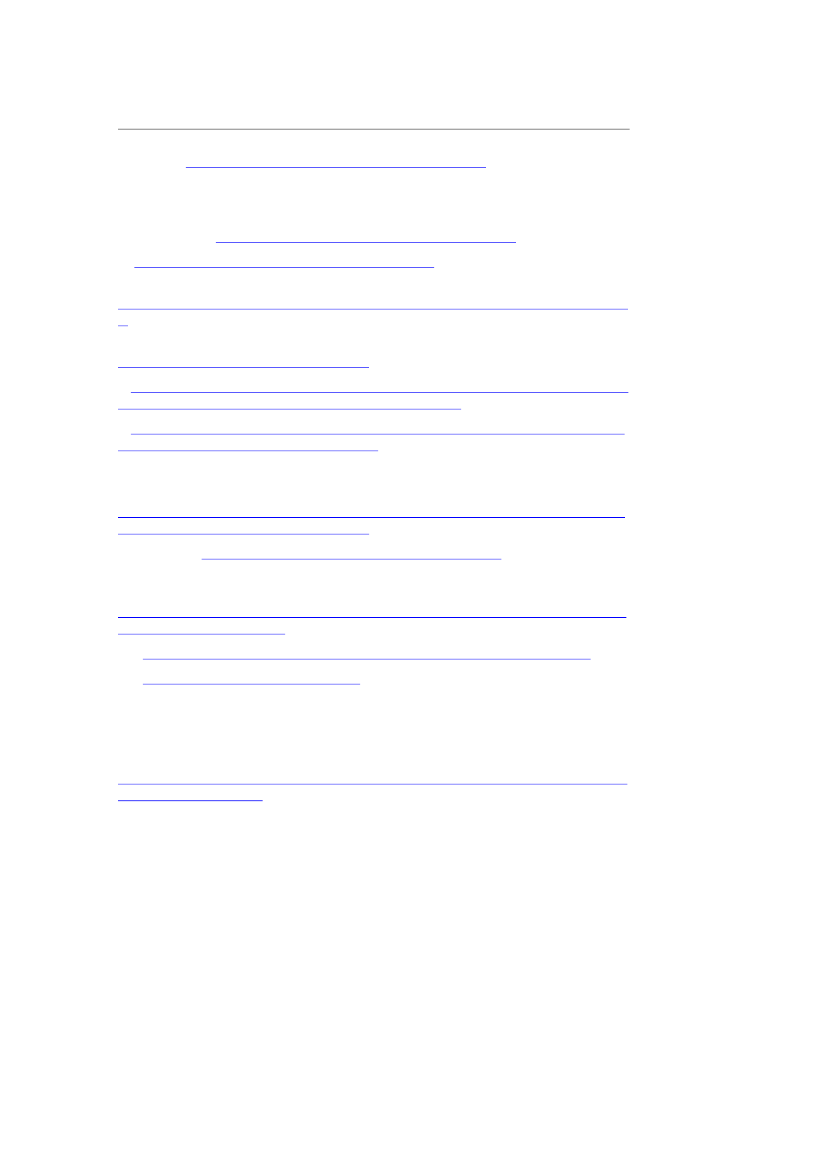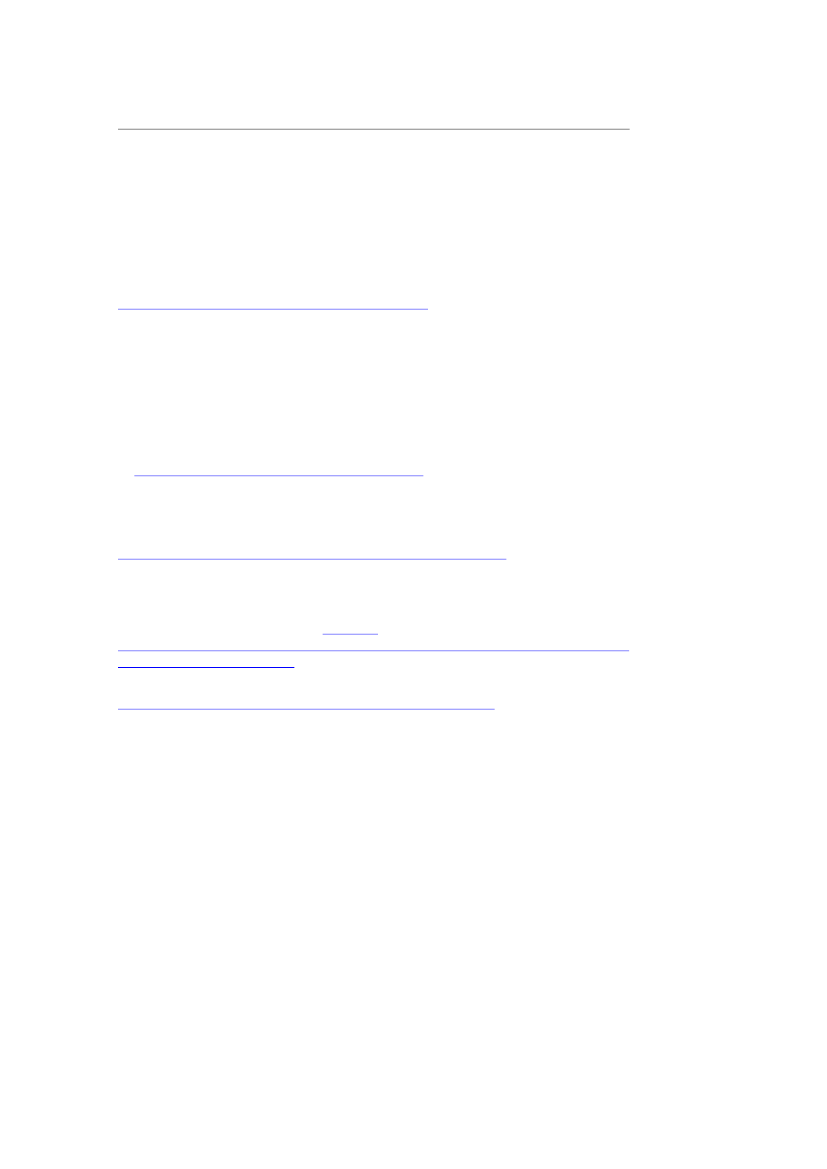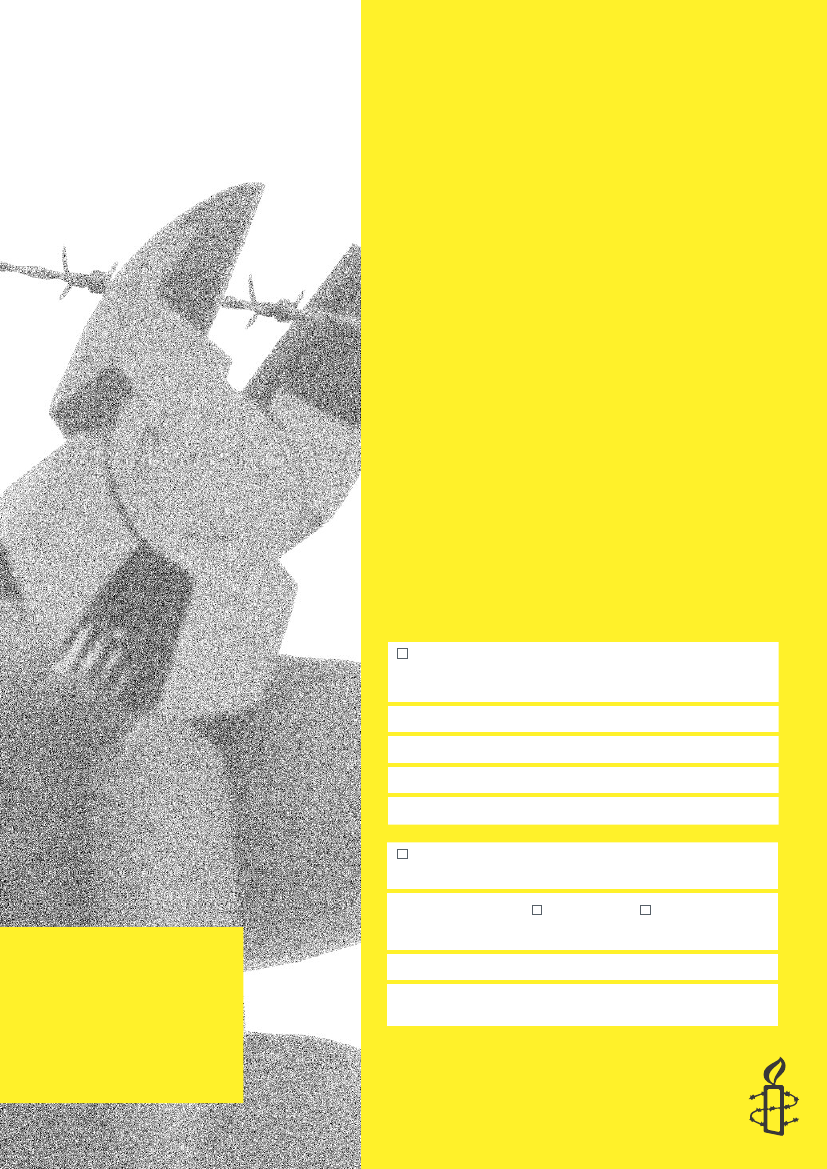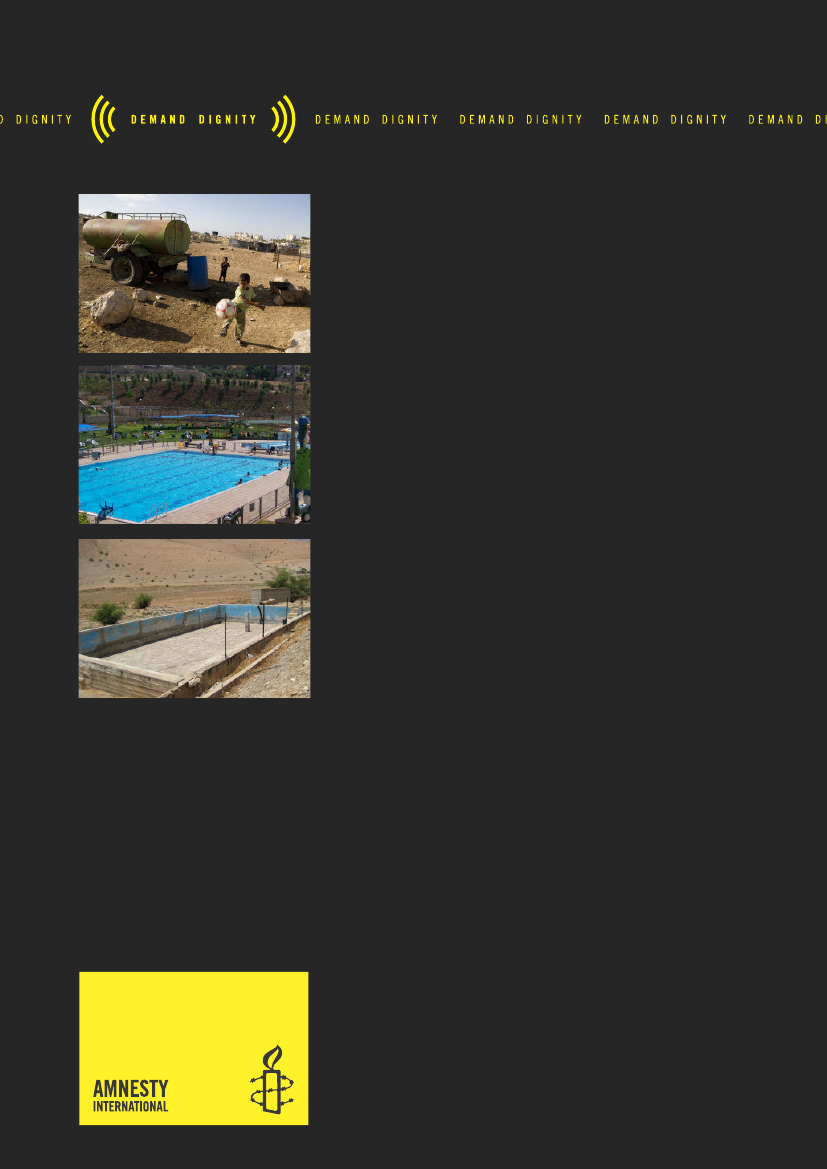Udenrigsudvalget 2009-10, Det Udenrigspolitiske Nævn 2009-10
URU Alm.del Bilag 25, UPN Alm.del Bilag 5
Offentligt
TROUBLED WATERS –PALESTINIANSDENIED FAIR ACCESSTO WATERISRAEL-OCCUPIED PALESTINIAN TERRITORIESWATER IS A HUMAN RIGHT
Amnesty International is a global movement of 2.2 million people in more than150 countries and territories who campaign to end grave abuses of human rights.Our vision is for every person to enjoy all the rights enshrined in the UniversalDeclaration of Human Rights and other international human rights standards.We are independent of any government, political ideology, economic interestor religion – funded mainly by our membership and public donations.
Amnesty International PublicationsFirst published in 2009 byAmnesty International PublicationsInternational SecretariatPeter Benenson House1 Easton StreetLondon WC1X 0DWUnited Kingdomwww.amnesty.org� Amnesty International Publications 2009Index: MDE 15/027/2009Original language: EnglishPrinted by Amnesty International,International Secretariat, United KingdomAll rights reserved. This publication is copyright, but maybe reproduced by any method without fee for advocacy,campaigning and teaching purposes, but not for resale.The copyright holders request that all such use beregistered with them for impact assessment purposes.For copying in any other circumstances, or for re-use inother publications, or for translation or adaptation, priorwritten permission must be obtained from the publishers,and a fee may be payable.
Cover photo:A Palestinian girl takes a rest while collecting drinkingwater in Gaza.� Iyad El Baba-UNICEF-oPtBack cover from top:A water tanker in the West Bank; Palestinians in the arearely on such tankers as their homes have no running water.� Keren Manor/Activestills.orgIsraeli settlers enjoy the swimming pool in the MaalehAdumim settlement, unlawfully established in the WestBank in violation of international law, while nearbyPalestinian communities struggle to access even minimalquantities of water for their basic needs.� Angela Godfrey-GoldsteinA water reservoir stands empty in Jiftlik, a Palestinianvillage in the West Bank.� Amnesty International
CONTENTSINTRODUCTION ...........................................................................................................3HISTORICAL BACKGROUND .........................................................................................6WATER RESOURCES IN ISRAEL/OPT.............................................................................8Groundwater Resources ..............................................................................................8Surface Water Resources ............................................................................................8UNEQUAL ACCESS TO WATER ......................................................................................9The West Bank: Israeli over-exploitation of shared resources ..........................................9Gaza: unsafe water supplies......................................................................................10ISRAELI MILITARY ORDERS .......................................................................................11OSLO ACCORDS: INSTITUTIONALIZING ISRAELI CONTROL OF RESOURCES .................17Inequality in access to water resources codified ..........................................................20Israeli Claims: Maintaining the status quo ..................................................................21POLICIES OF DENIAL .................................................................................................23THE WATER CRISIS IN GAZA ......................................................................................25Dwindling resources .................................................................................................26THE JOINT WATER COMMITTEE (JWC) – A PRETENCE OF COOPERATION ..................28MILITARY PERMIT REGIME HINDERING WATER PROJECTS ......................................29RESTRICTING ACCESS TO WATER AS A MEANS OF EXPULSION ...................................36Destruction of water cisterns – Vulnerable communities targeted ..................................36The Southern Hebron Hills .......................................................................................38Confiscation of water tankers in the Jordan Valley .......................................................40Destruction of agricultural water facilities...................................................................43Unlawful Israeli settlements connected to the water network ........................................45THE FENCE/WALL - BARRING ACCESS TO WATER .......................................................46Water-rich land inaccessible .....................................................................................47Bearing the cost – solving the problems created by the fence/wall.................................51MOVEMENT RESTRICTIONS AFFECTING ACCESS TO WATER ........................................52WATER INFRASTRUCTURE DESTROYED IN MILITARY ATTACKS ...................................56Damage to water facilities in Gaza during Operation “Cast Lead” ..................................58Damage to water facilities during Israeli military campaigns .........................................59Impact on Health.....................................................................................................60ISRAELI SETTLERS’ ATTACKS ON WATER FACILITIES .................................................62PA/PWA FAILURES AND MISMANAGEMENT ................................................................65SEWAGE DISPOSAL MALPRACTICE – ENDANGERING WATER RESOURCES ...................67Failure to protect the water supply in the OPT: Israel...................................................68Failure to protect the water supply in the OPT: PA/PWA...............................................71THE ROLE OF INTERNATIONAL DONORS ....................................................................73INTERNATIONAL LAW: THE RIGHT TO ACCESS TO WATER...........................................75International Human Rights Law ...............................................................................76International Humanitarian Law ................................................................................80Applicability of international law in the OPT ...............................................................81International law and the use of transboundary groundwater resources ..........................82CONCLUSION and RECOMMENDATIONS .....................................................................85GLOSSARY.................................................................................................................89ENDNOTES ................................................................................................................90
West Bank, includingEast Jerusalem, occupiedby Israel since June19675,600km� total area: about130km north-south and65km east-west200+ unlawful Israelsettlements and “outposts”550+ Israeli militarycheckpoints, blockades andobstacles709km-fence/wall, 80 percent of it on Palestinianland inside the West Bank
Israel/OPT – Troubled WatersPalestinians denied fair access to water
1
“Water is life; without water we can’t live; not us,not the animals, or the plants.”“Water is life; without water we can’t live; not us, not the animals, or the plants. Before we had somewater, but after the army destroyed everything we have to bring water from far away; it’s verydifficult and expensive. They make our life very difficult, to make us leave. The soldiers firstdestroyed our homes and the shelters with our flocks, uprooted all our trees, and then they wreckedour water cisterns. These were old water cisterns, from the time of our ancestors. Isn’t this a crime?Water is precious. We struggle every day because we don’t have water.”Fatima al-Nawajah, a resident of Susya, a Palestinian village in the South Hebron Hills, to Amnesty International, April 2008.A Palestinian woman draws waterfrom a cistern in Susya. � ShabtaiGold (IRIN)
In Susya, most of therain-harvesting watercisterns which thevillagers used to collectand store water for useduring the dry seasonwere demolished by theIsraeli army in 1999 and2001, along with theancient caves and othershelters that were thevillagers’ homes. InNovember 1999, theIsraeli army sealed the caves to prevent their continued use, destroyed other homes and thewater cisterns, and forcibly expelled the villagers from the area. In March 2000, however, thecave dwellers obtained a temporary injunction from the Israeli Supreme Court allowing themto return and preventing their further expulsion by the Israeli army pending the court’s finaldecision in the matter, which has yet to be reached. Since then, the villagers have been ableto remain in the area but under threat of future expulsion and with hardly any water supply.The increasing restrictions imposed by the Israeli army on the Palestinian villagers’ access towater and the constant threat of demolition of their homes and destruction of their propertyhave led more than half of the villagers to leave the area.On 3 July 2001, the Israeli army destroyed dozens of homes and water facilities in Susya andseveral other Palestinian villages nearby.1The army smashed the villagers’ rainwaterharvesting cisterns, some of them centuries old, with bulldozers and filled them with graveland cement to prevent their repair. The soldiers also smashed water heating solar panels that
Index: MDE 15/027/2009
Amnesty International October 2009
2
Israel/OPT – Troubled WatersPalestinians denied fair access to water
had been provided to the villagers by a non-governmental organization. Some water cisternswere left undestroyed but they, together with the tents and shacks that now serve as thevillagers’ homes, and even the one toilet which they have built, all have demolition orderspending.
Susya toilet under demolition order by the Israeli army � AI
The official reason given by the Israeli authorities for the destruction was that the structureslacked building permits – permits which the Israeli army systematically refuses to grant toPalestinians in the area. The aim, clearly, was to expel the Palestinian villagers from the areain order to make way for the expansion of the nearby Israeli settlement of Sussia (establishedin 1983). The expansion of the settlement in the 1990s was accompanied by increasedharassment of Palestinian villagers by Israeli settlers and efforts by the army to expel thePalestinian cave dwellers and other inhabitants of the villages in the South Hebron Hills, whoare among the most disempowered of Palestinian communities.In September 2008 the Israeli army informed the remaining villagers that a military orderhad been issued to declare 150 dunums (15 hectares) of land near the village a “closedmilitary area”, thereby denying the villagers access to the 13 rainwater harvesting cisternslocated there and making their water shortage worse still.Meanwhile, in the nearby Israeli settlement of Sussia, whose very existence is unlawful underinternational law, the Israeli settlers have ample water supplies. They have a swimming pooland their lush irrigated vineyards, herb farms and lawns – verdant even at the height of thedry season – stand in stark contrast to the parched and arid Palestinian villages on theirdoorstep.
Index: MDE 15/027/2009
Amnesty International October 2009
Israel/OPT – Troubled WatersPalestinians denied fair access to water
3
INTRODUCTIONLack of access to adequate, safe, and clean water has been a longstanding problem for thePalestinian population of the Occupied Palestinian Territories (OPT).2Though exacerbated inrecent years by the impact of drought-induced water scarcity, the problem arises principallybecause of Israeli water policies and practices which discriminate against the Palestinianpopulation of the OPT. This discrimination has resulted in widespread violations of the rightto an adequate standard of living, which includes the human rights to water, to adequatefood and housing, and the right to work and to health of the Palestinian population.The inequality in access to water between Israelis and Palestinians is striking. Palestinianconsumption in the OPT is about 70 litres a day per person – well below the 100 litres percapita daily recommended by the World Health Organization (WHO) – whereas Israeli dailyper capita consumption, at about 300 litres, is about four times as much. In some ruralcommunities Palestinians survive on far less than even the average 70 litres, in some casesbarely 20 litres per day, the minimum amount recommended by the WHO for emergencysituations response.3Access to water resources by Palestinians in the OPT is controlled by Israel and the amountof water available to Palestinians is restricted to a level which does not meet their needs anddoes not constitute a fair and equitable share of the shared water resources. Israel uses morethan 80 per cent of the water from the Mountain Aquifer, the only source of undergroundwater in the OPT, as well as all of the surface water available from the Jordan River of whichPalestinians are denied any share.The stark reality of this inequitable system is that, today, more than 40 years after Israeloccupied the West Bank, some 180,000 – 200,000 Palestinians living in rural communitiesthere have no access to running water and even in towns and villages which are connected tothe water network, the taps often run dry. Water rationing is common, especially but not onlyin the summer months, with residents of different neighbourhoods and villages receivingpiped water only one day every week or every few weeks. Consequently, many Palestinianshave no choice but to purchase additional supplies from mobile water tankers which deliverwater at a much higher price and of often dubious quality. As unemployment and povertyhave increased in recent years and disposable income has fallen, Palestinian families in theOPT must spend an increasingly high percentage of their income – as much as a quarter ormore in some cases – on water.In the Gaza Strip, the only water resource, the southern end of the Coastal Aquifer, isinsufficient for the needs of the population but Israel does not allow the transfer of waterfrom the West Bank to Gaza. The aquifer has been depleted and contaminated by over-extraction and by sewage and seawater infiltration, and 90-95 per cent of its water iscontaminated and unfit for human consumption. Waterborne diseases are common.Stringent restrictions imposed in recent years by Israel on the entry into Gaza of material andequipment necessary for the development and repair of infrastructure have caused furtherdeterioration of the water and sanitation situation in Gaza, which has reached crisis point.
Index: MDE 15/027/2009
Amnesty International October 2009
4
Israel/OPT – Troubled WatersPalestinians denied fair access to water
Water shortages and poor sanitation services in the OPT affect all sectors of the Palestinianpopulation and especially the poorest and most vulnerable communities, those living inisolated rural areas and in overcrowded refugee camps.While Palestinians throughout the OPT are being denied access to an equitable share of theshared water resources and are increasingly affected by the lack of adequate water supplies,Israeli settlers face no such challenges - as indicated by their intensive-irrigation farms, lushgardens and swimming pools.4The 450,000 Israeli settlers, who live in the West Bank inviolation of international law, use as much or more water than the Palestinian population ofsome 2.3 million.5The restrictions imposed by Israel on Palestinians’ access to water supplies in the OPT aremanifested in multiple ways: control of water resources and land, and restrictions on themovement of people and goods make it excessively difficult for Palestinians to access theirwater resources and to develop and maintain the water and sanitation infrastructure.Furthermore, a complex system of permits which the Palestinians must obtain from theIsraeli army and other authorities in order to carry out water-related projects in the OPT hasdelayed and rendered more costly, and in many cases prevented, the implementation ofmuch needed water and sanitation projects.During more than four decades of occupation of the Palestinian territories Israel has over-exploited Palestinian water resources, neglected the water and sanitation infrastructure in theOPT, and used the OPT as a dumping ground for its waste – causing damage to thegroundwater resources and the environment. Urgent measures are now needed to ensure thatadequate water supplies are made available today and in the future, and to prevent furtherdamage to the water resources and the environment.Israeli policies and practices in the OPT, notably the unlawful destruction and appropriationof property, and the imposition of restrictions and other measures which deny thePalestinians the right to water in the OPT, violate Israel’s obligations under both humanrights and humanitarian law.Due to Israel’s failure to fulfil its obligations, as the occupying power, the burden of dealingwith these challenges has fallen to international donors and, since its establishment in themid 1990s, to the Palestinian Authority (PA), the Palestinian Water Authority (PWA),6andother local service providers, all of whom depend on international donors for funds. Yet, theIsraeli authorities continue to obstruct Palestinian and international efforts to improve accessto water in the OPT.In the face of water shortages and amid deepening poverty in recent years some Palestinianshave resorted to drilling unlicensed wells, while others have connected to the water networkillegally, and many have stopped paying their water bills. These practices have furthercompounded the problem by undermining the economic viability and the authority of thePWA, which has proved to be unable or unwilling to stop such practices.The restrictions imposed by Israel on access to and development of water resources forPalestinians have been accompanied by other factors that have hindered the efficient deliveryof many urgently needed water and sanitation projects in the OPT. These include the PWA’s
Index: MDE 15/027/2009
Amnesty International October 2009
Israel/OPT – Troubled WatersPalestinians denied fair access to water
5
near-total dependence on international donors for funds, donors’ choices and priorities, andpoor coordination among donors.7Adding to this, the PA and PWA have been beset byinternal divisions compounded by weak and fragmented management structures, lack ofexpertise and of political will, and allegations of mismanagement and corruption.This report examines the main patterns and trends affecting access to water for Palestiniansin the OPT, and analyses how these are impacting severely on the population’s rights, asprotected under international human rights and humanitarian law, and which are necessaryfor the Palestinians to live in dignity.
NOT EVEN A DROPOn 10 March 2008, Fa’iq Ahmad Sbeih received a visit from an Israeli army patrol at his farm in al-Farisya, afew km north of Jiftlik, in the Jordan Valley area of the West Bank. The soldiers confiscated 1,500 metres ofrubber hose which brought water to his farm from a spring on a hill above his land, and crushed the smallmetal pipe which was connected to the hose. The confiscation order delivered by the army stated that thehose was confiscated “due to lack of permit”. The army considers the spring water as “state property”In the past, local farmers had tried to build a water cistern to collect water from the spring and to harvest therain water but the army prevented them, because they did not possess, and could not obtain from the army, apermit to do so. When an Amnesty International delegate visited the farm on 11 March 2008 Fa’iq Sbeih wasbeside himself with worry: “Thisis my family’s livelihood. We work day and night and we need water; and theweather is getting hotter every day. Already the situation is difficult this year because we have had so littlerain; you can see how little water there is in the stream and we only took a bit of it. I can’t buy another pipe;and if I do the army may come and take it again.”The army subsequently returned the rubber hose to Fa’iq Sbeih, though it was damaged and no longer usable,and reiterated the ban on him using the water from the spring. With the onset of the hot season he tried tokeep some of his crops alive by buying water from other areas, delivered by tanker, but he still lost most of thecrop.8Without access to water from the spring Palestinian farmers like Fa’iq Sbeih have no option but to travelseveral km to buy small quantities of water that they then transport to their orchards by tanker. This is themost expensive way to obtain water, the more so because the restrictions imposed by the Israeli army requirethe water tankers to take long detours and circuitous routes to make their deliveries. The unlawful Israelisettlements which surround al-Farisiya face no such problems. Their residents have free access to the waterfrom the spring which Fa’iq Sbeih and his family are not permitted to use, and which forms a small streamthat flows down towards the Israeli settlements. As well, they have ready access to an abundant supply ofwater from nearby wells to which Fa’iq Sbeith and other Palestinian farmers have no access.The nearby Israeli settlement of Shamdot Mechola advertises on its website: “Breathtakingtours to Amaryllisbulbs hot houses which are harvested, packed and shipped to Europe and USA and potted in time to bloomduring the winter holiday season. Short tours of our “Hi-tec” dairy farm, vineyards and orchards. Tours offarms in the Jordan Valley who specialize in crops of vegetables, fruits, flowers and spices for export in hot dryclimate.”9
Index: MDE 15/027/2009
Amnesty International October 2009
6
Israel/OPT – Troubled WatersPalestinians denied fair access to water
Sprinklers in Israeli settlement farms in the Jordan Valley, West Bank � AI
According to one international water expert, commenting on the discriminatory use of waterby Israeli settlers in the OPT: “Itis easy to make the desert bloom by using someone else’swater and by denying them access to their fair share of water.”
HISTORICAL BACKGROUNDBetween the two world wars Britain ruled Palestine under a League of Nations mandate,which ended with a UN decision in November 1947 to partition the territory of MandatePalestine into two states, Israel and Palestine – 53 and 47 percent of the territory,respectively. The State of Israel was established in May 1948 amid Arab protests and a warbroke out between Arab and Israeli forces from which Israel emerged victorious. More than800,000 Palestinians were either expelled or fled from Israel and became refugees in theGaza Strip, the West Bank and neighbouring countries. The war ended in 1949, with Israelhaving conquered additional territory and the State of Israel having been enlarged tocomprise 78 percent of Mandate Palestine. The remaining 22 percent, the West Bank andthe Gaza Strip, remained under the control of Jordan and Egypt, respectively. Hostilitiesbetween Israel and Egypt, Syria and Jordan in June 1967 ended in Israel’s occupation of theWest Bank (including East Jerusalem, which Israel later annexed in violation of international
Index: MDE 15/027/2009
Amnesty International October 2009
Israel/OPT – Troubled WatersPalestinians denied fair access to water
7
law) and the Gaza Strip.10These areas became known as the Occupied Palestinian Territories(OPT).Some 4,000,000 Palestinians, more than 1,500,000 of them refugees, currently live in theOPT under Israeli military occupation - some 1.5 million in Gaza and some 2.5 million in theWest Bank - including more than 200,000 who live in East Jerusalem.11Negotiations between Israel and the Palestine Liberation Organization (PLO) in the early1990s led to the Oslo Accords and to the establishment of the Palestinian Authority (PA) in1994, with jurisdiction in parts of the West Bank and the Gaza Strip. Negotiations on apermanent status agreement on Jerusalem, settlements (the Israeli colonies unlawfullyestablished in the OPT), the delineation of borders, allocation of water resources, andPalestinian refugees were deferred, but were to be concluded by 1999. However, by 2000no progress had been achieved on any of these issues and Israel was continuing to buildunlawful settlements and so-called “bypass” roads in the OPT at an unprecedented pace.12A Palestinian uprising (intifada) against the continued Israeli occupation broke out inSeptember 2000. Since then, more than 6,000 Palestinians and more than 1,100 Israelis,most of them unarmed civilians, have been killed in violent attacks and confrontations. Tensof thousands of Palestinians have been arrested by the Israeli army; currently, some 6,500are detained or serving sentences in Israeli prisons and the Israeli army has destroyed morethan 6,000 Palestinian homes as well as large areas of agricultural land and otherPalestinian property throughout the OPT.In September 2005 Israel withdrew its settlers and troops from Gaza, but retained control ofGaza’s land borders, air space and territorial waters, and since then has kept Gaza under anincreasingly stringent blockade, punctuated by periodic outbreaks of armed confrontations.Stringent restrictions imposed by Israel on the movement of Palestinians within the OPT havestifled the Palestinian economy and caused high unemployment and poverty. MostPalestinians in the OPT now depend on international aid.Israel has continued to seize large areas of Palestinian land and to build unlawful settlementsand “by-pass” roads and other infrastructure to support them. Currently more than 450,000Israeli settlers live in the OPT, about half of them in East JerusalemSince 2000 most of the provisions of the Oslo Accords have become irrelevant and the PA’sability to function has been sharply curtailed by Israeli restrictions. Inter-factional tensionsbetween the two main Palestinian political parties, Fatah and Hamas, increased after Hamaswon the Palestinian parliamentary election in 2006 and led to severe armed clashes in whichhundreds of people were killed in 2007 in the Gaza Strip. Since then Hamas has maintaineda de-facto administration in the Gaza Strip and a PA caretaker government administers partsof the West Bank, while Israel retains overall control over both areas.
Index: MDE 15/027/2009
Amnesty International October 2009
8
Israel/OPT – Troubled WatersPalestinians denied fair access to water
WATER RESOURCES IN ISRAEL/OPTGROUNDWATER RESOURCESGroundwater is water that is located beneath the ground surface in soil pore spaces and in the fractures oflithologic formations. The groundwater bearing strata, a unit of rock layer or an unconsolidated deposit iscalled an aquifer when it can yield a usable quantity of water. The depth at which soil and rock pore spaces orfractures and voids in rock become completely saturated with water is called the water table. Groundwater isusually recharged from rain and eventually flows to the surface naturally; natural discharge often occurs atsprings and seeps. An aquifer is an underground layer of water-bearing permeable rock (limestone, dolomite)or unconsolidated materials (gravel, sand, silt, or clay) from which groundwater can be usefully extractedusing a water well.13The Mountain Aquiferis a shared Israeli-Palestinian groundwater resource, lying under bothIsrael and West Bank. It is the sole remaining water resource for the Palestinians and one ofthe most important groundwater resources for Israel. It is replenished mostly in the WestBank by the infiltration of rainfall and snowfall and flows northwards and westward towardsthe territory of Israel and towards the Jordan River in the east. It is actually composed ofthree aquifers (or basins) – the Western, North-Eastern and Eastern aquifers – with a totalaverage yield of 679 to 734 MCM/Y (as detailed below). The figure of 734 MCM/Y isaccording to the Hydrological Service of Israel (HSI), the most authoritative source on thematter, whereas the estimate of 679 MCM/Y is that used by the Israeli authorities to decidethe yearly quantity of water allocated to the Palestinians under the Oslo Accords.14- Western Aquifer:- North Eastern Aquifer:427 MCM/Y (HSI)142 MCM/Y (HSI)362 MCM/Y (Oslo Accords)145 MCM/Y (Oslo Accords)
- Eastern Aquifer:165 MCM/Y (HSI)172 MCM/Y (Oslo Accords)(Much of the water from the Eastern Aquifer is brackish/saline)15The Coastal Aquiferis located under the coastal plain of Israel and the Gaza Strip. Its yearlysustainable yield is estimated at up to 450 MCM in Israel16and a mere 55 MCM/Y in Gaza.In Gazathe aquifer polluted due to over-extraction and sewage infiltration, and 90-95 percent of the water it supplies is unfit for drinking.Additional groundwater resources in Israelinclude the Western Galilee and Carmel Aquifersin the north and the Negev-Aravah Aquifer in the south. There is no reliable figure for theyield of these aquifers.
SURFACE WATER RESOURCESTheJordan Riveris the most important shared surface water resource for Israel and the WestBank. It supplies up to 650 MCM/Y of water to Israel17and none to the Palestinians (seebelow).
Index: MDE 15/027/2009
Amnesty International October 2009
Israel/OPT – Troubled WatersPalestinians denied fair access to water
9
UNEQUAL ACCESS TO WATERTHE WEST BANK: ISRAELI OVER-EXPLOITATION OF SHARED RESOURCESIsrael’s water consumption stands at some 2,000 to 2,200 MCM/Y for a population of 7million (some 1,500 MCM is fresh water, with the remainder composed of desalinatedseawater and treated wastewater).18Most of Israel’s fresh water supplies are drawn from theshared groundwater and common surface water resources – more than 400 MCM/Y from theMountain Aquifer and up to 650 MCM/Y from the diverted Jordan River.19Jordan RiverSince Israel occupied the West Bank in 1967, it has denied its Palestinian inhabitantsaccess to the water resources of Jordan River, preventing them from physically accessing theriver banks and diverting the river flow upstream into Lake Kinneret/Tiberias/Sea of Galilee,which supplies up to 700 MCM/Y of water to Israel. Jordan also diverts the flow of theJordan River’s tributaries within its territory, as do Syria and Lebanon further upstream. As aconsequence, compared to 1953, when a UN report estimated the yearly flow of the JordanRiver through the West Bank as 1,250 MCM, this flow has now been reduced to a trickle, ofhighly saline water heavily contaminated by untreated sewage.20As well as depriving thePalestinians of a crucial source of water, the drying up of the Jordan River has had adisastrous impact on the Dead Sea, which has seen the fastest drop in its water level to anunprecedented low.21Mountain AquiferAs Palestinians in the West Bank have no access to the Jordan River, the Mountain Aquifer istheir only remaining source of water. Israel, on the other hand, has two other main waterresources (Lake Kinneret/Tiberias/Sea of Galilee and the Coastal Aquifer).Even so, Israel limits the amount of water annually available to Palestinians from theMountain Aquifer to no more than 20 per cent, while it has continued to consistently over-extract water for its own usage far in excess of the aquifer’s yearly sustainable yield.Moreover, much of Israel’s over-extraction is from the Western Aquifer, which provides boththe largest quantity and the best quality of all the shared groundwater resources in Israel-OPT.According to the Israeli Ministry of Environmental Protection: “Thisaquifer supplies about417 MCM per year, a quarter of the total national production, although the average multi-annual natural replenishment rate is estimated at about 360 MCM.”22The World Bank put Israel’s extraction from the Western Aquifer in 1999 at 591.6 MCM -that is, 174.6 MCM (or 229.6 MCM according to the Oslo Accords figures) in excess of theaquifer’s yearly sustainable yield.23Such sustained over-extraction has reduced the aquifer’s current yield and future reservesand has caused potentially serious damage to the quality of the water supply for both Israelisand Palestinians. As the Israeli Ministry of Environmental Protection noted, “Overexploitationmay lead to a rapid rate of saline water infiltration from surrounding saline water sources.”24
Index: MDE 15/027/2009
Amnesty International October 2009
10
Israel/OPT – Troubled WatersPalestinians denied fair access to water
According to the World Bank, “Palestinianshave access to one fifth of the resources of theMountain Aquifer. Palestinians abstract about 20% of the “estimated potential” of theaquifers that underlie both the West Bank and Israel. Israel abstracts the balance, and inaddition overdraws without JWC [Joint Water Committee] approval on the “estimatedpotential” by more than 50%, up to 1.8 times its share under Oslo. Over-extraction by deepwells combined with reduced recharge has created risks for the aquifers and a decline inwater available to Palestinians through shallower wells.”25In 2007, according to the World Bank, overall Palestinian water extraction26from theMountain Aquifer in the West Bank was 113.5 MCM (down from 138.2 MCM in 1999) andaccording to PWA figures total Palestinian extraction in 2008 was 84 MCM, with thereduction due to operational problems for some wells and a drop in the level of the watertable, caused by Israeli over-extraction and low annual rainfall.27According to the Israeliauthorities, Palestinians also extract some 10 MCM/Y from unlicensed wells and obtain some3.5 MCM/Y from illegal connections to Israeli water lines in the West Bank.28To boost insufficient supplies the Palestinians must buy water from Israel – water that Israelextracts from the Mountain Aquifer and which the Palestinians should be able to extract forthemselves if Israel were to allow them a more equitable share of the aquifer. In recent yearsthe quantity of water bought by Palestinians from Israel has increased, to some 50 MCM/Y,but this is not enough to match the increase in population in the West Bank and supplies areoften reduced by Israel to the Palestinians (but not to the Israeli settlers in the OPT) duringthe hot season, when needs are greater.The total amount of water available to Palestinians from these various supplies in recentyears has been a maximum of some 170-180 MCM/Y, which reportedly fell to a mere 135MCM in 2008, for a population of 2.3 million. However, as much as a third (some 34 percent) is lost in leakages due to old and inefficient networks,29and these cannot be readilyreplaced and modernized due to the restrictions on Palestinians’ movements and otherobstacles imposed by Israel, including the requirement that permits be obtained from theIsraeli army for even small development projects. In practice, therefore, Palestinians haveaccess to an average of no more than 60-70 litres per capita per day, and some survive onmuch less even than this, as little as 10-20 litres per person per day.Even at an average of 60-70 litres per person per day, the amount of water available toPalestinians is the lowest in the region. While there has been a meagre increase in the totalamount of water available to Palestinians in the OPT during the more than 40 years of Israelioccupation, the amount available per capita is now less than in 1967 as the Palestinianpopulation has more than doubled since then.30
GAZA: UNSAFE WATER SUPPLIESThe southern end of the Coastal Aquifer is the sole source of water for the 1.5 millionPalestinian inhabitants of the Gaza Strip, but it is only one of several sources of water forIsrael. Due to the aquifer’s east to west flow, the quantity of water extracted in Gaza does notdiminish the available yield in Israel; consequently, Israel has not imposed restrictions onPalestinian extraction from the part of this aquifer which underlies Gaza. However, extractionby Israel from this aquifer in the area to the east of Gaza affects the supply available to be
Index: MDE 15/027/2009
Amnesty International October 2009
Israel/OPT – Troubled WatersPalestinians denied fair access to water
11
extracted in Gaza.31As well, most of the water from Wadi Gaza, a stream and surface watersource which originates in the Hebron mountains in the West Bank and then flows south-eastthrough Israel and into Gaza, is diverted into a dam in Israel, just before it reaches Gaza.32There are no available reliable figures for the annual flow of Wadi Gaza or for the amountcollected on the Israeliside.33The yearly sustainable yieldof the Coastal Aquifer inGaza, some 55 MCM, fallsfar short of the population’sneeds. Israel does not allowthe transfer of water fromthe Mountain Aquifer in theWest Bank to Gaza. (In anycase, such transfers wouldbe feasible only if Israelallowed the Palestinianpopulation of the West Bankaccess to a more equitableshare of the MountainAquifer, as the currentallocation is not sufficient tomeet even their own needs.)Residents filling containers of drinkingwater at a water purification plant inKhan Yunis, Gaza Strip � AI
With no other source of water available to them, Palestinians in Gaza have long resorted toover-extraction from the Coastal Aquifer, by as much as 80-100 MCM/Y – a rate equivalent totwice the aquifer’s yearly sustainable yield.34The result has been a marked, progressivedeterioration in the quality of the water supply, already contaminated by decades of sewageinfiltration into the aquifer. Today some 90-95 per cent of Gaza’s water is polluted and unfitfor human consumption.
ISRAELI MILITARY ORDERSWhen Israel occupied the West Bank and Gaza Strip in June 1967, a multilayer legal systemexisted in the OPT, MADE UP of Ottoman, British, Jordanian (in the West Bank) andEgyptian (in Gaza) laws – the legacy of the powers that had previously controlled the area.The Israeli army issued a series of Military Orders seizing control of water and land resourcesin the OPT.
Index: MDE 15/027/2009
Amnesty International October 2009
12
Israel/OPT – Troubled WatersPalestinians denied fair access to water
Military Order 92,issued on 15 August 1967, granted complete authority over all water-related issues in the OPT to the Israeli army.Military Order 158of 19 November 1967 stipulated that Palestinians could not constructany new water installation without first obtaining a permit from the Israeli army and that anywater installation or resource built without a permit would be confiscated.Military Order 291of 19 December 1968 annulled all land and water-related arrangementswhich existed prior to Israel’s occupation of the West Bank.35These and other Israeli Military Orders remain in force today in the OPT and apply only toPalestinians. They do NOT apply to Israeli settlers in the OPT, who are subject to Israelicivilian law.The Israeli army also took control of the West Bank Water Department (WBWD),36which hadbeen established by Jordan in 1966 to develop and maintain the West Bank water supplysystem. The WBWD operates some 13 wells that are located in the West Bank and aremostly controlled by Israel. The water from these wells is sold to Palestinian communitiesand to Israeli settlements.In 1982 the West Bank water infrastructure controlled by the Israeli army was handed over toMekorot, the Israeli national water company. Mekorot operates some 42 wells in the WestBank, mainly in the Jordan Valley region, which mostly supply the Israeli settlements.Mekorot sells some water to the Palestinian water utilities, but the amount that it sells isdetermined by the Israeli authorities, not by Mekorot.Under the new Israeli military regime imposed in the OPT, Palestinians could no longer drillnew wells or rehabilitate or even just repair existing ones, or carry out other any water-relatedprojects (from pipes, networks, and reservoirs to wells and springs and even rainwatercisterns), without first obtaining a permit from the Israeli army. In theory, such permits fordrilling or rehabilitating wells could be obtained after a lengthy and complicated bureaucraticprocess; in practice, most applications for such permits were rejected. Only 13 permits weregranted in the 29 years from 1967 to 1996 (when the PWA was established), but all of thesewere for projects for domestic use only and they were not sufficient to make up even for thereplacement of wells that had dried up or fallen into disrepair since 1967.37Meanwhile, Israel continued to develop its own water infrastructure, both within Israel itselfand in the OPT, reducing the yield of existing Palestinians wells and springs in the OPT, andcutting off Palestinian access to the Jordan river and the springs along the river’s bank.Israel devoted considerable resources to developing water networks and infrastructure toserve the illegal settlements which it established in the OPT, but consistently neglected thedevelopment and maintenance of the water infrastructure for the Palestinians, who wererequired to pay their taxes to the Israeli military administration but received few services inreturn. For the most part any benefits accrued to the Palestinian population were incidental.For example, some Palestinian communities were connected to water networks which servednearby Israeli settlements or military bases.The regime put in place by the Israeli army not only prevented the development of new
Index: MDE 15/027/2009
Amnesty International October 2009
Israel/OPT – Troubled WatersPalestinians denied fair access to water
13
Palestinian wells and infrastructure, but also limited the use and upkeep of existing ones. Itprevented the rehabilitation of old wells and imposed quotas on the quantity of water whichPalestinians could extract from their wells, capping the amount at the level being extracted atthe point when the well was first metered. Meters were installed in the early 1970s tomonitor pumping and to ensure Palestinian compliance with the capped allowance. Themeasures were simply imposed; there was no process of consultation with local Palestiniancommunities about their needs and how these would be met.The quotas were set at a time when the levels of extraction from many wells had temporarilydiminished due to the 1967 war and the changes it caused, including the displacement ofmany Palestinians who had fled from the West Bank at the time of the fighting and in itsaftermath. Following the war, Palestinian water use dropped drastically due to the reductionin irrigated areas from 100,000 to 57,000 dunums.38In addition, large areas of Palestinianland had been appropriated by Israel for military use and for Israeli settlements, and hadbeen made inaccessible to Palestinians; and many Palestinians who had previously beenfarmers in the West Bank were by then working in Israel. As well, many wells had fallen intodisrepair or had dried up, including as a result of the drilling of Israeli deep wells.In addition to those mentioned above, a plethora of military orders issued by the Israeli armywere also aimed at, or had the effect of, preventing or restricting Palestinian access to waterand land in the OPT. For example,Military Order No. 1039of 5 January 1983 (ConcerningPlanting Fruits and Vegetables - broadening the scope of Military Order No 1015 of 27August 1982 to include vegetable as well as fruits),stipulates that:“Inaccordance with the authority vested in me, and in my capacity as commander of theIsrael Defense Forces in the region and because I believe that this Order is necessary for thewelfare of the residents, and with the intention of preserving the water resources[AmnestyInternational’s emphasis] and the agricultural product of this region for the generalbenefit…It is prohibited to develop any vegetables in the Jericho district except afterobtaining a written license from the relevant authority according to the conditions the latterdemands (Article 2 A).”Article 10 of the original order, Military Order No 1015, stipulates: “Anyperson contraveningthese provisions is punishable by one year’s imprisonment, or a fine of up to 15,000 NIS[about US$5,000] or both, and an additional fine of 500 NIS[about US$160] for each daythe contravention continues. If the person has been ordered by a court to uproot the cropsplanted without a permit, the relevant authority may uproot the crops and impose on theaccused all the cost of the uprooting of the crops.”For four decades, Israeli military orders issued ostensibly to “protect” nature resources andreserves, including water resources, have had a crippling impact on Palestinian agriculturalactivities throughout the West Bank, while Israeli settlers, during the same period, have beengiven virtually unlimited access to water supplies to develop and irrigate the large farmswhich help to support unlawful Israeli settlements.39
Index: MDE 15/027/2009
Amnesty International October 2009
14
Israel/OPT – Troubled WatersPalestinians denied fair access to water
HOPES AND LIVELIHOOD DESTROYEDOn 11 March 2008,an AmnestyInternationaldelegate witnessedIsraeli soldiersdestroy a Palestinianfarm in the outskirtsof Jiftlik, in theJordan Valley area ofthe West Bank.Nearby, Israelisettlers have largefarms cultivatedwith verdantirrigated crops.
Mahmud Mat'ab Da'ish’s vegetable crops and irrigation network, bring uprooted by an Israeli army bulldozer while soldierssurround the field in Jiftlik, Jordan Valley, West Bank; 11 March 2008 � AI
Mahmud Mat'ab Da'ish, his wife Samar and their seven children and other relatives looked on in dismay as anIsraeli army bulldozer uprooted their crops – and their livelihood. Having quickly crushed the young vegetableplants, the army bulldozer continued to drive up and down the field, methodically scooping up and tearing toshreds the drip irrigation system which the family had installed at great cost.Tens of Israeli soldiers in uniforms, accompanied by men in plain clothes, surrounded the area, preventing thefarmers from approaching the field. The farmers pleaded with the soldiers to allow them at least to salvagetheir costly drip irrigation network, but the soldiers refused. The army had uprooted the same field two monthsearlier but the family had then replanted vegetables in the hope that these would be allowed to survive. Amonth later the army returned once again, this time to destroy the family’s home – a simple dwelling built ofthin corrugated iron sheets, wood and stones. After this, the family was left to live in a tent provided by theInternational Committee of the Red Cross (ICRC).Samar Da’ish told Amnesty International: “Whymust they destroy the little we have? What harm have we doneby cultivating this small bit of land, so that we can feed our children? Look, they did not spare a single plant.Why so much cruelty to human beings, to the land, to nature?”Many other military orders have been issued by the Israeli army which do not specificallyrefer to water resources but which restrict activities in the water sector. These include ordersseizing land or declaring particular areas “closed” on undefined “security grounds”, makingthem inaccessible to Palestinians. Other military orders have designated Palestinian lands as“firing ranges” for use by the Israeli army or as “state land”, including the areas where Israeli
Index: MDE 15/027/2009
Amnesty International October 2009
Israel/OPT – Troubled WatersPalestinians denied fair access to water
15
settlements are located. More than a third of all land in the West Bank falls into one or otherof these categories, and the restrictions imposed apply only to Palestinians. Israeli settlers,by contrast, have access to these areas, where they have unlawfully appropriated large areasof water-rich Palestinian land.Israel’s policy has been, and remains, to limit the overall amount of water (and land)available to the Palestinian population, while preserving for itself privileged access to most ofthe water and land in the OPT. To this end, Israel has not sought to change either thelocalized system of management of water resources by local councils, notables, and familieswho own wells located on their lands or the patterns of use of the water allocated to thePalestinians in the OPT. Rather, Israel has imposed restrictions on the overall quantity ofwater accessible to the Palestinians in the OPT to an extent where it has severely impairedrealization of the Palestinians’ right to adequate food, health, work and to achieve a decentstandard of living. Israeli policies and restrictions have served to restrict agricultural andindustrial development, and have thereby seriously hindered and obstructed social andeconomic development. According to the World Bank, “Thecost to the economy of foregoneopportunity in irrigated agriculture is significant, with upper bound preliminary estimates thatcould be as high as 10% of GDP and 110,000 jobs.”40As noted by the UN Secretary-General in 1992: “Thegeneral settlement policy ofconfiscating land and imposing restrictions on water resources has meant that a largeproportion of the population that would normally have earned a living by traditionalagriculture have gradually begun to seek employment in Israel as unskilled workers becauseof the lack of jobs in the territories. This appears to be partially responsible for the economicdependence of the occupied Palestinian and other Arab territories on Israel, particularly asregards agricultural produce.”41
THE IMPACT OF WATER SHORTAGES – COPING STRATEGIESPalestinian families who do not have enough water to meet their basic needs often have no choice but toresort to coping strategies which carry risks for their own health, negatively affect their food security, anddamage the groundwater resources. These include:- Buying water from unsafe sources (agricultural wells, which are not monitored for quality or adequatelychlorinated) and boiling before consumption by young children, as most families cannot afford to buysufficient fuel to boil all their drinking water.- Reusing the same water for several tasks: water used to boiled vegetables is reused to wash dishes, thenreused again to wash floors and then finally reused to flush toilets.- Flushing toilets less frequently.- Washing less regularly and fully, using a bucket or jug to limit the water used instead of showering.- Washing clothes and floors as infrequently as possible and using a small quantity of water to hand-washclothes in a bucket rather than using a washing machine.- Only growing rain-fed crops in their home gardens or not keeping a home garden at all in dryer areas.- Keeping fewer animals or none at all.- Drilling unlicensed shallow wells.
Index: MDE 15/027/2009
Amnesty International October 2009
16
Israel/OPT – Troubled WatersPalestinians denied fair access to water
STRUGGLING TO COPE WITH WATER SHORTAGE“Iam a widow and have six small children, three boys and three girls, aged 6-12. My husband was killed in2003. His two daughters from his first wife, who died, live with us. We live in a small house in Yatta. The onlyincome we have is an allotment of 1,000 NIS a month that we receive from a charity in Yatta. This sum is notenough to pay for food for nine people.In addition to our income problems, we also suffer from water shortage, as do most residents of the town. Theshortage affects all aspects of our life. We are connected to the town’s water network, but since January 2008,we haven’t gotten water through the network because we live at a high altitude, and the water pressure isinsufficient to get the water to us. We buy all our water from tankers. The town sells the water at a rate of 120NIS for ten cubic meters. You have to wait your turn, and we get water only once every twenty or thirty days.This is not often enough, so I have to buy water from private tankers, who charge 170 or 180 NIS. It is hard onus financially, but we have no choice. I save lots of water. I always warn the children not to waste water, andtell them to pay attention to every drop of water they use. The children already know they have to conservewater. Every two children are given one bucket of water to shower with. We have rugs on the floor all yearround, so I don’t wash the floor. That saves water.For more than two years, I haven’t washed the carpets or blankets. I use a washing machine that uses lesswater than other machines, and I use the shortest washing cycle so as to save water, even though the clothesdon’t come out clean enough. My husband’s son lives next to us, and he sometimes asks if he can take someof our water. Sometimes, we don’t have enough to give him. We’ve gotten used to living like this because wedon’t have a choice. When my husband died, we owed 4,500 NIS to the town for water, and 5,000 NIS forelectricity. I don’t have the money to pay these debts, and I’m afraid they’ll disconnect us. We don’t get waterfrom the network, but I’m afraid they’ll cut off the electricity. The house, is surrounded by more than twodunams of land. If we had water, we could farm it and make some income that way.”Fatima Zein, a resident of Yatta, to the Israeli human rights organization B’Tselem42
“Thehuman right to water is indispensable for leading a life in human dignity.”[UN Committee onEconomic, Social and Cultural Rights, General Comment No. 15, para 1]
Index: MDE 15/027/2009
Amnesty International October 2009
Israel/OPT – Troubled WatersPalestinians denied fair access to water
17
OSLO ACCORDS:INSTITUTIONALIZING ISRAELICONTROL OF RESOURCESContrary to Palestinian expectations, the Oslo Accords did not result in greater access forPalestinians to the water resources of the OPT. Even after the establishment of the PWA, upto the present day, Israel’s control of the water resources and of most of the land in the OPThas allowed the Palestinians little possibility to develop their water and sanitation sector andto put in place more efficient extraction systems and distribution networks in the OPT.The Israeli authorities contend that: “Watermatters, like other civil powers, have been forsome time under the full responsibility of the P.A.…Jurisdiction over water was transferred[to the PA] completely and on time…”43In truth, however, the PA did not acquire control of water resources in the OPT under theOslo Accords.44It acquired only the responsibility for managing the supply of the insufficientquantity of water allocated for use by the Palestinian population and for maintaining andrepairing a long-neglected water infrastructure that was already in dire need of major repairs.As well, the PA was made responsible for paying the Israeli authorities for half of the waterused for domestic purposes by Palestinians in the West Bank, which water Israel extractsfrom the shared aquifer and sells to the Palestinians.45Under the Oslo Accords, the PA was given no authority to make decisions relating to drillingof new wells, or upgrading existing wells, or implementing other water-related projects, andIsrael continues to control decision-making regarding the amount of water that may beextracted from existing wells and springs in the OPT virtually to the same extent as it didbefore the Oslo Accords.Thus, the Israeli authorities continue to monitor and control the amount of water extractedfrom Palestinian wells and springs in the West Bank, and Palestinians are not allowed to drillnew wells or rehabilitate existing wells without first obtaining authorization from the Israeliauthorities. Such authorization is rarely granted; even when it is, the process is an undulylengthy and complicated one and the potential for delays and consequent cost increases ishigh.As well, the multitude of other restrictions that the Israeli authorities have imposed andmaintain on the movement and activities of Palestinians in the OPT have further hindered orprevented the development of the water supply infrastructure and related facilities.
Index: MDE 15/027/2009
Amnesty International October 2009
18
Israel/OPT – Troubled WatersPalestinians denied fair access to water
TERRITORIAL JURISDICTION UNDER THE OSLO ACCORDSUnder the Oslo Accords Israel divided the West Bank intoAreas A, BandC.- Areas AandBinclude most major Palestinian towns, refugee camps and villages,accounting for some 95 per cent of the population but only 40 per cent of land of the WestBank. In these areas the PA is responsible for civil affairs and Israel for external security.-Area C,where Israel is responsible for both civil affairs and internal as well as externalsecurity, comprises some 60 per cent of the land area of the West Bank and includes all theland reserves and all the main roads, but is mostly inaccessible to Palestinians.Areas A and B are fragmented into scores of separate enclaves surrounded by Israelisettlements, settlers’ roads and closed military areas. Most Palestinians live in Areas A andB, but the infrastructure which serves these populations is located in or passes through AreaC, where Palestinian access is restricted or denied and construction and developmentactivities are rarely permitted by the Israeli army.The most productive locations for drilling wells are located on the lower flanks of the WestBank mountains, in Area C, but restrictions imposed by the Israeli army have delayed orprevented the drilling of even those wells which has been approved by the Joint WaterCommittee (JWC). Similarly, Israel has consistently refused to allow Palestinians to locatesewage treatment facilities and solid waste dumps in Area C, the only areas where there island available for such facilities.These arrangements have curtailed or prevented Palestinian development, including thedevelopment of much-needed water and sanitation infrastructure.
ISRAELI WATER LAW AND WATER AUTHORITIESThe Israeli Water Law (1959)46does not recognize the existence of shared surface orgroundwater resources. It is defined as: “…aframework for the control and protection ofIsrael’s water resources”.It stipulates that:- All sources of water in Israel are public property. A person’s land rights do not confer rightsto any water sources running through or under their land.- Every person is entitled to use water, as long as that use does not cause the salination ordepletion of the water resource.- Water use is under the jurisdiction of the Ministry of Agriculture (via the WaterCommission), which is authorized to:- Prescribe norms for the quantity, quality, price, conditions of supply and use of water...andrules for the efficient and economic utilization of water...- Ration water when necessary.The Minister of Environmental Protection is authorized to:-Promulgate regulations to prevent the pollution of water resources.The Water Commissioner, appointed by the government, is responsible for enforcement of theWater Law and Regulations, and for the maintenance of water quality, and is authorized to:- Approve or reject or prepare plans for the disposal of sewage.The Water Board is chaired by the Minister of Agriculture. The Water Commissioner serves asdeputy chairperson.
Index: MDE 15/027/2009
Amnesty International October 2009
Israel/OPT – Troubled WatersPalestinians denied fair access to water
19
The Tribunal for Water Affairs may impose fines, or, in extreme cases of non-compliance,prison sentences, to those who contravene the provisions of the Water Law or the Drainageand Flood Control Law.At the national level, Israel does not have a constitution and its Basic Laws do not containprovisions relating to the right to water. However, the Supreme Court ruled in 1989 that,“Theright to water is a substantive right… [It] does not have to be created by statutenecessarily, but can be grounded on other foundations, such as agreement, custom, or anyother manner.”47The Israeli national water company Mekorot (founded in 1937, prior to the establishment ofthe State of Israel) manages most of the water supplies in Israel and the OPT.
PALESTINIAN WATER LAW AND WATER AUTHORITIESThe Palestinian Water Law(Law No. 3/2002) was enacted in 2002.48Its provisions include:-“ThisLaw aims to develop and manage water resources, increasing their capacity, improvingtheir quality, and preserving and protecting them from pollution and depletion(Article 2);”- “All water resources available in Palestine are considered public property(Article 3.1);”- “Every person shall have the right to obtain his needs of water of a suitable quality(Article3.3);”- “It is prohibited to drill or explore or extract or collect or desalinate or treat water forcommercial purposes or to set up or operate a facility for water or wastewater withoutobtaining a licence(Article 4);”- “The Authority may … halt the production or supply of water if it appears that its source orsystem is polluted and it may close the source or system if pollution continues…(Article30);”- “The Authority…may declare any area that contains groundwater a protected area if thequality or quantity of water is in danger of pollution…on condition that it provides alternativewater resources(Article 31)”;- Articles 35 to 37 provide for punishment of up to two years’ imprisonment and/or fines ofup to 5,000 Jordanian Dinars (about US$ 6500), or double the punishment for repeatoffenders for breaches of this law, including for polluting water resources, drilling wellswithout licence, and supplying water without a licence;The PWA49sets the policy and plays a regulatory role, while services for domestic andindustrial supplies are mostly delivered by regional water utilities (such as the JerusalemWater Undertaking, JWU, for the Ramallah region, and the Coastal Municipality Water Utility,CMWU, in Gaza), municipalities (in urban centres), and Village Councils or Joint ServiceCouncils (in rural areas). Private wells have a low capacity and mostly supply water foragriculture, and increasingly to communities who have limited or no access to domestic watersupplies. In the West Bank the West Bank Water Department (WBWD) monitors theextraction levels of Palestinian wells on behalf of Israel and manages the sale of most of thewater supplied to Palestinians from some 13 wells which it operates together with thatsupplied by Mekorot, the Israeli water company.50In Gaza, the PWA assumed control of water resources and facilities in the mid-1990s exceptfor those located within the Israeli settlements in Gaza, which were eventually dismantled inSeptember 2005.
Index: MDE 15/027/2009
Amnesty International October 2009
20
Israel/OPT – Troubled WatersPalestinians denied fair access to water
INEQUALITY IN ACCESS TO WATER RESOURCES CODIFIEDUnder the Oslo Accords “Israelrecognizes the Palestinian water rights in the West Bank.These will be negotiated in the permanent status negotiations and settled in the PermanentStatus Agreement relating to the various water resources.”51Crucially, these rights were not defined and the inequitable division of the sharedgroundwater resources – the Mountain Aquifer - was maintained, with some 80 per centallocated to Israel and just 20 per cent to the Palestinians.This unequal allocation is all the more striking in view of the fact that their 20 percentallocation from the Mountain Aquifer is the sole source of water for the Palestinianinhabitants of the West Bank, while the 80 per cent allocated to Israel is only one of severalwater resources available to Israel, which can also draw fresh water from the Coastal Aquiferand Lake Kinneret/Tiberias/Sea of Galilee, including the Jordan River and tributaries, bothsignificant sources.Far from providing for an equitable re-distribution of the available shared groundwaterresources, the Oslo Accords specifically stipulated that there would be no reduction in thequantity of water that Israel extracts from the Mountain Aquifer, both for use within Israeland in the unlawful Israeli settlements located in the West Bank: “theexisting water systemssupplying water to the Settlements and the Military Installation Area, and the water systemsand resources inside them continue to be operated and managed by Mekoroth Water Co.”And “Allpumping from water resources in the Settlements and the Military Installation Area,shall be in accordance with existing quantities of drinking water and agricultural water… thePalestinian Authority shall not adversely affect these quantities.”52As well, the Oslo Accords did not provide for any re-distribution of the water from the JordanRiver, to which the Palestinians have been denied access since 1967.
SHARED WATER RESOURCES Allocation as codified in the Oslo Accords53MOUNTAIN AQUIFEREstimated potential54679MCM/YDistributed as follows:WESTERN Aquifer:NORTH-EAST Aquifer:EASTERN Aquifer:362MCM/Y145MCM/Y172MCM/Y340 MCM/Y103 MCM/Y40 MCM/Y22 MCM/Y42 MCM/Y54 MCM/Y + 78 (forfuture needs, as above)ISRAEL483 MCM/YPALESTINIANS118 MCM/Y (+78 for futureneeds)
JORDAN RIVER
The Oslo Accords contain no provisions allowing access byPalestinians to any of the Jordan River water resources
Index: MDE 15/027/2009
Amnesty International October 2009
Israel/OPT – Troubled WatersPalestinians denied fair access to water
21
ALLOCATION OF WATER SUPPLIES FOR “FUTURE NEEDS”The limited share of the Mountain Aquifer allocated to the Palestinians under the OsloAccords includes 78 MCM per year designated for “futureneeds”, and to be developed inthe future from the Eastern Aquifer and other unspecified “agreedsources in the WestBank”.55Crucially, the provision does not set any timeframe for realizing the development of thisprojected additional water supply although the Oslo Accords were only intended to cover thefive-year-period prescribed for achieving the final status agreement.A decade and a half later and in the continuing absence of any final status agreement, thisprojection has neither been realized, nor does it now appear achievable, so long as Israelcontinues to prevent the Palestinians from accessing the most productive areas of theEastern Aquifer.Moreover, in the period since the Oslo Accords, Israel has extracted far in excess of theagreed quantity of water from the Eastern Aquifer, up to more than three times as much.56At the same time Palestinian extraction from the Eastern Aquifer has declined in the pastdecade, down from 138 MCM per year in 1999 to 113 MCM in 2007,57and to 84 MCM in2008 according to the PWA. This appears to be due partly to a lowering of the water table(the aquifer level), possibly as a result of Israeli over-extraction, as well as to operationalproblems which have caused some Palestinian wells to become only partially operational or tocease operating for long periods. These operational problems have been exacerbated by therequirement that Palestinians must obtain Israeli permits before digging new wells orrehabilitating existing ones, and the delay or obstruction this entails, and by the extent towhich the Palestinians have to rely on international donors for the funding needed toundertake such infrastructural maintenance and improvement.In 2002 the then Israeli Water Commissioner Shimon Tal told the Israeli Knesset(parliament) that “theEastern Mountain Aquifer was allocated to them. They have not yetstarted developing it sufficiently, and the development is extremely expensive”.58
ISRAELI CLAIMS: MAINTAINING THE STATUS QUOThe Israeli authorities have consistently rejected calls to allow the Palestinians access to anequitable allocation of the shared water resources, insisting that Israel’s “prior establisheduse” of most of the water from the shared Mountain Aquifer justifies its continuingappropriation, in perpetuity, of most of the aquifer’s water for its own purposes, regardless ofthe consequences that this disproportionate and unfair division has for the Palestinianpopulation in the OPT and its impact on Palestinians’ human rights.In its response to the April 2009 World Bank report the Israeli Water Authority argued that:“Thiswater has been developed and used continuously in the past by Israel within the“Green Line” (well before 1967), whether by diversion of spring water or by drilling of wells.It is clear that Israel has a natural right over this water, which complies with internationalnorms (maintaining existing utilization).”59
Index: MDE 15/027/2009
Amnesty International October 2009
22
Israel/OPT – Troubled WatersPalestinians denied fair access to water
Israel’s position is open to challenge in several important respects. It is fundamentallydiscriminatory, both in essence and in its selective interpretation of the status quo ante andit implications.Firstly, the appropriation of a disproportionate percentage of shared resources by one partyfor a given period does not confer on that party a perennial right to exploit those resourcesdisproportionately to the exclusion of all other considerations.Secondly, Israel dates its “prior established use” of the Mountain Aquifer to the particulartime in the past most convenient to its claim.Thirdly, Israel fails to take into account that a large part of the Palestinian population of theOPT - two thirds of Gaza’s residents and almost a third of West Bank residents – were (or aredescended from those who were) formerly part of the population of what is today Israel butwere displaced by conflict.Fourthly, after its occupation of the OPT in 1967, Israel forcibly took control of waterresources and imposed significant changes in the area’s water sector. This includedextracting large quantities of groundwater and diverting surface water for its own benefit,while preventing access by the local Palestinian population to these same resources.Lastly, Israel has also forcibly imposed other changes in the OPT whose impact has directlyreduced access to water for the Palestinian population, notably the appropriation of largeareas of land, the establishment of unlawful Israeli settlements, and the prohibition onPalestinians taking measures to develop their own infrastructure and economy. The Israeliauthorities claim that Palestinian water shortages are caused by the Palestinians irrigatingfields that should not be irrigated because they have never been irrigated in the past – whilethey continue to supply large quantities of water to Israeli settlers to irrigate ever-expandingfarms in settlements unlawfully established after Israel occupied the West Bank.60The argument put forward by Israel is also legally untenable. The Israeli authorities haverecognized that the principles of “equitableand reasonable use”and of prevention ofappreciable or significant harm are two basic rules that can be “viewedas customary inrelation to the use and division of shared international water resources.”61Consequently,even if prior established use had been, or were to be, determined in a fair manner, theprinciple of equitable and reasonable use would still apply and could not justify thedisproportionate and inequitable allocation of water that currently exists.
Index: MDE 15/027/2009
Amnesty International October 2009
Israel/OPT – Troubled WatersPalestinians denied fair access to water
23
POLICIES OF DENIAL“There is no water in the village, so we have tobring it from far away and it’s expensive. I can’twash and clean as often as needed. We can’tafford it. It’s a daily struggle.”.Iman Jabar, a resident of al-‘Aqaba village, whose home has a demolition order pendingagainst it, told Amnesty International, “Thereis no water in the village, so we have to bring itfrom far away and it’s expensive. I have nine children (five girls and four boys aged from fiveto 19 years). We spend a lot of money on water and we have to make do with very little, justfor drinking and cooking and don’t have enough for the other needs. We need more water forwashing, washing the clothes and cleaning the house. I can’t wash and clean as often asneeded. We can’t afford it. It’s a daily struggle. The goats also need to drink. We can’t keepmore goats because we can’t afford the water, and we can’t grow food for us and fodder forthe animals, so we have to buy it and this too is expensive.”
A tractor used to pull a water tanker in al-'Aqaba village in the West Bank � AI
Index: MDE 15/027/2009
Amnesty International October 2009
24
Israel/OPT – Troubled WatersPalestinians denied fair access to water
Al-’AQABA isa small Palestinian village in the north-east of the West Bank where almost allthe houses, as well as the nursery school, a clinic and other buildings, are under demolitionorders issued by the Israeli army. For years, the villagers have been resisting efforts by theIsraeli army to force them to abandon the village. Most have left but some 35 familiesremain, and the difficulties they face are exacerbated by the lack of water.The village is one of some 200 communities that have not been connected to the waternetwork. Nearby towns and villages, such as Tayasir and Tubas, are connected but they toosuffer from water shortages and their inhabitants often have to buy additional supplies fromwater tankers.Another villager, Akram Muhammad Salah Talib, told Amnesty international: “Ihave sixchildren and with my wife and my elderly parents we are 10 people. We also have sheep. Weneed two tanks of 10m3 per month and each tank costs 120 to 150 NIS [US$65 to 80 permonth]. It is an enormous expense and this amount only covers the most basic needs. Itdoes not allow us to live in good and hygienic conditions. In addition, the Israeli armydemolished my house five years ago and they also destroyed the water cistern where wecollected the rainwater. My cousin built a water cistern two years ago and the army gave hima demolition order for it.”In August 2009 the head of al-‘Aqaba’s village council, Haj Sami, issued an appeal for helpto relieve the water problem in the village. He told Amnesty International: “Wehave to travelquite far to buy water and bring it to the village by tanker. With the cost of transport thewater costs 15 NIS per m�, which is three or four times what it would cost if we had aconnection to the water network or a well in the village. It is unaffordable. People here livesimple lives; they work the land and herd goats and sheep; but without water they can doneither. There are more than 100 children in the school and nursery school in the village;there should be water for them to drink and wash their hands; this is a necessity not a luxury.People shower once a week because they haven’t enough water. Such hardship isunacceptable and inhuman. Would our Israeli neighbours accept to live in such conditions?No, so why do they deny us our basic rights? The Israeli army uses our village land formilitary training, a safety hazard for us, and controls this area, but provides no services anddoes not allow us to put in place services.”
Index: MDE 15/027/2009
Amnesty International October 2009
Israel/OPT – Troubled WatersPalestinians denied fair access to water
25
THE WATER CRISIS IN GAZA“The deterioration and breakdown of water and sanitation facilities in Gaza is compounding analready severe and protracted denial of human dignity in the Gaza Strip. At the heart of this crisis isa steep decline in standards of living for the people of Gaza, characterized by erosion of livelihoods,destruction and degradation of basic infrastructure, and a marked downturn in the delivery andquality of vital services in health, water and sanitation.”Maxwell Gaylard, UN Humanitarian Coordinator for the Occupied Palestinian Territory, 3 September 2009.62
The water situation in Gaza is dire. The Coastal Aquifer, Gaza’s sole fresh water resource, ispolluted by the infiltration of raw sewage from cesspits and sewage collection ponds and bythe infiltration of seawater (itself also contaminated by raw sewage discharged daily into thesea near the coast) and has been degraded by over-extraction.The average amount of water available to each inhabitant of Gaza slightly exceeds theaverage amount available in the West Bank, at about 80-100 litres per capita a day.63However, more than 90 per cent of the water extracted from the aquifer in Gaza iscontaminated and unfit for human consumption.64Waterborne diseases are common. TheDepartment of Health of the UN Relief and Works Agency (UNRWA) reported in its February2009 Epidemiological Bulletin for Gaza Strip that: “Waterydiarrhoea as well as acute bloodydiarrhoea remain the major causes of morbidity among reportable infectious diseases in therefugee population of the Gaza Strip.”65According to a report of the United Nations Environment Programme, UNEP, theEnvironmental Assessment of the Gaza Strip following the escalation of hostilities inDecember 2008 – January 2009,published in September 2009: “Thepollution ofgroundwater is contributing to two main types of water contamination in the Gaza Strip.First, and most importantly, it is causing the nitrate levels in the groundwater to increase. Inmost parts of the Gaza Strip, especially around areas of intensive sewage infiltration, thenitrate level in groundwater is far above the WHO accepted guideline of 50 mg/litre….Second, because the water abstracted now is high in salt, the sewage is also very saline andhence infiltrating sewage only adds to the salinity of the aquifer. It has been well known andwell documented for decades that higher levels of nitrates in drinking water can inducemethemoglobinaemia in young children.”66
BLUE BABIES IN THE GAZA STRIP“Methemoglobinaemiais a blood disorder characterized by higher than normal levels ofmethemoglobin, a form of haemoglobin that does not bind oxygen. When haemoglobin isoxidized it becomes methemoglobin, its structure changes and it is no longer able to bindoxygen or deliver it to the tissues, and anaemia can result. This state is referred to asmethemoglobinaemia. Infants suffering from methemoglobinaemia may appear otherwisehealthy but exhibit intermittent signs of blueness around the mouth, hands and feet. Theymay have episodes of breathing trouble, diarrhoea and vomiting. In some cases, infants withmethemoglobinaemia have a peculiar lavender colour but show little distress. Blood samples
Index: MDE 15/027/2009
Amnesty International October 2009
26
Israel/OPT – Troubled WatersPalestinians denied fair access to water
appear chocolate brown and do not turn pink when exposed to air. When the methemoglobinlevel is high, infants express a marked lethargy, excessive salivation and loss ofconsciousness. Convulsions and death can occur when methemoglobin levels are extremelyhigh…The current (WHO 2008) guideline value for nitrate is 50 mg/litre. A disturbingfeature of nitrate as a contaminant is that it is colourless, tasteless and odourless. This, andthe fact that the population has not been warned about it, means that people will continue toconsume drinking water with high nitrates unless they are informed about it . Monitoring ofgroundwater in the Gaza Strip indicated the presence of nitrates as early as the 1990s. Itemerged that the elevated levels of nitrate were primarily caused by the infiltration of sewagefrom domestic septic tanks as well as agricultural runoff into the groundwater. Nitrate valuesin the Gaza Strip have continued to rise and currently present a health risk throughout theterritory… In the 1990s, data began to emerge about the incidence of blue babies in theGaza Strip… The current status of methemoglobinaemia in the Gaza Strip is unknown asthere are no systematic studies available in the public domain. However, as mentionedpreviously, nitrate levels in the groundwater have increased and nitrates are more widespreadin the area. Consequently, it can be expected that the problem is still prevalent in the GazaStrip, and in the absence of widespread awareness, a large number of children are atrisk…”67
SMALL SCALE DESALINATION: A STOP-GAP SOLUTIONSmall scale desalination – largely private – has emerged as a stop-gap solution. In additionto four public desalination plants run by the Coastal Municipality Water Utility (CMWU)(production 1000m3/day), there are at least 40 private desalination plants selling water bothwholesale for delivery by tanker and retail by jerry can (production about 2,000m3/day).68Most of the private facilities are not licensed by the PWA and even those that are licensed arenot monitored, as the water authorities do not have the capacity to monitor the many smallfacilities. There are also thousands of home desalination plants, which are similarlyunmonitored.69Hence, privately or home desalinated water may still be contaminated.The vast majority of people cannot afford privately desalinated water and if they cannot getsufficient supplies of desalinated/purified water from public sources they have no choice butto use water from unsafe sources.
DWINDLING RESOURCESUnder the Oslo Accords, the West Bank and Gaza Strip constitute a single territorial entity,70yet the Accords made no allowance for the transfer of water from the West Bank to the GazaStrip and maintained the separation between the West Bank and Gaza water sectors, leavingGaza’s water needs to be met from local water resources.
Index: MDE 15/027/2009
Amnesty International October 2009
Israel/OPT – Troubled WatersPalestinians denied fair access to water
27
The Gaza Strip’s sole source of water, the Coastal Aquifer, has an estimated yearly rechargeof some 55 MCM, far less than the quantity required to meet the needs of its 1.5 millioninhabitants. There are no other resources, such as a large-scale desalination plant, to provideadditional waterlocally.71Consequently, theonly way to try andmeet the population’swater needs has beenthrough over-extraction from theaquifer at a rate morethan double itssustainable yearlyrecharge.Unsurprisingly, thishas caused rapiddeterioration of theaquifer, increasing itssalinity and making itever more vulnerableto contamination fromsewage infiltration.A water pump and well in the Zaytoun neighbourhood of Gaza City destroyed in an Israeli attack in January 2009 � AI
According to the United Nations Environment Programme (UNEP): “Thestate of theenvironment in the Gaza Strip is bleak from any perspective... The aquifer is severelydamaged and collapsing quickly. Unless the trend is reversed now, damage could takecenturies to reverse….Ideally, abstraction from the aquifer should cease and a monitoringsystem should be installed to evaluate recovery. Controlled abstraction should only bepermitted once the aquifer recovers and the sustainable yield is recalculated using accuratedata on inflows. Alternative sources of water should be developed and used to allow thecoastal aquifer to rest. The only method that can produce water in adequate quantities isseawater desalination… Technical solutions are available, but implementing them requiresfinancial resources, materials, equipment and technical expertise that are currently notavailable in the Gaza Strip.”72
“States...should refrain at all times from imposing embargoes or similar measures, that prevent the supply ofwater, as well as goods and services essential for securing the right to water. Water should never be used asan instrument of political and economic pressure.”UN Committee on Economic, Social and Cultural Rights, General Comment 15: The right to water (2002).
The Israeli blockade of Gaza, which has been particularly severe since 2007, has exacerbatedwhat was already a dire situation in the water sector.73On 3 September 2009 the UN Officefor the Coordination of Humanitarian Affairs (OCHA) expressed concern that “equipmentandsupplies needed for the construction, maintenance and operation of water and sanitationfacilities have been denied entry to Gaza, leading to the gradual deterioration of these
Index: MDE 15/027/2009
Amnesty International October 2009
28
Israel/OPT – Troubled WatersPalestinians denied fair access to water
essential services. Destruction caused during the Israeli military offensive in 2008/2009exacerbated an already critical situation, leaving some services and facilities on the brink ofcollapse”.OCHA called on Israel “totake immediate steps to ensure the entry into Gaza ofconstruction and repair materials necessary to respond to the water and sanitation crisis thatexists in the Gaza Strip”.74
THE JOINT WATER COMMITTEE (JWC) – A PRETENCE OF COOPERATIONThe Joint Water Committee (JWC) is part of the governance arrangements that wasestablished under the Oslo Accords for a five-year interim period, due to end in 1999 butwhich remains in place today in the absence of a permanent status agreement on the futureof the OPT. The role of the JWC is to oversee the management of the water resources in theWest Bank, except for the Jordan River.75
To understand the dynamics of the JWC one needs to take into consideration the reality - in law and in practice- of the conditions that prevail in the West Bank. Currently, the West Bank remains under Israeli militaryoccupation and Israel, as the occupying power, rules the area using military, not civil law, and maintainseffective control of the area – including its water resources, land and borders, as well as the movement andactivities of the Palestinian population. It is the Israeli army that decides if and where Palestinians arepermitted to drill a well or to construct a rainwater harvesting cistern, to run a water pipe or to build a house,to plant a tree or where they may graze their flocks. It is the army that decides too whether and whenPalestinians may travel within the West Bank and on which roads. The Israeli army and police are empoweredto arrest and imprison Palestinians anywhere in the OPT, including in the areas which fall under PAjurisdiction, and these powers have been used to imprison, among others, ministers in the Palestinianadministration and members of the Palestinian parliament. The PA, for its part, has no control or authorityover the Israeli army or Israeli civilians, even when they commit crimes and do so within the areas under PAjurisdiction.The JWC is composed of representatives from the Israeli and Palestinian water authoritiesand the consent of both sides is required for most activities undertaken in the water sector inthe West Bank. However, there is no parity of power and control between the two sides. Asnoted by the World Bank: “TheJWC has not fulfilled its role of providing an effectivecollaborative governance framework for joint resource management and investment… TheJWC does not function as a “joint” water resource governance institution because offundamental asymmetries - of power, of capacity, of information, of interests – that preventthe development of a consensual approach to resolving water management conflicts.76An international water expert who attended several JWC meetings on behalf of a majorinternational donor told Amnesty International that decision-making, in practice, was almostentirely in the hands of the Israeli representatives: “Theinteraction between the two sidesduring the meetings can best be described as an exercise in subjugation and humiliation.”Yet the JWC has often been held up as an example of successful Israeli-Palestiniancooperation because the two sides continued to meet in the JWC even after the collapse ofthe peace process and during the periods of heightened tensions and conflict that havemarked recent years. The reality, however, is that the establishment of the JWC merelyinstitutionalized the intrinsically discriminatory system of Israeli control over Palestinianresources that had already been in existence since Israel’s occupation of the OPT threedecades earlier.
Index: MDE 15/027/2009
Amnesty International October 2009
Israel/OPT – Troubled WatersPalestinians denied fair access to water
29
Palestinians must obtain JWC approval for any project involving water extraction from theMountain Aquifer and for all other water-related projects - including minor activities such aslaying or replacing water mains - in Area C, comprising 60 per cent of the West Bank. Inpractice, scores of requests for water projects submitted by the Palestinian side to the JWChave been either rejected or delayed by the Israeli representatives on the JWC, and whereapproval was granted often this was after considerable delay. Other proposed projects werenot even submitted as the PWA considered that there was no chance that they would beapproved by the Israeli side.The Israeli authorities, meanwhile, not only determine the quantity of water that thePalestinians are allowed to extract from the Mountain Aquifer but also monitor and enforcePalestinian compliance and control even the small quantities of rainwater that Palestinianvillagers collect to augment the inadequate supplies available to them. The Israeli armyfrequently destroys small rainwater harvesting cisterns built by Palestinian communities whohave no access to running water.
An Israeli well in the OPT � AI
A rainwater cistern destroyed by the Israeli army for lack of permit � Shabtai Gold/Irin
By contrast, the PA has no power or means to monitor, still less to limit, the quantity of waterthat Israel extracts from the Mountain Aquifer in the West Bank or inside Israel. The PA hasno access even to the data concerning the amount of water extracted by Israeli wells locatedin Israeli settlements in the West Bank, let alone the possibility to monitor these wells, or toobtain information about new water network connections that are frequently installed in orderto supply new Israeli settlements and Israeli “settlements outposts” in the West Bank.77
MILITARY PERMIT REGIME HINDERING WATER PROJECTS
Securing the approval of the JWC is only the first hurdle to be surmounted by Palestiniansseeking to carry out water projects in the West Bank. If and when this approval is granted,additional permits must then be obtained from the Israeli army before any work can becommenced in Area C of the West Bank. This includes not only projects - such as wells,pumping stations, reservoirs, and sewage treatment plants - that would be located in Area C,but also projects – such as installing, or repairing water mains and supply pipes - which areintended to connect water distribution or sewage collection networks in Areas A and B but
Index: MDE 15/027/2009
Amnesty International October 2009
30
Israel/OPT – Troubled WatersPalestinians denied fair access to water
which pass through Area C. This has immense implications as Area C makes up some 60 percent of the land area of the West Bank and Area C land surrounds scores of disconnectedcommunities that are located within Areas A and B but exist as enclaves, In practice, itmeans that any project of significance in the water sector cannot go ahead unless thenecessary permits are first obtained from the Israeli army.Obtaining such permits entails a lengthy and protracted bureaucratic process. Manyapplications are rejected, others are subject to long delays. Even when permits are granted,whether or not the work can be carried out depends on the Israeli army’s assessment of“security considerations” prevailing in the place where the work is to be done at the time;areas can be and often are declared out of bounds to Palestinians for periods ranging fromhours to days or weeks or longer because of the Israeli army’s “security considerations”. Anyproject, therefore, can be blocked for long periods because a permit cannot be secured forwhat may be only a minor part of the project. For example, any work to repair pipesconnecting villages to wells that pass through different parts of Area C requires that a permitbe obtained, covering each area in which the work will be done. The work cannot go ahead ifthe Israeli army rules that it should not do so because of “security considerations” in one ormore of the areas where the work is planned. Attempts to carry out such projects withoutfirst obtaining approval result in the projects being halted or demolished by the Israeli army.
ELUSIVE PERMITS FOR PALESTINIAN WATER PROJECTSIn a response to the April 2009 World Bank report, the Israeli Water Authority (IWA) statedthat it had approved 70 wells for Palestinians in the West Bank.78However, a request byAmnesty International to the IWA for a list of these wells received no response. The IWA alsodeclined to provide a list of these wells to the Israeli dailyHaaretzdespite the newspaper’srepeated requests.79Noah Kinarti, who headed the Israeli water team during the negotiations for the Oslo Accordsand is now chief adviser to the Head of the IWA, recently told the Israeli dailyHaaretz:“Liars…they [the Palestinians in the West Bank] have enough water to drink... There arewater tankers in Amman and Damascus, too. That's how they do things. In the interimagreement they were given at least 70 to 80 million m� of water [a year] from the easternaquifer. They did nothing. They want us to bring them water and to live at our expense….Welet them dig [wells] in the eastern aquifer; there is water there, so let them dig, God damn it.Why aren’t they digging? For no reason, because it’s easier to cry. They want to bemiserable”.80Even with regard to the Eastern Aquifer, however, Palestinians continue to face difficultiesand delays in obtaining the approval required by, and from, the Israeli authorities to drill newwells. For example, one Palestinian request to drill two wells in the Hizmah area (north-eastof Jerusalem) has been pending since 2000.
Index: MDE 15/027/2009
Amnesty International October 2009
Israel/OPT – Troubled WatersPalestinians denied fair access to water
31
THE HIZMAH WELLS
Date2 Apr. 200111 July 2001
Relevant AuthorityJWC meetingJoint Technical Committee(JTC)
Issue – HIZMAH WELLS“JWU1& 2 hydrologically approved (locations coordinates included)”“JWU 1 & 2 (coordinates as above) arehydrologically approved. The request will bedirected for final decision to the Ministry of Defense”.In the event the Israeli army did not approve the drilling of the two wells at thelocation approved by the JWC.
16 Dec. 2004
Letter from Israeli officialBaruch Naggar prior toJWC meeting
“Substitutewells for JWU 1+2:- It seems the Israeli Army will not approve the proposed locations- Mr Yossi Guttman will submit alternatives for new locations- If the Palestinian side will find a new alternative locations, these locations willbe sent by fax”
19 Dec 2004
JWC – JTC meeting
“Substitutewells for JWU 1+2:The wells were approved (by the JWC) but not implemented, since the location wasnot approved by the IDF. Relocation of JWU 2 is to be discussed between Dr.Guttmann and the Palestinian side.The new location for JWU 1 is approved.”
6 July 2004
JWC Sub-committee onDrillings
“JWU1 and 2: Subcommittee recommends these wells for approval. The Israeliside shall see to the issuance of a permit from the Civil Administration (Israeliarmy).”In the event no permits could be obtained from the Israeli army and no progresswas made for several years while the army planned the route of the fence/wallaround Jerusalem
3 Mar. 2008
Letter from Head of PWA toBaruch Naggar
“-JWC approved JWU 1 at coordinates: 172.4/106.19.- Israeli army has stopped the site preparation works at the approved location- When we contacted the Civil Administration to get its approval for Area C, wewere informed that the site is rejected and we were advised to shift the welllocation. Attached are 4 proposed new locations for JWU1”Also attached are the map and coordinates of sites previously approved by the JWCbut rejected by the Israeli army.
5.Mar. 2008
Civil Adminstration(Israeli army) Decision
“-The proposed well lies inside the planned wall/fence- Therefore I cannot approve the point- Please look for new locations- I am aware that your first request – approved by JWC – was located on the slopeof Road No. 437, near the quarry.”
Index: MDE 15/027/2009
Amnesty International October 2009
32
Israel/OPT – Troubled WatersPalestinians denied fair access to water
In the northern suburbs of Jerusalem, the village of Hizmah lost much of its land and with itaccess to its springs and other water resources. Much of the village’s land has beenappropriated by Israel for the establishment of unlawful settlements during the last fourdecades. Palestinian residents of Hizmah and other areas in the Ramallah district, dependon the water that Mekorot extracts from the Mountain Aquifer and then sells to Palestiniansthrough the JWU, the Palestinian water utility responsible for supplying water to more than200,000 Palestinians in the Ramallah district. However, the supply is insufficient to meettheir needs and water shortages in the area are common.In an effort to improve this situation, for the past decade the PWA has been seeking approvalfrom the Israeli authorities for the JWU to drill two wells (referred to as JWU 1 and 2) in theHizmah area. The request was initially approved by the JWC in April 2001 but the locationhas still not been approved by the army. The prolonged delay has had a negative impact onthe Palestinian population, which has experienced worsening water shortages, and in 2002,the German donors withdrew their commitment to fund the project, seemingly due to theprolonged delay. The official record of JWC meetings and correspondence between theIsraeli and Palestinian water authorities, summarized in the table on the previous page,illustrates the obstacles and prolonged delays that occur when seeking to obtain permits fromthe Israeli army, even after a Palestinian request has been approved by the JWC.
THE RUJIB WELLA new well in Rujib, on the south-east edge of Nablus, which has been under constructionsince 2003, illustrates some of the difficulties that so often characterize the implementationof water infrastructure projects in the OPT.The well is intended to increase the water supply to Nablus and to provide water to a group of10 nearby villages (known as the ‘Aqraba cluster, from the name of the largest village), whose50,000 inhabitants have no running water and are waiting eagerly for the well to becomefunctional and for their villages to be connected to it.Plans for the well go back several years. After Nablus municipality secured the requiredpermit from the Israeli army and the necessary funds from international donors, the projectbegan in 2003, funded by USAID.81A borehole was drilled but before the pump and otherequipment could be installed, the project was frozen after Hamas’ victory in the localmunicipal elections rendered the municipality ineligible for USAID funding. The followingyear, Hamas also won the legislative elections and formed a Hamas-led government in thePA; this further reduced the possibility of securing new, alternative funding to continue andcomplete the project, until the ICRC provided funding support for the project to resume.In February 2008, however, as the well was in its final stages of construction, the Israeliarmy ordered the work to stop and demanded that the site of the well be moved 25 metres tothe east, away from the road which ran alongside the site. The army’s demand presented newproblems and was not easy to comply with: a move of 25 metres would place the entrance of
Index: MDE 15/027/2009
Amnesty International October 2009
Israel/OPT – Troubled WatersPalestinians denied fair access to water
33
the site at the edge of the borehole; the municipality would need to acquire a new parcel ofland in order to accommodate the move; and the location of the well’s equipment would haveto be reconfigured – all changes that would entail additional costs and delay. The Israeli armyprovided no explanation for its new requirement to either the municipality or the PWA.Eventually, a compromise solution was negotiated, whereby the site would be movedeastwards by some 15 metres instead of 25.
SALFIT SEWAGE TREATMENT PLANT – NEVER ENDING DELAYSConstruction of the Salfit sewage treatment plant has been pending for more than a decade.It was initially approved in early 1997 by the JWC and by the Israeli army but the armysubsequently objected to the location and ordered the construction work to stop in 1998.The Israeli army informed the German donors who financed the project that the location wasnot suitable because of the intended expansion of the nearby Israeli settlement of Ariel anddemanded that the whole project be moved to a different, less suitable location, and that itinclude a connection for the Israeli settlement. The Israeli authorities refused, however, toprovide any written information to the donors or to the PWA about the projected expansion ofthe Ariel settlement.In 2001 the Israeli authorities paid 1 million NIS (approximately US$350,000) to theGerman donors as compensation for the additional costs that they had incurred as a result ofthe Israeli decision to stop the project, though the donor estimated that the additional costincurred was significantly higher – some 2.3 million German marks (approximately US$1.25million).82The implementation of this and most other major projects was suspended in the followingyears largely due to the stringent restrictions imposed by the Israeli army on the movement ofpeople and goods within the West Bank.Negotiations to resume implementation of the project restarted in earnest between the Israeliauthorities and the German donors in 2004.At a meeting on 7 February 2005 a German diplomat requested that the Israeli WaterCommission and Israeli army provide “…written confirmation that neither the security fencenor the Ariel settlement or any extension thereof would put any obstacles to projectimplementation. To this end, the letter written by the Israeli side regarding this issue shouldbear a signature”.In response, an Israeli Water Commission official stated: “…signedguarantees could however not be given with regard to this issue.”83Months later, in a letter dated 7 June 2005, the Head of Infrastructure Branch of theCoordinator of Government Activities in the Territories (COGAT) in the Israeli Ministry ofDefense informed the head of the PWA that he had met a representative of the Germandonors “tosee how we can promote the Salfeet treatment plant projec,”,adding “…COGATrecognizes the importance of this project and will do its best in order for the project tosucceed.”
Index: MDE 15/027/2009
Amnesty International October 2009
34
Israel/OPT – Troubled WatersPalestinians denied fair access to water
However, at this point the Israeli authorities had still not established the infrastructureneeded to deal with sewage from the Ariel settlement and its industrial zone, and othernearby settlements. For their part, the German donors wished to wait until there was tangibleevidence that the Israeli authorities were taking the steps necessary to resolve the issue ofdisposal of Ariel settlement waste before resuming development of the Salfit sewagetreatment facility.In November 2007 the Israeli army proposed that a pipeline be built to convey the wastefrom Ariel and its industrial zone and other Israeli settlements to Shafdan in Israel fortreatment. Insisting that the construction of a local Palestinian sewage treatment plant would“createadditional environmental hazards and damage the landscape”,the army proposedthat the sewage from Salfit should also be taken in the same new pipeline to Israel.84The PWA, however, has rejected this, as use of the pipeline proposed by the Israeli armywould result in the PWA having to pay the Israeli authorities for the treatment of Salfit’swaste water and, once treated, that water would then be used in Israel. The Israeliauthorities have already imposed similar arrangements for treatment of the sewage from otherPalestinian towns - Tulkarem, Qalqilya and Hebron - for which Israel charges the PA byautomatically deducting payment from the tax revenues (on imports which are destined to theOPT and which must pass through Israel) which Israel collects on behalf of the PA.85Despite the many obstacles placed in the way of the Salfit sewage treatment project, theIsraeli army refuses to accept any responsibility for the years of delay – as indicated by aletter sent by the Head of the Foreign Relations Branch of the Civil Administration (Israeliarmy) to the Head of the PWA on 20 April 2008. He wrote: “TheSalfit WWTP is planned inarea B, which is under the PA authority. It is not clear to the Civil Administration why thePWA has not commenced building this plant.”According to the German donors:86“Financingof the wastewater treatment plant (WWTP) hasbeen postponed for the following reasons:1) Currently the wastewater from Israeli settlement Ariel (approxi. 20.000 inhabitants) isbeing discharged into the same wadi as the one from Salfit without major treatment, thusrendering a solution only for Salfit would be ecologically ineffective. There are indications bythe Civil Administration to collect the wastewater from Ariel, transport it to Israel and treat itthere. This plan, however, is still lacking clear confirmation.2) The present proposal for the WWTP (activated sludge technology) contains considerablesocio-economic and operational risks with negative effects on financial sustainability.”Work on the Salfit project has yet to resume. The German donor supporting the project isreluctant to go ahead while sewage from the Israeli settlement continues to be dischargedand to pollute the area. Salfit Municipality and the PWA hope that the project will resumeonce the Israeli side has completed its project to pipe the sewage from the Ariel settlementfor treatment in Israel.Military permits are not only required for large-scale water projects. In Area C, comprising 60per cent of the West Bank’s area, Palestinian families must obtain a permit from the Israeliarmy even to build a small water cistern in the garden of their home.
Index: MDE 15/027/2009
Amnesty International October 2009
Israel/OPT – Troubled WatersPalestinians denied fair access to water
35
Shukba,a village in the district of Salfit, is served by the piped water network, but watershortages are common; even when there is water, it does not reach houses on the edge of thevillage and those on higher ground. One of the families particularly affected is the Qdahfamily. They built a water cistern in their garden with the help of a Spanish NGO in order tostore water that they do receive from the network, together with the rainwater they collect,and any additional water that they buy from water tankers. However, on 26 February 2008the Israeli army issued a demolition order for the family’s cistern, on the grounds that it wasbuilt without a permit. The order has not yet been carried out but remains pending.Bassam Qdah, a teacher and father of seven young children, told Amnesty International inMay 2008:“Because our house is on a hill at the edge of the village a lot of the time we don’t get anywater; there isn’t enough pressure to reach here. That is why I decided to build a waterreservoir, so whenever we get water we can fill it and then we have water to use when thetaps are dry. What else are we supposed to do? We have seven young children and even ifwe use it sparingly, we still need quite a bit of water. Why would they want to demolish thissmall cistern? It does not bother anyone and is on my land.”
The house of Bassam Qdah in Shukba in the OPT, and the family’s water cistern, which is threatened with demolition � AI
Index: MDE 15/027/2009
Amnesty International October 2009
36
Israel/OPT – Troubled WatersPalestinians denied fair access to water
RESTRICTING ACCESS TO WATER ASA MEANS OF EXPULSION“They try to force us out of the area by all means,taking our land is one way and limiting our accessto water is another way.”Hafez Hereni, a community activist from Tuwani, in the Southern Hebron Hills, West Bank
As well as limiting the amount of water which Palestinians can extract or buy, the Israeliauthorities also restrict Palestinians’ access to water by denying or restricting their access tolarge parts of the West Bank. Many parts of the West Bank have been declared “closedmilitary areas”, which Palestinians may not enter, because they are close to Israelisettlements, close to roads used by Israeli settlers, used for military training or protectednature reserves. Such areas are located particularly along the western and eastern flanks ofthe West Bank. Yet, the western flank of the West Bank, along the Green Line, provides thebest potential for water extraction in the whole of the OPT and is therefore particularlyvaluable to the Palestinians. Land appropriation in this area has benefited Israel on twolevels: it has prevented Palestinian access to the Mountain Aquifer where there is good waterdrilling potential and it has allowed the establishment of many Israeli settlements in areascontiguous or close to Israel. On the eastern flank of the West Bank, meanwhile, Israel hasdeclared all the land along the Jordan River, which Palestinians previously farmed, as a“closed military area”, preventing Palestinians’ access to the Jordan River’s waters and to thebest farming land in the area, both now being exploited by Israeli settlers. Israeli waterextraction inside the West Bank is highest in the Israeli settlements in the Jordan Valley,where Israeli settlers have large farms cultivating agricultural produce for export to Europe.87Israel has expropriated large areas of land in the OPT by using an old Ottoman Land Lawwhich defined themiriclass of ownership, under which most Palestinian agricultural land isheld, by virtue of use. According to this law,miriland that had not been cultivated for threeyears could be auctioned off to villagers willing to cultivate it who would then be entitled toownership of the land if they cultivated it continuously for 10 years. Using this law, Israel hasexpropriated large areas of land which Palestinians are prevented from accessing and/orcannot cultivate because of lack of water, but which Israeli settlers can access and cultivatebecause they have access to ample water supplies. Such practices continue.88
DESTRUCTION OF WATER CISTERNS – VULNERABLE COMMUNITIES TARGETED
The Israeli army’s destruction of Palestinian water facilities – rainwater harvesting andstorage cisterns, agricultural pools and spring canals - on the grounds that they wereconstructed without permits from the army is often accompanied by other measures that aim
Index: MDE 15/027/2009
Amnesty International October 2009
Israel/OPT – Troubled WatersPalestinians denied fair access to water
37
to restrict or eliminate the presence of Palestinians from specific areas of the West Bank.These are areas where Israel has a particular interest in appropriating land, usually for theexpansion of Israeli settlements and related infrastructure or with a view to its possible futureannexation to Israel.Rainwater harvesting cisterns have been used in the region for centuries. Household cisternsare mostly small, with an average capacity of 50m3. Agricultural cisterns, with a slightlylarger capacity, are built in the ancient Nabataean tradition - located at the lowest point of aspecially contoured area that is created with slopes and berms to increase rain run-off andcollect the rainwater. The cisterns are circular or square, dug into the ground and lined withstones or concrete to prevent leakages, with an opening at the top that is kept covered toprevent evaporation and contamination. The water collected during the rainy season is storedfor use in the dry season.A Nabataean cistern belongingto Hathaleen shepherds in theSouthern Hebron Hills � AI
Some 200 ruralcommunitiesthroughout the WestBank are not served bywater networks anddepend on rainwaterand water purchasedand brought in bytanker from otherareas to meet theirneeds. For suchcommunities,rainwater hastraditionally been avery important sourceof drinking water andfor other domesticuses and for theiranimals and crops.Water consumption inthese communities is generally much lower than average, often as little as 20 litres perperson per day, so that when there is good annual rainfall the water they collect and store intheir underground rain harvesting cisterns can meet families’ water consumption needs for upto several months. When the stored rainwater runs out, villagers buy additional water fromwater tankers and store that in their cisterns.Tanker-delivered water has become increasingly expensive in recent years, particularly inrural areas, because of the long detours that water tankers must make, often along unpavedroads, because Palestinians are barred from or have only restricted access to main roads, anddue to the presence of Israeli army checkpoints. As a result, journeys can take up to 10 timeslonger than would be required if the most direct route could be taken, adding significantly tofuel costs and vehicle maintenance costs due to the tankers having to travel on bad roads.
Index: MDE 15/027/2009
Amnesty International October 2009
38
Israel/OPT – Troubled WatersPalestinians denied fair access to water
Tanker-delivered water is on average five times more expensive than piped water, and evenmore in some cases. As Palestinian unemployment and poverty have increased due to theIsraeli closure regime, so Palestinian families have been forced to spend a larger proportionof their income on obtaining water for their basic domestic needs and many families nowhave to spend as much as a quarter or even a third of their income on water. Many familieswish to grow food for themselves or to augment their income, but they are unable to do sobecause they cannot afford to buy enough water to cultivate crops. Others have been forcedto sell their livestock, their main source of livelihood, because they could not afford to buywater and fodder for them. The prolonged drought experienced in recent years has furtherexacerbated the problem, especially for herder communities who are unable to collectsufficient water during the rainy season while the yield of fodder crops and grazing plants hasdeclined. Increased restrictions imposed by the Israeli army on areas where villagers arepermitted to graze their flocks has further compounded their problems.At the same time as rainwater harvesting has become increasingly critical for manyPalestinians, the Israeli army has stepped up its efforts to demolish their rainwater harvestingcisterns and prevent villagers from building new ones or rehabilitating old ones.
“Thehuman right to water is indispensable for leading a life in human dignity.”[UN Committee on Economic,Social and Cultural Rights, General Comment No. 15, para 1]The Committee on Economic, Social and Cultural Rights notes the importance of ensuring sustainable accessto water resources for agriculture to realize the right to adequate food. Attention should be given to ensuringthat disadvantaged and marginalized farmers, including women farmers, have equitable access to water andwater management systems, including sustainable rain harvesting and irrigation technology. Taking note ofthe duty in article 1, paragraph 2, of the Covenant, which provides that a people may not “bedeprived of itsmeans of subsistence”,States parties should ensure that there is adequate access to water for subsistencefarming and for securing the livelihoods of indigenous peoples.
THE SOUTHERN HEBRON HILLSIn the Southern Hebron Hills Palestinian villagers largely depend on herding sheep and goatsfor their livelihood and they are particularly vulnerable, therefore, to the consequences of thedrought that has prevailed for several consecutive years. During the 2007-2008 winterrainfall in the area was a mere 13 per cent of the yearly average, resulting in growing waterscarcity and increasing the cost of fodder. In January 2008 the UN reported that manyPalestinian villages were selling their animals and had almost exhausted their resources, andwarned that those who could not sustain their livelihood via herding were likely to becomedependent on international aid.89In the small village ofTuwani,on the afternoon of 20 July 2009, a group of Israeli soldiersdelivered “stop the work” orders for nine Palestinian structures – a water cistern, a cave andseven new homes.90A year before, on 26 June 2008 the Israeli army had delivered a “stopthe work” order for a large water cistern which the villagers had begun building earlier in theyear with the help of a Spanish NGO. Tuwani, like all the villages in the Southern HebronHills, is not connected to the piped water network and the villagers rely on cisterns to harvestrainwater and store the water they purchase from tankers. In recent years Tuwani and nearby
Index: MDE 15/027/2009
Amnesty International October 2009
Israel/OPT – Troubled WatersPalestinians denied fair access to water
39
villages have been facing a dire water shortage due to three factors: the prolonged draught;increasingly stringent restrictions imposed by the Israeli army on the movement ofPalestinians in the area, requiring long detours by water tankers and increasing costs; andfrequent attacks by Israeli settlers on the villagers and their property, damaging andrestricting access to water cisterns around the village.Tuwani is home to some 150-200 people. The oldest houses in the centre of the village datefrom two or more centuries ago and some of the cave dwellings that the villagers still use arebelieved to date back to Roman times. In recent years, several newly built homes, simple andsmall structures, have been destroyed by the Israeli army. A small clinic, built by the villagerswith the help of Israeli and international volunteers, also has a demolition order pending.The village has a small primary school, to which children from neighbouring villages walkseveral km daily to attend.A spring-fed well provides water to the villagers for drinking and cooking, but they depend onrainwater harvesting and water delivered by tankers for their washing and other domesticneeds, and for their animals. The village has no electricity other than that provided by adiesel-powered generator that is run for a few hours each night.The village is surrounded by several Israeli settlements: Ma’on (established in 1982) to thenortheast, and the more recent Havat Ma’on and Avigail “outposts” to the east and south-west respectively.Aisha Hereni, a mother of five young children who lives in Tuwani, told AmnestyInternational: “Ihave five children; we need water for drinking, for cooking, for our personalhygiene, to wash the clothes, to clean the house, and for the goats. We save every drop butit’s never enough. It is a daily struggle. And in addition, with the little water we have, we areconstantly worried about Israeli settlers soiling the cisterns; it has happened many times.They have thrown soiled diapers, dead chickens and all sorts of garbage into our watercisterns. Also, many times we cannot get water from our cisterns because when we go tothem to get water the settlers or the soldiers come and make problems for us.”91Her husband, Hafez Hereni, a community activist, said: “Thisarea is dry, but we used tohave more water, enough for our needs; but the more the Israeli settlements have expandedthe more difficult it has become for us to get water. And in recent years, with all the mainroads closed to us, getting water has become a huge problem. From Yatta, the water tankershave to come over a very bad road, so the bigger tanker of 10m3cannot make it along thoseroads and instead we have to use a smaller, 3m3tanker attached to a tractor. The trip takesa long time and with the small tankers more trips are needed and the water works out evenmore expensive. We spend a lot of money on water and never have enough. They are trying toforce us out of the area by all means, taking our land is one way and limiting our access towater is another way.”A water conduit from the Israeli water utility, that serves the nearby Israeli settlement ofMa’on passes through the outskirts of Tuwani village. For years the villagers have beenasking the Israeli army for permission to connect the village to the Israeli water line but therequests were rejected. The Israeli settlements in the area, although unlawful underinternational law, face no similar difficulties. The Ma’on settlement, established on land
Index: MDE 15/027/2009
Amnesty International October 2009
40
Israel/OPT – Troubled WatersPalestinians denied fair access to water
previously used by Tuwani’s villagers, today boasts a large dairy and chicken farm and well-irrigated orchards, all sustained by ample quantities of water. The Sussia settlement also hasa swimming pool, as well as large irrigated farms.92The water cistern that the Tuwani villagers were building until the Israeli army ordered itsconstruction to stop could have significantly eased the water problem in the village. As wellas collecting rainwater, it would have provided a larger, more accessible storage facility forwater brought in and purchased from tankers, reducing delivery costs. The Israeli army isreported to have agreed in June 2009 to allow a filling point from the Mekorot water main,which passes by the village, to be installed, though this has yet to be done. In the meantimethe residents of Tuwani and other nearby villages continue to face severe water shortages.93Their plight is worsened by Israeli settlers from the nearby Ma’on settlement and HavatMa’on “outpost” who have not only appropriated some of Tuwani’s land and water cisternsbut frequently harass or attack the villagers when they approach the remaining cisterns andhave also deliberately contaminated the water stored in some of these cisterns by dumpingdead chickens, soiled diapers and other pollutants into them.In another Palestinian village nearby,Daraj al-Hathaleen,the Israeli army delivereddemolition orders for nine water cisterns on 3 January 2008. These cisterns had been built in2006 as part of a project funded by the Union of Agricultural Work Committees (UAWC) andthe Palestinian Agricultural Relief Committees (PARC). There is no piped water network inthe village but an old water pipe that formerly served an Israeli military base then located inthe area passes nearby and villagers are able to take some water from it for their domesticneeds. However, it is insufficient and the villages built rainwater harvesting cisterns aroundthe village to supplement their supply and provide drinking water for themselves and to taketo their flocks when they are grazing. A lawyer working for a local NGO has lodged an appealagainst the demolition orders with the Israeli army’s planning committee at Beit El on behalfof the villagers; the case is still pending.Israel’s destruction of Palestinians water cisterns in the West Bank violates Article 53 of theFourth Geneva Convention which prohibits the destruction of private or public property,except where such destruction is rendered absolutely necessary by military operations.And itis a clear violation of the right to water, a component of the right to an adequate standard ofliving, protected by Article 11 (1) of the International Covenant on Economic, Social andCultural Rights (ICESCR). (See international law section).
CONFISCATION OF WATER TANKERS IN THE JORDAN VALLEYIn recent years, during the summer months, the Israeli army has also stepped up pressure onPalestinian herder communities to force them out of the Jordan Valley by confiscating theirwater tankers and depriving the villagers and their flocks of water at the height of the hotseason.In the hamlet of Ras al-Ahmar, on 4 June 2009 Israeli soldiers destroyed the homes of 18families and their animal pens and confiscated a water tanker, a tractor and a trailer, whichthe villagers used to fetch water. More than 130 people, many of them children, wererendered homeless and left without either shelter or water at the hottest times of the year.
Index: MDE 15/027/2009
Amnesty International October 2009
Israel/OPT – Troubled WatersPalestinians denied fair access to water
41
InHadidiya and Humsa,neighbouring hamlets, the Israeli army has been using similarmethods to press their inhabitants to vacate the area. For three summers running, Israelisoldiers have confiscated water tankers and restricted villagers’ access to water by restrictingtheir movements in the area.On 28 July 2007 the soldiers confiscated two water tankers and one of only two tractors inthe village from Ahmad Abdallah Bani Odeh, a resident of Humsa. The soldiers stopped himat the Hamra military checkpoint as he was going to the ‘Ain Shibli spring to fill a watertanker for his family and animals. They told him that he would have to pay a fine of 4,500NIS (more than US$1,000) - an unaffordable sum for villagers who are struggling to make aliving from herding - and would have to sign a pledge to leave and not return to the area inorder to get his tractor and water tanker back. When Amnesty International called the Israeliarmy’s District Coordination Office (DCO) in Jericho about the incident, an officer confirmedthat the tractor and water tanker would be returned only upon payment of the fine and asigned pledge to leave the area. He said that as the villagers had not been authorized by thearmy to live in the area, any activity that they undertook to enable them to remain, such ascollecting water, was not permitted. The Israeli army considers that the villagers reside in a“closed military area” designated for army use as a shooting range.94
Muhammad Bani Odeh of Hadidiya stands with his sheep in front of a water tanker � AI
A few weeks later, the army confiscated a second water tanker from Ahmad Abdallah BaniOdeh’s family and eventually the villagers were forced to move back to nearby Hadidiya, fromwhere they had also previously been forced to leave. They later recovered the tractor andwater tankers upon payment of a reduced fine.The Israeli army adopted the same practice the following summer, confiscating two watertankers from villagers in Hadidiya and two water tankers and a tractor from villagers in nearbyHamra in September 2008. Again the villagers were forced to pay hefty fines to recover thevehicles on which they depend to obtain access to water.Palestinians who live in Hadidiya, Humsa and other local communities must travel several km
Index: MDE 15/027/2009
Amnesty International October 2009
42
Israel/OPT – Troubled WatersPalestinians denied fair access to water
to buy water,95although there is at least one large well close by which the Israeli army doesnot permit them to use, even for payment, as it was drilled for the exclusive use of Israelisettlers in the nearby settlements of Ro’i, Beka’ot and Hamdat. Like other Israeli settlementsin the area, these all have large irrigated farms. Indeed, according to the website of theIsraeli settlements in the Jordan Valley, their agricultural production is worth 500 million NISper year (about US$130 million) with most of their agricultural produce being exported.96The vast green expanses of the Israeli settlement farms contrast tellingly with the parchedand impoverished Palestinian villages situated close by them.In’am Bisharat, a mother of seven children who lives in Hadidiya, told Amnesty International:“Welive in the harshest conditions, without water, electricity or any services. The lack ofwater is the biggest problem. The men spend most of the day going to get water and theycan’t always bring it. But we have no choice. We need a little bit of water to survive and tokeep the sheep alive. Without water there is no life. The [Israeli] army has cut us off fromeverywhere. The roads are closed. The road to Tammun, where the children go to school, isonly opened three days a week (Sunday, Tuesday and Thursday) and only for half an hour inthe morning and half an hour in the afternoon (8 to 8.30am, and 3 to 3.30pm). So thechildren have tostay in Tammunwith our relativesduring the week.We don’t chooseto live like this;we would alsolike to havebeautiful homesand gardens andfarms, but theseprivileges areonly for theIsraeli settlersand we are noteven allowedbasic services.”Children in Humsa � AI
The villagers survive on no more than 20 litres of water per person per day – a minisculeamount compared to the minimum 100 litres recommended by the WHO. They are unable tocultivate the land, or even to grow small amounts of food for their personal consumption orfor animal fodder, and they have been forced to reduce the size of their flocks.Palestinian residents of the Jordan Valley have traditionally been farmers and herders, livingoff their crops and the dairy products from their sheep and goats. Today, however, they facean increasing challenge to survive due to the restrictions that the Israeli army has imposed ontheir movement, the demolition of their homes and water cisterns, the confiscation of theirproperty and other measures to deny them access to water and pressure them to leave.97
Index: MDE 15/027/2009
Amnesty International October 2009
Israel/OPT – Troubled WatersPalestinians denied fair access to water
43
DESTRUCTION OF AGRICULTURAL WATER FACILITIESOn 15 January 2008, Israeli soldiers demolished nine rainwater harvesting cisterns south-west ofBeit Ula,a village north-west of Hebron. Each cistern belonged to one family. Theyhad been built in June 2006 as part of an agricultural project to improve food security thatwas funded by the European Union (EU) through two local NGOs, PARC and the PalestinianHydrology Group (PHG). PARC had built eight of the cisterns and PHG one. The land hadbeen levelled in the traditional terrace style and more than 3,000 trees, mostly olive,almond, lemon and fig, had been planted at considerable cost. The cisterns were a vital partof the project, with each cistern intended to provide water for a plot of 10 – 12 dunums (1 –1.2 hectares). The farmers had also contributed a significant percentage of the overall cost ofthe project.An Amnesty International delegatewho visited the area on 15 March2008 found that everything had beendestroyed – apart, that is, from aplaque on which it was written:“European Union - PalestinianAgricultural Relief Committees -Project 2005/106-391.” The cisternshad been systematically smashed andwith the exception of a few saplingsthe orchard trees had been uprootedand destroyed. Bulldozers had beenused to churn up the land, thefencing around the fields had beentorn down and even old olive trees,planted many years before, had beenuprooted and crushed. It was a sceneof devastation.Destroyed cisterns and orchards in Beit Ula � AI
One of the farmers, Mahmoud al-‘Adam, told Amnesty International: “Weinvested a lot ofmoney and worked very hard on this project. This is good land and it was a very good project.We put in a lot of thought to shape the terraces and build the cisterns in the best way, tomake the best use of the land, and we planted trees which only need little water, becausethis is a dry area. The cisterns had a capacity of about 80-100m3each; even if there was notenough rain this year to fill them, the water harvested was useful for the saplings; they weregrowing well. You can see how well the saplings were doing. But they destroyed everything;they went up and down several times with the bulldozer and uprooted everything; there ishardly a sapling still standing. My cousin received a call at 6.30 in the morning from anotherfarmer saying the army was bulldozing the land. We rushed here but the soldiers did notallow us to get close. There were some 25 army jeeps and three bulldozers, two big ones.There were many soldiers and some foreign workers in plain clothes, from Asia. We asked thesoldiers to show us demolition orders but they didn’t. We tried to reason with them but theydidn’t listen. It is very painful for me every time to come here and see the destruction;everything we worked for is gone. Why would anyone want to do this? What good can come
Index: MDE 15/027/2009
Amnesty International October 2009
44
Israel/OPT – Troubled WatersPalestinians denied fair access to water
from such destruction? These orchards are far from where the army is building the wall; thisis what is left of our land; Israel already confiscated much of it a long time ago, and morerecently they took yet more land to build the wall; why also come here and destroy this?”Commenting on the destruction, an Israeli army spokesman was reported to have said: “It’saroutine action. It’s nothing special. We do these activities every day in Judea and Samaria[the West Bank]…We are very strict about these things. If you let one person do itunauthorized all the others will come after him.”98One of the farmers told Amnesty International that the year before he had found a militaryorder on the land instructing him to stop working it and to return it to its previous status. Hesaid: “Weknow that our land is in Area C and we cannot build houses because the armydoes not give permits, but all we did was to improve the land for cultivation and plant treesand dig some cisterns to collect a bit of rainwater for the trees. This is absolutely normal forland which is zoned as agricultural land. It is our land, why should we not be allowed to takecare of it and cultivate it?”Cases such as these are far from uncommon and are not confined to one particular area ofthe West Bank. In most villages they visited in recent years Amnesty International delegatesfound that rainwater harvesting cisterns had either been recently destroyed by the Israeliarmy or had demolition orders pending against them. In the first week of July 2009 the armydelivered 10 orders to villagers in al-Khader, near Bethlehem, for the demolition of fivehouses and four rainwater harvesting cisterns. Other cisterns in the village also havedemolition orders pending against them. Although the demolition orders have yet to beenforced, the villagers live under constant threat that their homes and water storage facilitieswill be destroyed at any time.In the Khirbet al-Tawil area of ‘Aqraba village, home to 9,000 Palestinians, the Israeli armyissued demolition orders for three rainwater harvesting cisterns, as well as 11 agriculturalshacks and an electricity pylon, in January 2008 and another demolition order for anothercistern in February 2009. The head of the village council, Jawda Bani Jaber, told AmnestyInternational: “Inthe area where these water cisterns are [Area C, but very close to Area B]there is no other source of water; collecting a bit of rainwater is the only way for cultivatingthe land; even for non-irrigated crops, the farmers still need a bit of water, for some plantsand some goats; even to drink and to wash when they work the land. Why should this beforbidden? Should we just leave the land to go to waste? Even in the village, we have nowater and have to buy water from tankers; it costs 200 NIS for a 10m3tanker. It is the samefor the other villages around here. We are keenly awaiting the Rujib well to be completed, asthen we will have water. But until then we continue to face a difficult situation and for thepast few years with the drought it has been even more difficult.”As with many other villages in the West Bank, the Israeli army blocked the entrance to‘Aqraba from the main road. Access to the village requires a detour of several km, addingtime and cost to their journey, including for trucks supplying water and other services.
Index: MDE 15/027/2009
Amnesty International October 2009
Israel/OPT – Troubled WatersPalestinians denied fair access to water
45
While in ‘Aqrabaand other nearbyvillages Palestinianshave no runningwater and areprevented evenfrom collectingsmall amounts ofrainwater, thenearby Israelisettlements of Eliand Shilo haveswimming pools.Itamar settlementhas a fish farm ontop of a hill.99
Above: Israeli settlers in MaalehAdumim enjoy a swim. � AngelaGodfrey-GoldsteinRight: An empty Palestinianagricultural reservoir near Jiftlikin the West Bank. � AI
UNLAWFUL ISRAELI SETTLEMENTS CONNECTED TO THE WATER NETWORKThe Israeli army’s deliberate targeting of water facilities, through demolitions and in otherways, is common in Palestinian villages but is absolutely unheard of in the Israeli settlementsin the OPT. Even so-called unauthorized settlement “outposts” that the Israeli authoritiesmaintain were established without official permission and which they have repeatedlypromised to dismantle receive water directly from the Israeli utility company Mekorot or fromofficially authorized Israeli settlements nearby which are connected to the Israeli waternetwork in the West Bank.
Index: MDE 15/027/2009
Amnesty International October 2009
46
Israel/OPT – Troubled WatersPalestinians denied fair access to water
Former state attorney Talya Sasson documented such abuses in a report prepared in 2005 forthe then Prime Minister Ariel Sharon:100“Connectionsto the Mekorot water network …aresubject to a permit from the Water KMT …of the Civil Administration. I found that some ofthe unauthorized outposts were connected to these networks.”Sasson went on to note thatthe Israeli army was “responsiblefor permitting connections of buildings to water”and thatthe Ministry of Construction and Housing had “assistedregional councils in Judea, Samaria[the West Bank]and Gaza, by financing foundations and infrastructure (such as… connectingwater…), and establishing public buildings in unauthorized outposts.”A resident of Migron, an unauthorized settlement “outpost” established in 2003, boasted:“Weare connected to the water grid, we have phone lines from the national company Bezeq,we have been hooked up by the electricity company and have street lighting.... How can webe ‘illegal’?”The Israeli authorities have repeatedly and publicly undertaken to dismantlethe Migron “outpost”, including under the US-sponsored Road Map peace plan and to theIsraeli Supreme Court,101but, to date, they have taken no steps to remove this or many othersettler “outposts”.
THE FENCE/WALL - BARRING ACCESSTO WATER“We are here and our water is there. Manyfarmers don’t have permits to go to cultivate theirland where the water is, and on this side of thewall we suffer from lack of water.”Abdellatif Khaled, a hydrologist from Jayyus, describing the impact of the fence/wall to Amnesty International
A 700 kilometre fence/wall which has been under construction by Israel since 2002 hasfurther reduced Palestinian access to water in the West Bank. Although described by theIsraeli authorities as “a defensive measure, designed to block the passage of terrorists,weapons and explosives into the State of Israel…”102more than 80 per cent of the fence/wallis located on occupied Palestinian land inside the West Bank, rather than along the GreenLine between Israel and the West Bank.103The route of the fence/wall has been planned insuch a way that it prevents access by Palestinian to areas of the West Bank which includesome of the best access to water, notably the Western Aquifer.The fence/wall has yet to be completed but it has already had a devastating impact on thePalestinian communities living in its vicinity. To make way for the fence/wall the Israeli armyhas uprooted tens of thousands of olive and other trees, destroyed large areas of fertile
Index: MDE 15/027/2009
Amnesty International October 2009
Israel/OPT – Troubled WatersPalestinians denied fair access to water
47
cultivated land, and demolished dozens of homes. Tens of thousands of Palestinians havebeen cut off from their land, farms and water resources, and have thus lost their means oflivelihood.The Israeli army has designated the lands to the west of the fence/wall as “closed militaryareas” which Palestinians can only access if they have a permit from the army. Even then,passage is restricted to the gates’ opening hours and is sometimes refused.104In recent yearsthe army has progressively curtailed access by Palestinians to areas to the west of thefence/wall.105
WATER-RICH LAND INACCESSIBLEMuch of the land which has been cut off from the rest of the West Bank by the fence/wall isamong the most fertile and valuable in the West Bank, not least because it has good accessto the best fresh water resource, the Western Aquifer.The Western Aquifer and its recharge area is located mostly in the West Bank but its bestextraction potential is in Israel except for the strip of land within the West Bank to the east ofthe Green Line, which Israel has effectively appropriated firstly by building illegal settlementsand now by building the fence/wall.Israel does not need this land in order to extract water from the Western Aquifer, as it canand does so very successfully within Israel. By appropriating this land, however, Israel deniesthe Palestinians access to that part of the West Bank that has the best potential for drawingwater from the Western Aquifer. For the Palestinians the loss of this potential for futuredevelopment of their water resources is as important as their loss of access to the land andwells today.
“[Itis] of vital importance not only to secure all water resources already feeding the country, but also tocontrol them at their source.”Chaim Weizmann, President of the World Zionist Organization and the first President of Israel, at the1919 Paris Peace Conference.“Israelmust hold on to the West Bank to make sure that Tel-Aviv’s taps don’t run dry.”Rafael Eitan, Chief of Staff (1978 to 1993) and subsequently Minister of Agricultureand Environment (cited in Lonergan and Brooks, 2004).In December 1990 Agriculture Minister Rafael Eitan published advertisements in newspapers warning Israelisthat the country would lose nearly 60 per cent of its water if Israel gave up the occupied West Bank.106“Andwhen I talk about the importance to Israel’s security, this is not an abstract concept… It means that ahousewife in Tel Aviv can open the tap and there's water running to it, and it's not been dried up because of arash decision that handed over control of our aquifers to the wrong hands.”107Prime Minister Benjamin Netanyahu, 17 May 1998.
Index: MDE 15/027/2009
Amnesty International October 2009
48
Israel/OPT – Troubled WatersPalestinians denied fair access to water
The International Court of Justice (ICJ) has declared the construction of the fence/wall insidethe West Bank unlawful and has also recognized the impact of the fence/wall on Palestinianwater resources. In its advisory opinion of 9 July 2004, the ICJ called on Israel to ceaseconstruction of the fence/wall, dismantle the sections already built, return the land to itsprevious status and pay reparation for the destruction and damage caused.108The Israeli authorities, however, have consistently disregarded the ICJ’s advisory opinion andpressed ahead with the construction of the fence/wall, some 60 per cent of which has nowbeen completed.109The Israeli Supreme Court, for its part, has rejected scores of petitions lodged by Palestinianvillagers seeking to stop or reverse the construction of the fence/wall on their land inside theWest Bank. Only in four cases has the Supreme Court ordered the Israeli army to change thesmall sections of the route of the fence/wall, but then only tolessen- not to prevent - thedamage caused to the Palestinian villagers. Even in these few exceptional cases, on whichthe Supreme Court ruled in 2004-2005, the army failed to comply until 2008, when it beganpreparatory work to amend a small section of the fence/wall route.
JAYYUSAn examination of the map showing the line of the fence/wall around Jayyus indicates that itsroute was determined with land grabbing, rather than “security” considerations, in mind. Thefence/wall makes a large loop around the Israeli settlement of Tzufim, itself built onPalestinian land, incorporating an area of Palestinian land ten times the size of thesettlement, with a view to expanding the settlement in the future.110
Jayyus' land with the fence/wall snaking through the landscape � AI
Index: MDE 15/027/2009
Amnesty International October 2009
Israel/OPT – Troubled WatersPalestinians denied fair access to water
49
Jayyus village, north of Qalqilya, is home to some 3,000 Palestinians whose livelihoodsdepend on farming but when the fence/wall was constructed in the area in 2003 it cut off thevillagers from two thirds of their land, amounting to some 9,000 dunums (900 hectares), andall six of the wells that had provided most of the water for the villagers’ domestic needs andto irrigate their crops.111The loss of access to the wells has had a drastic impact on the livesof the Jayyus villagers. Water consumption in the village dropped to a mere 23 litres perperson per day,112far below the minimum level recommended by the WHO and less than atenth of the average daily consumption of Israelis. In the summer, water has had to berationed to two hours a day and often villagers have had no water supply at all for days at atime.Abdellatif Khaled, a hydrologist with PHG and Jayyus resident, told Amnesty International:“Beforethe wall, villagers could easily carry the water from the wells to the village whenevernecessary, but since Israel built the wall this is no longer possible as the water tankerscannot pass since the wells are on the other side of the wall. Many farmers don’t havepermits to go to cultivate their land there, where the water is, and on this side of the wall wesuffer for lack of water. I have land on the other side of the wall and I also need to cross thewall to carry out my work as a hydrologist, but I have been waiting for a permit for twomonths now. This is not exceptional. Refusals of permits are so frequent that we have got tothe point that getting a permit is the exception. We are here and our water is there.”The construction of the fence/wall and their loss of access to their wells caused the Jayyusvillagers to turn to a well belonging to the nearby village of Azzun for their water, but this islocated next to a rubbish dump which is thought to have contaminated its water a number oftimes. In 2008, however, the Jayyus villagers began to obtain some water also from anotherwell at Azzun. This has helped alleviate, but not solve, their acute water shortage.
LOST LIVELIHOODPrior to the construction of the fence/wall Jayyus was known as the food basket of the region.Its land was among the most fertile in the West Bank due to the ready availability of water,and the village produced some 9 million kilograms of fruit and 7 million kilograms ofvegetables annually.113Today, the level of production has fallen to a fraction of that and mostfamilies are now dependent on international humanitarian aid. When building the fence/wallaround Jayyus, the Israeli army uprooted some 4,000 of the Palestinian villagers’ trees andbulldozed some 500 dunums [50 hectares] of cultivated land.Much of the cultivation at Jayyus requires irrigation, so farmers need regular access to theirland to water their crops, but due to the fence/wall such access was removed except for thosefarmers fortunate enough to obtain permits from the Israeli army allowing them to passthrough the fence/wall to reach their fields. Yet, even these farmers frequently have had towait months to obtain such permits or have them renewed, during which time they cannotcultivate their land. Many have lost their harvest, the outcome of months of hard work,because they were not permitted to access their land or water their crops. The number ofpermits granted by the Israeli army to Jayyus Municipality decreased from 630 in October2003 to approximately 100 in May 2009.114According to the UN, by August 2004, one year after the completion of the fence/wall aroundJayyus, local Palestinian agricultural production had fallen by more than a third due to the
Index: MDE 15/027/2009
Amnesty International October 2009
50
Israel/OPT – Troubled WatersPalestinians denied fair access to water
obstacles put in the way of local farmers, and since then the situation has continued toworsen.Sharif Omar, a Jayyus farmer who has a large area of land to the west of the fence/wall, hasbeen battling with the permit system ever since the fence/wall was built. In 2007 he wasunable to obtain a permit for six months. When his permit expired on 23 June 2007 hesought for months to renew it, but in vain. He had no permit and was unable to reach hisfields throughout the hottest months, when his crops needed watering, but was eventuallyissued with a new permit on 30 January 2008, but only for three months. When it expired atthe end of April, he had again to wait several weeks to have it renewed at a time when again,irrigation was crucial if he was to be able to cultivate successfully.Abdelkarim Baaji, a shepherd told Amnesty International: “Meand my brothers have 150sheep. Before the wall we could keep the sheep on the land or take them there during theday to graze and drink and bring them back to the village for the night. Since the wall, it hasbecome very difficult. We need access to the land on the other side of the wall for the sheep,especially for the water; even if we could find land to graze on this side of the wall, it wouldbe impossible because the water is on the other side of the wall. So, now we keep the sheepon the land on the other side of the wall all the time. But we have been having greatdifficulties with the permits. We are five brothers and before we could share the work. Nowonly two of my brothers have permits and it is very difficult for them to manage and wecannot help because we have not permits to cross the wall.”Operating the wells since the construction of the fence/wall has also become increasinglychallenging with operators also facing permit problems and restrictions on the passage of fueland spare parts to maintain the wells’ pumps and generators. One well operator toldAmnesty International that he had a permit but that the permit of his wife, who works withhim and drives him, had expired, and that they had no way of knowing whether or when itwould be renewed.Another well operator told Amnesty International: “Topump 70 to 75 m3per hour requiressome US$35 worth of diesel per hour. It would be more economical to use electricity. Wehave asked the Israeli authorities but they don’t allow it. The engine for this well is very old,about 35 years. We have a new engine but no permit for the engineer to come to install itand the new turbine has been sitting in the port of Ashdod in Israel for months and we haveno permit to bring it. With a new engine the well could produce 120 m3per hour, instead ofthe current 85-90 m3, and instead of 23 litres of fuel per hour it would only use some 15litres. It would be much more efficient. Any repair is more expensive here because theengineers have to waste time getting the permit and can only come at the specific timeswhen the gate is open and often the soldiers make them wait.”The residents of Jayyus petitioned the Israeli Supreme Court in 2004, challenging the routeof the fence/wall. The Court asked the army to present an alternative route that would notencompass an excessive amount of land around the Israeli settlement of Tzufim. The armytook no action to comply for several years, until early 2009 when it moved a small section ofthe fence/wall. This brought little relief to the villagers, however, as half of the village landand all the village’s wells remain on the far side of the fence/wall and most villagers areunable to obtain permits to access them.
Index: MDE 15/027/2009
Amnesty International October 2009
Israel/OPT – Troubled WatersPalestinians denied fair access to water
51
BEARING THE COST – SOLVING THE PROBLEMS CREATED BY THE FENCE/WALLOn 6 June 2004 the PWA submitted an application to the JWC for a permit to build pipelinesunder the fence/wall in order to bring water from the six wells on its far side to Jayyus and itssurroundings.115The Israeli authorities on the JWC granted conditional approval on 11September 2005, more than 15 months later, but the approval was conditional on“submittingthe information requested by the sub-committee on projects”.116In themeantime, in 2006 the Israeli Supreme Court asked the Israeli army to move a section of thefence/wall, which the army only did in early 2009. During the intervening three years theplanned project was set aside due to the uncertainty about the possible location of the newroute of the fence/wall.After the army eventually moved a section of the fence/wall in early 2009, the PWA appliedto the Israeli army in May for a permit to lay the pipeline beneath it to connect the wells toJayyus. As this was happening, a new problem arose when the army refused to issue a permitto allow the booster pump to be installed in its planned location because the Israeliauthorities have earmarked that area for the expansion of the Tzufim settlement. The army’sdemand that the booster pump be located elsewhere means that the PWA must identify anew site, convince its owner to sell the land and obtain funding from international donors tobuy the new site, and also obtain a permit from the Israeli army to carry out the work. Inpractice, however, the PWA may be unable to obtain funding from international donors untilit has obtained an Israeli army permit indicating that the work can proceed, yet such permitis unlikely to be granted until the new site for the booster pump has been located and theland purchased. Five years on since the original application from the PWA to the JVC, theproject remains in limbo, snared in a veritable catch-22.
RAS AL-TIRA, DAB’A, WADI AL-RASHA, RAMADIN SOUTHThese four small villages to the south of Jayyus were similarly cut off and trapped in the“Alfei Menashe enclave”, so-called because here the fence/wall loops around to encompassthe Alfei Menashe settlement and a large swathe of land around it, including the settlement’sswimming pools.117Prior to the construction of the fence/wall the inhabitants of these four villages relied for theirdomestic and agricultural needs partly on rainwater-harvesting cisterns located on their landand partly on water brought in by tanker from wells in nearby villages. The fence/wall cutthem off from all of these sources. Five water cisterns and much of Dab’a’s land remainedon the eastern side of the fence/wall, outside the enclave which encircles the village, andwater tankers could no longer reach the villages because non-resident Palestinians andvehicles are not permitted to enter the enclave. In this case, the Israeli authorities allowedpipelines to be built to connect a well and reservoir in the nearby village of Ras ‘Atiya to twoof the villages in the enclave, Ras al-Tira and Dab’a, apparently because they did not wish togrant permits allowing water tankers access to the two villages from the rest of the WestBank. Only the villages’ residents are permitted access to the enclave, and even they facestringent restrictions.Here too, having created a major problem for the Palestinian villagers by building thefence/wall around the villages, the Israeli authorities have taken no steps to provide remedy
Index: MDE 15/027/2009
Amnesty International October 2009
52
Israel/OPT – Troubled WatersPalestinians denied fair access to water
and left the Palestinians to bear the costs of constructing pipelines and other infrastructureto connect the villages to their wells. PHG, a Palestinian NGO, carried out the project at acost of some US$100,000 but then encountered another problem. The engine of the well inRas ‘Atiya needed upgrading to enable more efficient pumping to the two villages. Its diesel-powered turbine was replaced with one powered by electricity only to suffer recurrentbreakdowns because the voltage of the electricity supply is too low. Now the villagers need toupgrade the electricity supply to the well. If and when they do obtain the funds, they willneed a permit from the Israeli army to carry out the work. Again, the burden of findingsolutions to the problems caused by the fence/wall is falling heavily on the Palestinians.
HEALTH AND ENVIRONMENTAL HAZARDS CAUSED BY THE FENCE/WALLQalqilya, a town of some 43,000 residents, is surrounded on three sides by the fence/wall,which has cut off access to 80 per cent of its agricultural land and 11 wells.118In February 2005 heavy rain fell for several days and the eight-metre high concrete section ofthe fence/wall that almost encircles Qalqilya formed a dam, preventing the water fromdraining westward, its natural direction of flow. The drainage canals under the wall becameblocked by the large volume of water and the debris it bore but the Israeli army failed to openthe canal hatches. Severe flooding ensued causing widespread damage. The flood waterrose to the first floor level of many houses and completely submerged greenhouses andchicken farms, killing thousands of chickens and destroying the harvest. In some areas theflooding blocked sewage pipes, causing sewage to overflow and mix with the stormwater,contaminating residential homes, polluting local water sources and cultivated fields andposing a health hazard for the residents. By the time the Israeli army eventually opened thedraining canals’ hatches, three days later, the flooding had caused irreparable damage.
MOVEMENT RESTRICTIONSAFFECTING ACCESS TO WATER“Inthe West Bank, there are over 144 communities (227,000 people) that are not connected to water networks.In the last few years, their traditional water sources such as springs and wells have either been depleted as aresult of the drought or they, no longer, have access to these water sources due to the closing of large areasfor settlements and military zones. More and more vulnerable families and communities are becomingdependent on expensive water purchased by tankers. It is estimated that some families are spending morethan 25% of their income on drinking water (far more than the international affordability rate of 3-5% ofincome). This is affecting the health and hygiene conditions and is also pushing more families deeper into thepoverty line.”UN Children’s Fund (UNICEF), 2009 projects119In addition to the fence/wall more than 500 military checkpoints, barriers and obstacles ofvarious kinds - most commonly, cement blocks, earth mounds and gates - block access toroads for Palestinians throughout the West Bank. Journeys of just a few km, where they are
Index: MDE 15/027/2009
Amnesty International October 2009
Israel/OPT – Troubled WatersPalestinians denied fair access to water
53
possible, often take hours, following lengthy detours to avoid the areas surrounding Israelisettlements and “bypass roads”, which connect the settlements to each other and to Israel,and which are mostly prohibited to Palestinians. Where the settlements are closest toPalestinian villages, movement in and out of these villages is even more tightly restrictedthan elsewhere.These restrictions mean that it requires significant time and effort, and is more costly – dueto the additional fuel needed and damage caused to vehicles by travelling on ragged roads -for Palestinians to move around the West Bank. As a result, the cost of water delivered bytankers has risen steeply in recent years, in large part due to mounting transport costs.While the Israeli army has ostensibly undertaken to allow vehicular access to and from everyvillage, its blocking of so many roads means that the routes into and out of some villages arealong very poor roads that are virtually impossible to negotiate other than with four-wheel-drive vehicles or tractors. This is the case particularly for some of villages in the SouthernHebron Hills. However, even where Palestinians can access settler roads from their villages,in many places they are not permitted to drive on them and they risk being fined or havingtheir tractors and tankers confiscated as these are not licensed to drive on main roads.Saber Hereni, who is responsible for providing water to some of the Palestinian communitiesin the area on behalf ofYatta’s Service Council, toldAmnesty International: “Itisnot possible for the largerwater tankers, which hold 10or 12m3to reach some of thevillages and the water has tobe delivered by a smallertanker or by small tankersattached to tractors. Thisrequires more trips and eachtrip is several times longerthan it would be if the roadswere open. So, we spendmore time and consumemore fuel. As well, thevehicles break down all thetime because of the badroads and often the armysets up flying checkpointsand these cause furtherdelays.A water tanker at a filling point inRihiyeh, in the southern West Bank � AI
In addition, the paucity of water available at filling points means that water tankers take along time to fill and the drivers have to be paid for the time they waste waiting for the tankersto fill up. All this makes the water much more expensive, up to five or six times as much as
Index: MDE 15/027/2009
Amnesty International October 2009
54
Israel/OPT – Troubled WatersPalestinians denied fair access to water
the water from the network. This at a time when people are already much impoverished dueto the closures. Water has become a major expense for families; for many it is the biggestexpense, more than food”.As well as having to take longer routes to reach villages, water tankers are sometimes unableto reach their destination because the army blocks all access roads. In late June 2008, forexample, the Israeli soldiers erected an earth mound to block vehicular access into Tuwanivillage for several weeks. This was removed after several weeks, on 10 August, but replacedtwo days later by a smaller earth mound which allowed some access but left the road stillimpassable for water tankers.At the beginning of August 2009 the Israeli army blockaded the main road connectingTuwani village with several hamlets to the south, isolating the hamlets’ 900 or more residentsfrom their main water and animal fodder suppliers in the town of Yatta.120To bypass the roadclosure, residents had to make a long detour through rugged terrain which lengthened theirjourney by an hour or more.One resident of Susya told Amnesty International: “Ittakes me most of the day to go to thewell, fill up the tanker and bring the water to the village. The tractor is slow and with thewater tanker on tow and on such bad roads it is even slower, hardly faster than walking pace.I have to rent the tractor, pay for the fuel and spend a lot of money and time just to bringsome water for our basic needs. At such a high cost we cannot afford to buy water to irrigatethe land and so we have no fodder for the sheep. We are being forced to sell some sheepbecause we cannot afford to feed them, but the sheep are our livelihood and if we are forcedto sell them we will lose our livelihood for good.”On 26 September 2009 Israeli forces set up roadblocks and stopped a convoy of Israeli,Palestinian and international peace activists on their way to deliver water to the villages inthe Southern Hebron Hills. The activists were eventually able to deliver the water to some ofthe villages by taking long detours and using a bulldozer to open some of the paths whichhad been blocked by the Israeli army at the beginning of August.121Drought, lack of access to water and movement restrictions are having a particularly seriousimpact on Bedouins, farmers, shepherds and marginalized communities who live in Area C.
“Waterhas become expensive due to the drought and transportation costs over difficult roads. Communitiesthat largely relied on rainwater in the past now need to purchase water throughout the year for people andlivestock. Reduced access to grazing areas has caused greater dependence on fodder, but fodder prices havealso increased, and herders are going deeper into debt. These pressures lead herders to sell their flocks, thusthreatening their ability to continue living on these lands. The community of Rashayida in the southernBethlehem governorate has 50 families…This community reports a decline in the number of small ruminantsfrom 8,000 three years ago to fewer than 5,000 today. The cost of trucking water to the community is 25 NISper m�of water.”UN OCHA Special Focus, May 2009122
The town ofal-Dhahriya,south-west of Hebron, home to some 30,600 Palestinians, issurrounded on three sides by Israeli settlements and by roadblocks and earth mounds which
Index: MDE 15/027/2009
Amnesty International October 2009
Israel/OPT – Troubled WatersPalestinians denied fair access to water
55
restrict movement to and from other towns and villages in the area.123Access to the mainroad (Road 60) which connects the town to Hebron, the main city and regional economiccentre, was blocked at the beginning of 2002. Since then, residents have been forced to usesecondary roads which are in poor condition and more than double the journey time toHebron – one hour instead of 25 minutes. The town is connected to the water network, butoften receives no water for months. Access to the water filling points in the area is likewisehindered and requires a long detour. The result has been an increase in the cost of water, ata time when the prolonged drought has exacerbated the water shortage caused by Israel’sdiscriminatory policies,124and when more residents have been forced to rely on herding forsubsistence because they no longer have access to jobs in Israel.The village ofQaryut,south of Nablus, is in Area B but most of its infrastructure is in Area C,which surrounds the village. Also next to the village are two Israeli settlements, Eli andShilo, both with large swimming pools.125Qaryut is not connected to the network and its2,700 inhabitants have two possible sources of water – a spring at the edge of the village anda filling point of the Mekorot water company 1.5 km away.A 1.5 km dirt road leads from the village to the main road (Road 60). In 1999 the villagecouncil applied to the Israeli army for a permit to pave and upgrade the dirt road, but it wasnot granted. After the outbreak of theintifada,the army blocked this road with anearthmound, forcing villagers to take a long detour through the villages, of Talfit and Qabalan– 23 km instead of 1.5 km - to reach the main road by car. his left the villagers with twooptions for getting water from the filling point: either make a 46 km round trip with watertankers instead of the 3 km journey that was previously required (significantly increasing thecost), or collect the water by foot or by donkey cart, conveying it the 3km in small containers.In 2006 the Israeli army blocked another road near the spring, damaging the spring. Thevillagers then secured funding from the Finnish government to rehabilitate the spring butthey were not able to obtain a permit from the army to carry out the work. At the beginningof the October 2009 the villagers removed part of the earthmound blocking access to Road60, located between the Israeli settlements of Eli and Shilo. However, shortly after, settlersfrom Eli settlement set fire to Palestinian land belonging to the village, and the Israeli armylater replaced the earthmound.126These are but a few examples of the stringent restrictions on movement imposed for years bythe Israeli authorities which are having a devastating effect on access to water and to othercomponents of the right to health and to an adequate standard of living. These restrictions,imposed on the more than 2.5 million Palestinians who live in the West Bank, are unlawfulas they are disproportionate, discriminatory and violate the right to freedom of movement.The restrictions are imposed on all Palestiniansbecausethey are Palestinians and in order tobenefit the Israeli settlers whose presence in the occupied West Bank violates internationallaw.
Index: MDE 15/027/2009
Amnesty International October 2009
56
Israel/OPT – Troubled WatersPalestinians denied fair access to water
WATER INFRASTRUCTUREDESTROYED IN MILITARY ATTACKS“Water resources in the Gaza Strip were alreadyin the throes of an environmental crisis prior tothe latest escalation of hostilities; the recentevents aggravated the situation… the collapse ofsewage treatment during the period acceleratedthe pollution load into the underlying aquifer.”UNEP, September 2009
Demolition of Palestinian property during Israeli military operations is best known anddocumented in relation to homes and orchards, but water facilities have not been spared.127Scores of wells, rainwater harvesting cisterns and roof water tanks have been destroyed ordamaged by Israeli forces during their military operations, as well as many km of water mainsand other facilities and irrigation networks. Water mains and sewage conduits have beenroutinely crushed by tanks and armoured vehicles during Israeli military incursions intoPalestinian towns and refugee camps in both the West Bank and Gaza, and residents’ watertanks have often been shot at and damaged by soldiers. While some of the damage hasbeen incidental, much of the destruction by the Israeli army has resulted from deliberate,direct or indiscriminate attacks, in violation of international humanitarian law. The alreadyoverstretched water infrastructure and facilities in the OPT have sustained significant damagein recent years. At the same time, Israeli restrictions on the movement of people and goodsin the OPT have hindered or prevented the timely repair of damaged water networks andfacilities, exposing some Palestinian residents to long periods without any water.The most extensive destruction to water supplies and sanitation facilities has resulted fromIsraeli air strikes and incursions by ground forces into Palestinian towns and villages, ofteninvolving armed confrontations with Palestinian armed groups. In conducting military actions,Israeli forces have resorted to reckless use of force and carried out indiscriminate attacksendangering, and taking, the lives of Palestinian civilians, as well as retaliatory strikes thatconstitute a form of collective punishment on the Palestinian inhabitants of certain areas –seemingly as in reprisal for attacks by Palestinian armed groups.Such damage and destruction to the water infrastructure, and to the electricity networkrequired for its operation, have often hit the hardest the poorest and most vulnerablePalestinian communities. Refugee camps and other poor and densely populated areas of theOPT, whose residents can least afford to buy water supplies or fuel for generators, have
Index: MDE 15/027/2009
Amnesty International October 2009
Israel/OPT – Troubled WatersPalestinians denied fair access to water
57
generally borne the brunt of Israeli military incursions. Living in close and often cramped andimpoverished conditions, they are also at heightened risk of disease and illness fromcontamination of water sources caused by Israeli military attacks that damage sewage andsanitation facilities.
On 31 January 2001, at the height of the conflict which followed the outbreak of the Palestinian uprising,Israeli and PA officials of the JWC held a meeting brokered by US diplomats at the Erez crossing between Israeland Gaza and issued aJoint Declaration for Keeping the Water Infrastructure out of the Cycle of Violence.Thisincluded a “…call on the general public not to damage in any way the water infrastructure, includingpipelines, pumping stations, drilling equipment, electricity systems and any other related infrastructure.”128The meeting and the statement were hailed as an example of positive cooperation between the Israeli andPalestinian authorities at a time of heightened tension. Yet, at the very same time air strikes and otherattacks by Israeli forces were causing widespread damage and destruction to Palestinian property, includingwater facilities.129In the following year, Israeli forces were estimated to have caused more than US$7.4millions of damage to water facilities and infrastructure in the West Bank and Gaza.130Israeli forces have also damaged water facilities when demolishing Palestinian houses andproperty, often using D9 armoured bulldozers to dig up roads and rip through water andsewage pipes.These bulldozershave claw-likerippers which areattached at therear and thus notof use in detectingor protecting thebulldozer operatorsagainst hiddenexplosive devices.These are used todig up the road orterrain behind thebulldozers as theydrive forward andare clearlyintended to causeserious damage toroads and anythingelse in thebulldozers’ wake.Sewage mains in northernGaza destroyed by Israeliair strikes in December2008/January 2009 � AI
Index: MDE 15/027/2009
Amnesty International October 2009
58
Israel/OPT – Troubled WatersPalestinians denied fair access to water
DAMAGE TO WATER FACILITIES IN GAZA DURING OPERATION “CAST LEAD”Israel’s recent military offensive in Gaza, operation “Cast Lead”, lasted from 27 December2008 to 18 January 2009. During these 22 days, Israeli attacks caused some US$6 millionworth of damage to Gaza’s water supply and sewage and wastewater facilities andinfrastructure. In northern Gaza, three water facilities were destroyed and the emergencysewage treatment plant was damaged, as well as water distribution networks. In central Gaza,Israeli attacks damaged the Sheikh ‘Ajlin sewage treatment plant, causing the raw sewage toinundate more than a square kilometre of agricultural and residential land ruining thecrops.131In both northern and eastern Gaza, Israeli tanks and bulldozers dug up or damagedwater mains. At the height of the hostilities, more than 800,000 people, over half Gaza’spopulation, were without running water. Months later, the WHO reported that samples takenfrom the public water supply, water storage tanks, and water wells in areas that sustainedserious damage during operation “Cast Lead” were still contaminated, and that this wasreflected in higher rates of acute watery diarrhoea, especially in young children, and viralhepatitis.As was the case with the vast majority of homes and property destroyed in the Israeli militaryoffensive, there is no indication that any of these water-related installations were being usedfor military purposes by the Palestinians. Moreover, much of the destruction of water-relatedfacilities was carried out at the very end of the offensive when there was no fighting occurringin the areas concerned and appeared to be nothing other than wanton destruction.The impact of the damage has been particularly acute and long-standing because of Israel’scontinuing blockade of Gaza, and the impact this has in preventing the import of the spareparts, equipment and other materials needed to repair and improve the water supply andsanitation systems and other infrastructure.In March 2009 the UN Food and Agriculture Organization (FAO) expressed concern that:“Following Operation Cast Lead, a twenty-two months-long blockade, restricted access to vitalagricultural areas and prolonged water stress, the agriculture community in the Gaza Stripremains on the brink of collapse. In one year alone, the number of people employed inagriculture fell by 60 percent.1Coupled with an estimated USD 180 million in directdamages to agricultural assets, agriculture-dependent families have exhausted options formaintaining their livelihoods. Without urgent action this once vital economic sector will takeyears rather than months to regain even pre-December 2008 productivity levels. Meanwhile,the blockade continues to restrict the import of agricultural inputs needed for the immediateresponse, rehabilitation and reconstruction process to begin, thus restricting any real, long-term improvement of agricultural livelihoods.”132A report published in September 2009 by the UNEP (EnvironmentalAssessment of the GazaStrip following the escalation of hostilities in December 2008 – January 2009)detailsextensive damage and the serious consequences this has had for Gaza’s water supply. Itnotes: “Waterresources in the Gaza Strip were already in the throes of an environmentalcrisis prior to the latest escalation of hostilities. However, the recent events aggravated thesituation in several ways. First, the collapse of sewage treatment during the periodaccelerated the pollution load into the underlying aquifer. Second, the lack of reliable andsufficient drinking water supply during the fighting meant that the population used whatever
Index: MDE 15/027/2009
Amnesty International October 2009
Israel/OPT – Troubled WatersPalestinians denied fair access to water
59
water it had access to, irrespective of its supply source. Third, even water supplied throughmunicipal systems and private tankers was both untreated and untested, leaving thepopulation exposed to contamination”.133Added to the direct destruction and damage caused to wells, pumping system, mains andother water infrastructure, Israeli attacks during “Cast Lead” had disastrous consequencesfor the underlying Coastal Aquifer, already in a seriously deficient state. These include:-Sewageoverspill from the Gaza wastewater treatment plant in al-Zaytoun, a suburb of GazaCity, caused by an Israeli airstrike which damaged one of the sewage lagoons’ embankments.According to UNDP, more than 100,000m3of wastewater and sewage sludge flooded nearbyagricultural fields, damaging 55,000m�.-Hazardous waste,including large quantities of asbestos and other toxic materials, wasdispersed widely as a result of the destruction of buildings.-Animal remains:tens of thousands of animals were killed, including thousands of chickensat a large poultry farm destroyed by an Israeli attack, and their carcasses were left tocontaminate groundwater resources.Further contamination of wells and groundwater sources may occur when rainfall intensifiesin December 2009/January 2010.
DAMAGE TO WATER FACILITIES DURING ISRAELI MILITARY CAMPAIGNSIn a series of military incursions codenamed operation “Alan titcher Defensive Shield”,between the end of February and the end of June 2002, the Israeli army inflicted anunprecedented level of destruction in towns and refugee camps throughout the West Bank.134InJenin,a whole section of the refugee camp was reduced to rubble rendering 4,000residents homeless; inNablus,there was also severe destruction. Israeli forces using D9armoured bulldozers, tanks and armoured personnel carriers (APCs) smashed throughbuildings, shops, cars, electricity pylons and whatever they found in their path, and dug uproads and alleys, tearing through water mains and sewage pipes without justification.Water supply and sanitation systems were badly disrupted. According to the Donor SupportGroup,135direct damage to water supply and sewerage infrastructure caused by the actions ofIsraeli military forces in the West Bank governorates between March and May 2002 costsome US$7 million, not counting the substantial damage done to local facilities such ascisterns, roof tanks and springs.136The Director of the Water Sector for Jenin city told Amnesty International that the pumps inone pumping station supplying Jenin city and western villages had been inoperable and thatdamage to the network was extensive: "mainlinesfrom the reservoirs or pumping stationswere cut intentionally by bulldozers or indirectly through heavy tank traffic. Seven of 11booster pumps [which are used to pump water to more elevated areas] were hit or destroyedby heavy machine gun fire or tanks. Damage to the network inside the refugee camp wasbeyond repair."137
Index: MDE 15/027/2009
Amnesty International October 2009
60
Israel/OPT – Troubled WatersPalestinians denied fair access to water
Between March and May 2002 Amnesty International delegates saw damaged electricfeeders and water pipes in many Palestinian towns and refugee camps, and concluded thatmuch of the damage appeared to have been caused deliberately and without any justification
IMPACT ON HEALTHFollowing this Israeli military incursion into the West Bank, the WHO and UNRWA reported:“Militaryactivities have also caused serious damage to the camps’ water and seweragenetworks, increasing the risk of disease outbreaks due to cross-contamination. In evidence,an outbreak of Shigella sonnei took place in Balata [refugee] camp, Nablus area in the WestBank, during July 2002 due to cross-contamination of water and sewerage networks. A totalof 667 cases were reported, mainly children below 16 years of age”.138In September 2002the WHO cited damage caused to water supplies as a factor generally affecting adversely thehealth of Palestinians.139Israeli forces have regularly damaged and destroyed water-supply and waste disposal facilitiesduring their military incursions into the OPT. For example, during an incursion into Rafah,the southernmost and poorest town in the Gaza Strip, between 22 January and 6 February2003 Israeli forces demolished 46 houses, partially destroyed 23 others and destroyed twopublic wells which provided drinking water for half of the town’s 120,000 residents.140WellNo. 144, commonly known as “Canada Well” because it had been built with funding fromthe Canadian government in the late 1990s, and Well No. 103T were destroyed on 30January 2003. They were among 102 wells in the Gaza Strip that the Israeli army destroyedbetween 1 July 2002 and 31 March 2003, according to the Gaza-based Palestinian Centrefor Human Rights. This caused residents, by necessity, to turn to other often unsafe, watersources, such as agricultural wells whose waters are not intended for drinking and, therefore,are not monitored and adequately chlorinated by the water authorities.In certain areas the same water facilities were repeatedly damaged, compounding theproblems of an old and already overstretched water infrastructure. For example, anotherIsraeli military incursion intoRafahin May 2004 resulted in the destruction of some 300houses and damage to many more, making some 3,800 people homeless, and thedestruction of more than half of the town’s water and sewage pipes – more than 30km ofpipes. Amnesty International delegates who visited the area in the days following theincursion witnessed the impact of the destruction and were told by residents and medicalstaff of the serious consequences for public health.In a needs-assessment report prepared shortly after the incursion UN aid agencies reported:“Inthe aftermath of the May incursions, public health degenerated as a consequence ofdamage to water and sewage networks and overcrowded facilities. The Ministry of Healthclinic in Tal es Sultan reported that between 1-17 May, 848 children – around 50 per day –were brought to the clinic suffering from ailments including diarrhoea and skin diseases. Theclinic was then closed for three days. Between 22 and 31 May, when the clinic reopened,1363 children – 151 per day – were brought to the clinic. The increased caseload is clearly aconsequence of cramped, unsanitary conditions prevailing since the incursions. IDFoperations also resulted in substantial damage to water and sanitation infrastructure, theelectricity network and roads in Rafah. Crops, greenhouses, water irrigation systems and farmequipment were also destroyed or damaged”.141
Index: MDE 15/027/2009
Amnesty International October 2009
Israel/OPT – Troubled WatersPalestinians denied fair access to water
61
At the beginning of November 2006 Amnesty International delegates visited the northernGazatown ofBeit Hanounas Israeli forces ended a six-day incursion codenamed “OperationAutumn Clouds”.142Scores of homes had been destroyed and roads systematically dug up ina pattern consistent with the use of military bulldozers fitted with back rippers. The streetswere flooded by a mix of water and sewage and residents had had no water in their homes forseveral days. The UNDP assessed the damage and reported: “…The last incursion that tookplace between 1 and 7 November 2006 has been very harsh and most damaging … thetown’s infrastructures including houses, water and wastewater networks, electricity andtelecommunication networks, roads, public buildings and agricultural facilities have beenseverely damaged. Upon the withdrawal of the Israeli forces from the town of Beit Hanoun,UNDP/PAPP Gaza Office formed a large team of engineers to carry out an immediate wideassessment of all damages incurred...The main findings of the assessment are the partialdestruction of 28 roads in the town including water, wastewater, telephone, electricity andstorm water lines...”143A few months earlier, on 28 June 2006 Israeli aircraft bombed Gaza’s only electricity powerplant in reprisal for a Palestinian attack on an Israeli military base two days before duringwhich two soldiers were killed and one was captured. The destruction of the power plant,which provided electricity to half of Gaza’s inhabitants, seriously affected water supplies, aswater pumps depend on electricity to function. Most of Gaza’s inhabitants were left withoutelectricity and water for much of the time during the hottest months of the year, leading toan increase in the incidence of diarrhoea among small children.144
“TARGET PRACTICE” – SOLDIERS SHOOTING AT WATER TANKSA feature which distinguishes the roofs of homes in Palestinian towns and villages from theIsraeli settlements in the OPT are the rainwater collection tanks. Virtually every Palestinianhouse has at least one such tank and most have several. The reason is the perennial watershortage which the Palestinians face but which does not affect Israeli settlers.In the past eight years the water tanks on the roofs of Palestinian houses have beenfrequently targeted by Israeli soldiers for no apparent reason other, than, it would seem,shooting practice. Tens, possibly hundreds, of thousands of water tanks have been shot atand damaged – many beyond repair. In some neighborhoods virtually every water tank has atleast one bullet hole visible. Even if some were hit by mistake or were struck in legitimatecircumstances during clashes with members of Palestinian armed groups, the sheer numberof those damaged suggests that many have been targeted by Israeli soldiers withoutjustification or provocation and with reckless disregard for the lives and livelihoods of theirPalestinian owners. Solar water heaters, though much less common than water tanks, havealso been shot and damaged by both Israeli soldiers and settlers.145
One Israeli soldier told Amnesty International: “Watertanks are good for targetpractice; they are everywhere and are the right size to aim at and calibrate yourweapon, to relieve your frustration, to teach a lesson to the kids of theneighbourhood who threw stones at you and you couldn’t catch; or to break themonotony of a stint of guard duty.”
Index: MDE 15/027/2009
Amnesty International October 2009
62
Israel/OPT – Troubled WatersPalestinians denied fair access to water
TESTIMONIES OF ISRAELI SOLDIERS:“Iremember once, on entering Tul Karem, it happened right after a big suicide attack on a casino in RishonLezion. The I.D.F was getting ready to enter Gaza, and a lot of reserves troops were called. The operation wascancelled and I was with a team of paratroopers that worked in Tul Karem. We used to patrol there with whatwe called "a heavy brick": armoured vehicles and tanks that patrol the streets. Mainly to draw fire at them, butwith otherwise no real purpose in a curfew…Sometimes we shot towards a wall or something… we alwayshoped to make a contact. So we went towards the refugee camp in Tul Karem, a fire was opened at us, nobodygot hurt, and after a while all the water-tanks in the area were shot. Later I saw them leaking.”Rank: Staff sergeant, Unit: 401 brigade, Armoured forces146“Thisis the thing; sometimes people would shoot at televisions for fun. My paratroops friends used to tell methat they lay on roofs in Nablus and shoot the water tanks in order to see how they explode…”Rank: First Sergeant, Unit: "Sting"147
Much of the destruction to Palestinian water infrastructure in Gaza and the WestBank was wanton and resulted from deliberate and unnecessary demolition ofproperty, direct attacks on civilian objects and indiscriminate attacks that failed todistinguish between legitimate military targets and civilian objects. Such attacksviolated fundamental provisions of international law, notably the prohibition ondirect attacks on civilian objects, the prohibition on indiscriminate ordisproportionate attacks, the prohibition of attacks on objects indispensible to thesurvival of the civilian population, and the prohibition of destruction of property notrequired by imperative military necessity, and the prohibition on collectivepunishment (See section on applicable law).
ISRAELI SETTLERS’ ATTACKS ONWATER FACILITIESIsraeli settlers frequently carry out attacks against Palestinians and their property in the WestBank, including causing damage to their water facilities, yet the Israeli authorities rarelyinvestigate such attacks and those responsible generally enjoy impunity. Indeed, settlerattacks on Palestinians or their property have often been perpetrated in the presence or withthe knowledge or tacit consent of Israeli soldiers, and in some cases with their activeparticipation. Even when physical injuries or deaths have occurred, settler attacks haveusually gone unpunished.148Israeli settlers, unlike Palestinians in the West Bank, are notsubject to Israeli military law and the army, though usually present near settlements, doesnot arrest settlers; rather, the soldiers have often made it clear that their task is to protect thesettlers, not Palestinians. Palestinians may complain to the Israeli police, but theircomplaints are rarely followed up and many Palestinians do not report settler attacks for fearof retaliation. International human rights activists, including Amnesty Internationaldelegates, have been physically assaulted by Israeli settlers while investigating ordocumenting settlers’ attacks.149
Index: MDE 15/027/2009
Amnesty International October 2009
Israel/OPT – Troubled WatersPalestinians denied fair access to water
63
Settlers bathe in a watering spot for Palestinian livestock and harass shepherds who approach it in Ein al-Hilwe, West Bank � AI
“Iam sitting here holding in my hands, metal spikes that were used today by Israeli settlersto sabotage a truck carrying water (supplied by international aid organization Oxfam) tonearby Palestinian village Susiya. This entire area has been affected by serious drought, andthe water brought by Oxfam is a necessity. Dozens of spikes were placed across the roadbefore the time of the water truck’s regularly scheduled arrival. The truck was disabled, threetires punctured… After a delay, the driver was able to deliver the water.”150Palestinian residents of small and isolated hamlets are most vulnerable to settler attacks.One village that has been frequently targeted is Tuwani in the Southern Hebron Hills. On 9December 2007, a group of Israelis from a nearby settlement “outpost” entered the villageand threw a substance into the rainwater harvesting cistern that contaminated the water.Representatives of the Spanish NGO Action Against Hunger took a sample of the water forlaboratory analysis, which showed that the water was highly acidic (with a pH level of 2.4whereas water that is safe for drinking has a pH level around 7), contained a high number ofsolubles and was no longer fit for human or animal consumption.Previous to this, Israeli settlers had thrown soiled children’s nappies and dead chickens intothe village’s water reservoirs and in March 2005 had spread large quantities of toxicchemicals around the main water reservoir and in the Tuwani villagers’ fields and those oftwo other Palestinian villages nearby, Mufaggara and Khorouba.Samples collected by Amnesty International were analysed by the Israeli Nature Protection
Index: MDE 15/027/2009
Amnesty International October 2009
64
Israel/OPT – Troubled WatersPalestinians denied fair access to water
Authority151and the Center for Environmental and Occupational Health Sciences at Bir ZeitUniversity. These identified the chemicals as 2-Fluoracetamide, which is banned in Israeland several other countries and severely restricted under international trade regulations, andBrodifacoum, an anticoagulant used for killings rodents. Several sheep belonging to thevillagers, wild birds and a gazelle were reported to have died after exposure to the chemicals,and the villagers had to cease using the village’s water reservoirs due to fears that the waterhad become contaminated.A few days before the first field poisoning incident at Tuwani an Israeli security guard fromthe nearby Ma’on settlement told villagers that he wanted Palestinian farmers to stop grazingtheir flocks near the settlement and that if they persisted in doing so he and the settlerswould make them stop. Around the same time settlers from the nearby Hovat Ma’on“outpost” were carrying out repeated attacks on Palestinian villagers and international peaceactivists based in Tuwani.In the Tel Rumeida neighbourhood of Hebron Israeli settlers have repeatedly cut the watermains outside the homes of Palestinian families leaving them without running water forweeks. Hashem al-‘Azzeh and his wife, Nisrin, and their two young children were amongthose targeted. An Israeli settlement has been located very close to the family’s house andthey are not allowed to leave their home through the front door as a result, and must insteadclimb through the yards of their neighbours’ houses when leaving and entering their home. Aswell, no Palestinian vehicles are allowed to approach the house from any side, so the familycannot have trucks deliver water to their house.Hashem al-‘Azzeh told Amnesty International: “Whenthe Israeli settlers cut our water pipeswe are left with a big problems as there is no way for us to bring supplies to the house. Webring a few jerry cans and bottles of water from our neighbours, to drink and cook; that is allwe can do. It makes our life even more difficult.”Nearby, Hana’ Abu Haikel, together with her elderly mother, her daughter and her sister havebeen suffering similar harassment. She told Amnesty International: “Mymother is ill andcannot leave the house. Not having water in the house makes life impossible. The settlers cutour water pipes off all the time, sometimes immediately after we repair them. The army doesnot allow the water truck to come to deliver water and so when the water is cut we have tostruggle to bring gallons of water or we try to run a hose from the neighbours’ house.”In August 2008 Israeli settlers from the settlement of Elon Moreh, north-east of Nablus, cuta pipeline carrying drinking water to the nearby Palestinian village of Deir al-Khatab then re-routed the pipe to fill a children’s new swimming pool. They then discharged the usedswimming pool water through another pipe into Deir al-Khatab, polluting the villagers’drinking water.152
The UN Committee on Economic, Social and Cultural Rights has stated: “Violations of the obligation to protectfollow from the failure of a State to take all necessary measures to safeguard persons within their jurisdictionfrom infringements of the right to water by third parties. This includes, inter alia: (i) failure to enact or enforcelaws to prevent the contamination and inequitable extraction of water; (ii) failure to effectively regulate andcontrol water services providers; (iv) failure to protect water distribution systems (e.g., piped networks andwells) from interference, damage and destruction”.153
Index: MDE 15/027/2009
Amnesty International October 2009
Israel/OPT – Troubled WatersPalestinians denied fair access to water
65
Regardless, the Israeli military and other authorities continue to violate the right to water ofthe Palestinians by failing to take the necessary measures to protect them from attacks byIsraeli settlers, to investigate such attacks when they occur, to ensure those responsible areheld to account, and to provide reparation to the Palestinians affected for the damage doneto their lives and property.
PA/PWA FAILURES ANDMISMANAGEMENTAllegations of corruption, mismanagement and lack of transparency and accountability haveblighted the PA since it was established in the mid-1990s and have been substantiated, atleast to some extent, by PA officials themselves and others.The PWA too has not been immune from these problems. A November 2008 water sectoraudit observed that: “policyand strategy formulation have been exceptionally poorlyrepresented in the work of the PWA during the past decade”and “itis little exaggeration tostate that total chaos reigns in the water sector”.The audit report continued:“political/personalinfighting has created a plethora of water service providers and utilities atmany levels none of which is fully effective”.154A new PWA Chairman was appointed in 2008. However, it is unclear as yet whether underhis direction the PWA will be able to overcome the legacy of bad practice and undergo thenecessary reforms to transform itself into an effective and efficient institution.In addition to their internal problems, the PA and the PWA have been hamstrung by the highdegree of control that Israel continues to exercise over land and water resources in the OPT,and by the restrictions it imposes on their activities and on the movement of people andgoods.Upon its foundation in the mid-1990s, the PWA was immediately confronted with a set offormidable challenges, including:---a water and sanitation sector suffering dire problems;lack of access to an adequate water supply to meet the population’s needs;a near-total dependence on international donors, with their own preferences andpriorities;severe restrictions imposed by Israel on the type, location and timing of projectswhich the PWA is allowed to carry out;
-
Index: MDE 15/027/2009
Amnesty International October 2009
66
Israel/OPT – Troubled WatersPalestinians denied fair access to water
-
a population disenfranchised by decades of foreign occupation that is inclined tomistrust, and to resist, any impositions from a central authority.
Within Israel, the authorities had developed a very advanced water infrastructure, which theyextended to the unlawful Israeli settlements in the OPT, but they grossly neglected thePalestinian water sector. Consequently, at its formation the PWA inherited a waterinfrastructure in dire need of rehabilitation, upgrading and development.155The challenge faced by the PWA then was how to provide sufficient water to the four millionPalestinians it is expected to serve. It was, and remains, an impossible challenge due, atroot, to Israel’s continued monopolization of a disproportionately large share of the availablewater resources.The PWA’s inability to satisfy the population’s needs has greatly undermined its authority andthus, its ability to confront and overcome long-standing practices that further weaken thewater structure, including: water theft through illegal connections and unauthorized waterextractions; inadequate disposal of sewage and solid waste, which pollutes water resources;the monopoly of local land owners and municipalities over some water sources, limiting stillfurther the overall quantity of water available for distribution to Palestinians; and the sale atinflated prices of water of often dubious quality by unlicensed private vendors.156For example, in the summer of 2007 Palestinian farmers’ illegal connections to the Mekorotwater mains close to the village of Bani Na’im, south of Hebron, left the village with a largewater bill but virtually no water. In 2008, overpumping by villagers from the Wadi al-Fara’aspring north of Nablus added to damage that had already been caused by the prolongeddrought.Such practices violate the Palestinian Water Law (Law 2/2002), notably:- Article 3.1, according to which all water resources available in Palestine are consideredpublic property;- Article 4, which prohibits drilling, exploring for, extracting, collecting, desalinating ortreating water for commercial purposes and makes it illegal to operate a facility for water orwastewater without obtaining a licence;Articles 35 to 37, which prescribe penalties of up to two years’ imprisonment and/or fines forbreaches of the law.In practice, the PA and PWA have generally been unable or unwilling to enforce the waterlaw, with the PWA hindered by its lack of control over many of the areas where abuses occurthat are located in Areas B and C, under Israeli security control and outside the PA’sjurisdiction. Even in Area A, where the PA has the authority for law enforcement, the PWA isill-placed to enforce the water law due to its inability to provide adequate water andsanitation services for the population. As poverty has increased since 2001 due to hardereconomic conditions and the impact of Israeli-imposed restrictions, many Palestinians havebeen left with little option but to contravene the water law in order to cope with severe watershortages that the PWA has been powerless to prevent or overcome.
Index: MDE 15/027/2009
Amnesty International October 2009
Israel/OPT – Troubled WatersPalestinians denied fair access to water
67
Those affected have resorted to four main coping strategies: reducing their waterconsumption to levels far below the minimal requirements prescribed by the WHO; relying onNGOs and charities which supply small quantities of water as part of their emergency reliefprogrammes; undertaking unauthorized drilling and connections, in breach of the water law;and withholding payment for the water that they do receive from the PWA via their localmunicipalities, village councils and the water utilities. This last problem has imposed anadditional burden on the PWA, which has to pay for the water - for extracting it from its ownwells or buying it in from Mekorot, and for distributing it to the Palestinian population. It hasbeen a worsening problem over the past eight years as the Palestinian economy has been at avirtual standstill and poverty within the Palestinian population has soared to anunprecedented level.
SEWAGE DISPOSAL MALPRACTICE –ENDANGERING WATER RESOURCESFor years studies have found nitrate levels well above those deemed acceptable by the WHOas well as coliform bacteria in the groundwater in several parts of the OPT, indicatingcontamination from untreated sewage and fertilizers.157Periodic outbreaks of diarrhoea,especially among children, and other waterborne diseases also indicate water contamination.The situation is particularly dire in Gaza.Although the pollution of the aquifers is of concern to both the Israeli and Palestinian sides,the consequences are far greater for the Palestinians because the Mountain and CoastalAquifers, in the West Bank and Gaza respectively, are their sole sources of water, whereasIsrael has other substantial water resources.The pollution of the Mountain Aquifer is a subject of contention with the Israeli andPalestinian sides each accusing the other of causing it. In practice, both sides have failed tocomply with their obligations and they have both failed to take adequate measures to stopand reverse the damage.
Index: MDE 15/027/2009
Amnesty International October 2009
68
Israel/OPT – Troubled WatersPalestinians denied fair access to water
Cesspit being emptied in Gaza � AI
The Committee on Economic, Social and Cultural rights has emphasized the obligation ofStates to ensure the quality of water. “Thewater required for each personal or domestic usemust be safe, therefore free from micro-organisms, chemical substances and radiologicalhazards that constitute a threat to a person’s health”(General Comment 15, para 12 (b)).Environmental hygiene, as an aspect of the right to health, according to the Committee, alsoencompasses taking steps on a non-discriminatory basis to prevent threats to health fromunsafe and toxic water conditions. It has stated that states parties should ensure that naturalwater resources are protected from contamination by harmful substances and pathogenicmicrobes (para 8). It has also emphasised that “ensuringthat everyone has access toadequate sanitation is not only fundamental for human dignity and privacy, but is one of theprincipal mechanisms for protecting the quality of drinking water supplies and resources”(General Comment No. 15, para 29). The Committee has emphasized that actions by Statessuch as “pollutionand diminution of water resources affecting human health”and the“failureto enact or enforce laws to prevent the contamination”of water violate the right towater. (para 44 (a) and (b).
FAILURE TO PROTECT THE WATER SUPPLY IN THE OPT: ISRAELThe Israeli authorities blame the PA for the pollution of the Mountain Aquifer because thePWA has failed to set up the infrastructure needed to collect and treat most of the sewageproduced by the Palestinian population of the West Bank, and this is causing contaminationof the aquifer. The PWA, clearly, has been at serious fault in this regard and should take
Index: MDE 15/027/2009
Amnesty International October 2009
Israel/OPT – Troubled WatersPalestinians denied fair access to water
69
prompt action to remedy this problem and meet its obligations to preserve and protect thenatural water resources on which the population depends.The PWA’s failures, however, cannot conceal Israel’s even greater share of the blame for thepolluted state not only of the Mountain Aquifer but also the West Bank streams and,particularly, the Jordan River, the other major water resource of the West Bank, whose flowunder Israel’s stewardship has been reduced to little more than a trickle of sewage andcontaminated water.Firstly,the pollution of both the Mountain Aquifer and the Jordan River predates theestablishment of the PA in 1996 and occurred on a large scale during the preceding 30 yearswhen Israel had full responsibility for civil affairs throughout the entire OPT. It is alsocontinuing in the 60 per cent of the West Bank in which Israel retains full control of civilaffairs and where the PA has no jurisdiction. During four decades of occupation, the Israeliauthorities have consistently failed to take even the most basic measures to provide effectivesewage and waste treatment facilities in the OPT, so endangering the shared water resources.In Israel, by contrast, they have developed advanced systems for sewage and wastewatertreatment for their own citizensThe only sewage pre-treatment facility established by Israel for the Palestinian population inthe West Bank during 42 years of occupation is located in Tulkarem, on the Green Line. Itcomprised a set of collection and infiltration ponds which were highly polluting until theywere lined and rehabilitated as aeration ponds by the PWA, with funding assistance frominternational donors.Secondly,Israel has caused damage to the aquifer by establishing more than 200 unlawfulIsraeli settlements and “outposts” in the West Bank and allowing them to discharge largequantities of untreated domestic and industrial sewage over the recharge area of the aquifer.In recent years, many of the settlements have been equipped with sewage treatment plantsbut others still discharge raw sewage and hazardous industrial waste into the fields andstreams of the West Bank.According to a report about groundwater pollution in the West Bank issued by Israel’sEnvironmental Protection Ministry, the Nature and Parks Authority and the CivilAdministration (the branch of the Israeli army which handles civil affairs in the OPT) inAugust 2008, only 81 out of 121 Israeli settlements in the West Bank were then connectedto waste water treatment facilities158. In June 2009, the Israeli NGO B’Tselem reported thatnone of the settlement “outposts” had waste water treatment facilities and that existingfacilities in settlements often were not functioning or only provided limited and insufficienttreatment for the wastewater they receive.159B’Tselem noted: “Thisneglect has also been documented in reports of the State Comptrollerand publications of the Ministry of Environmental Protection over the past two decades.Among other things, these reports addressed defective maintenance of the treatment plant inthe Ma’aleh Ephraim industrial area, lack of connection to electricity in treatment plants inthe Tene and Telem settlements, seepage of raw industrial wastewater into groundwater inthe Barkan industrial area, “usually primitive” treatment of factory wastewater in the Barkanindustrial area, and pollution caused by the cow pens of the Rosh Tzurim settlement.”160
Index: MDE 15/027/2009
Amnesty International October 2009
70
Israel/OPT – Troubled WatersPalestinians denied fair access to water
In East Jerusalem which, under international law, forms part of the occupied West Bankalthough it has been unlawfully annexed by Israel and is subject to Israeli law, sanitation hasbeen neglected in much the same way as in the rest of the West Bank. The PWA has nojurisdiction in and around East Jerusalem and is not permitted to carry out any water-relatedprojects there. All around, more than 200,000 Israelis live in unlawful settlements but theIsraeli authorities have failed to establish adequate sewage treatment facilities to deal withthe waste produced by the hundreds of thousands of inhabitants of East Jerusalem, parts ofWest Jerusalem, and of the Israeli settlements around East Jerusalem. Some 17.5 MCM ofsewage flow eastwards, mostly in open streams, causing environmental damage to the soiland water resources and posing a public health hazard for the Palestinian communities alongthe route. Some 10.5 MCM is raw sewage which flows along the Kidron stream for some30km to the Dead Sea, adding to the significant environmental damage already caused bythe drying up and pollution of the Jordan River, the Dead Sea’s main feeder. The remaining7.5 MCM flow to the Og reservoir north of the Dead Sea, where the wastewater only receivespartial treatment before being reused mostly for irrigating date trees and crops in Israelisettlements north of the Dead Sea and in the Jordan Valley.161In their August 2008 report, the Israeli authorities mostly blamed Palestinian sewage - 56MCM per year according to the report but 25 MCM according to the World Bank162- for thepollution of streams, groundwater and springs in the West Bank. However, they failed to takeaccount of the 17.5 MCM sewage produced annually by the inhabitants of East Jerusalemand parts of West Jerusalem, which brings the amount of untreated or inadequately treatedsewage flowing through the West Bank for which the Israeli authorities are directlyresponsible to 35 MCM per year - some 38 per cent of the total amount of sewage thatpollutes the aquifer underlying the West Bank.Thirdly,in the past 42 years Israel has effectively used the OPT as a dumping ground for itswaste, establishing dumpsites throughout the OPT without lining them, leaving dangeroussubtances, including hazardous industrial waste, to permeate through the soil and pollute theaquifer. In recent years the Israeli authorities have closed some of these dumpsites butwithout taking action to rehabilitate them and prevent further pollution. Others continue tobe used both by Israelis and Palestinians.Examples of hazardous dumpsites include that at ‘Azzun, established in the early 1990s andsited near the village’s well, in Area C, controlled by Israel. The dumpsite was not lined andsince its closure in 2002 no measures have been taken to sanitize the site, which continuesto exude noxious fumes and to leak and pollute the soil and nearby water supply. Similarly,the Deir Sharaf dumpsite opened by the Israeli army in 2002 to receive industrial waste fromIsraeli companies, was closed in 2005 but has never been made safe.For decades, the Israeli authorities have also allowed random dumping of mostly industrialwaste by Israeli contractors in rural areas throughout the West Bank. In recent years theyhave committed to take measures to stop such abuses163but such dumping persists inPalestinian villages in West Bank areas under Israeli security control and the authorities havenot taken action to clean up the waste dumped by Israeli contractors in the past.Fourthly,the permit requirements and other restrictions imposed by Israel on Palestinians inthe West Bank have contributed to the pollution of the aquifer because they have delayed or
Index: MDE 15/027/2009
Amnesty International October 2009
Israel/OPT – Troubled WatersPalestinians denied fair access to water
71
prevented the establishment of sewage treatment facilities and landfills in the West Bank.Projects for which the PWA and local municipalities have secured funding from internationaldonors have been delayed, in some cases for several years, because of the Israeli authorities’refusal to grant permits or because they have imposed unreasonable conditions relating to thetype of treatment and reuse of the wastewater. In some cases, Israel’s insistence thatunlawful Israeli settlements be connected as a condition for authorizing Palestinian projectshas stalled the development of sewage treatment facilities; in other cases, their failure toprovide facilities to treat sewage from nearby Israeli settlements has led international donorsto delay or suspend funding for Palestinian projects.In Gaza,Israeli policy might well be described as de-development. Decades of financial andother neglect left the water supply and wastewater sector in disrepair and in urgent need ofrehabilitation and development. With the establishment of the PA, funding from internationaldonors became available to help rectify the situation but the increasingly stringentrestrictions imposed by Israel on the passage of people and goods into Gaza have severelylimited potential, and caused desperately needed water and sanitation projects to be delayed,threatening public health. On 27 March 2007 the bank of a sewage collection lagoon in theBeit Lahia sewage treatment plant in northern Gaza collapsed, flooding the Bedouin village ofUm al-Nasser. Five people, two of them children, died and hundreds were left homeless.Since then, rehabilitation of the plant and construction of a new facility have proceeded atsnail’s pace for lack of materials due to the Israeli blockade of Gaza. The few other existingsewage treatment plants in Gaza are facing similar problems and with each day passing asIsrael’s blockade of Gaza continues, precious time is lost and Gaza’s meager water supply isfurther compromised.
FAILURE TO PROTECT THE WATER SUPPLY IN THE OPT: PA/PWAThe PA and PWA, for their part, have repeatedly blamed the pollution of the MountainAquifer on sewage emanating from Israeli settlements. They point out that the 450,000Israeli settlers in the West Bank - including East Jerusalem - produce almost as much wastewater as the almost 2.5 million Palestinian residents, as Israeli settlers use much largerquantities of water per capita than Palestinians. They have pointed also to frequent reports ofdomestic sewage and industrial waste from Israeli settlements flooding Palestinian orchardsand contaminating water sources because they contain harmful chemicals from pesticidesand fertilizers used in Israeli settlements, and widespread dumping of solid waste by Israelisin the OPT.However, the PA and PWA have been far less forthcoming about pollution caused byPalestinians in the OPT – the sewage from some 2.3 million Palestinians, the waste fromPalestinian factories and olive presses, the harmful pesticides and fertilizers used byPalestinian farmers, and the random dumping of solid waste by Palestinians – all of whichpose precisely the same dangers to the Mountain Aquifer as Israeli practices. The failings onthe Israeli side cannot serve as a pretext for the PA’s failure to take appropriate action toprevent pollution of the aquifer in the, albeit limited, areas where it does have jurisdiction.The PWA undoubtedly has to operate within both external and internal constraints whichseverely hinder the PWA’s capacity to develop adequate sanitation infrastructure. In the West
Index: MDE 15/027/2009
Amnesty International October 2009
72
Israel/OPT – Troubled WatersPalestinians denied fair access to water
Bank, the PWA’s inability to access and operate in the 60 per cent of the territory that isdesignated as Area C and under Israeli military jurisdiction is its most severe constraint. TheIsraeli army has consistently refused to allow Palestinians to build homes or infrastructure inArea C while it has simultaneously expanded unlawful Israeli settlements there, yet this is themost suitable area in which to locate the water supply and sanitation infrastructure – sewagetreatment plans and adequately equipped landfills for solid waste – that is so desperatelyneeded by the Palestinian population. The 40 per cent of the West Bank that comprisesAreas A and B and is under PA jurisdiction is already crowded and barely sufficient for thegrowing population.A second constraint is the unreasonably high requirement set by Israel for effluent quality(the level of treatment of waste water) to 10/10 standards, which requires tertiary treatmentof the waste water. This advanced standard of treatment demanded by Israel of the sewagetreatment plants to be established in the OPT is higher than the standard applied in practicein Israel itself, where sewage treatment has mostly been secondary (20/30). In 2001 only46 per cent of the wastewater treated in Israel met the 20/30 standard.164The requirementfor tertiary treatment to 10/10 standards was only introduced in Israel in recent years, withprovision for a phased application over 10 years.165Currently, a significant percentage of thesewage treated in Israel does not receive the tertiary treatment that the Israeli authoritieshave been demanding of the Palestinians as a condition to approve the construction ofsewage treatment plants in the West Bank. As well, a significant percentage of sewageproduced in Israel and in Israeli settlements in the West Bank is not even treated tosecondary level, or is not treated at all. This quantity (167 MCM per year in 2005 in Israelalone) is three times more than the quantity (56 MCM per year according to the Israeliauthorities) of untreated Palestinian sewage in the West Bank.166The construction and operation cost of plants which treat wastewater to the advanced 10/10standard is significantly higher - up to 100 per cent more167- than for plants which providesecondary treatment. Israel’s demand for tertiary treatment by Palestinian sewage treatmentplants has deterred international donors, who are unwilling to meet what they see as theunjustifiably high construction, operation and maintenance costs that would be required.Cost is a particularly relevant factor because it seems unlikely that there would be sufficientusers willing and able to pay the high cost of effluents treated to 10/10 standards to makethe plants financially viable, and considering that Palestinian sewage treatment plants in theOPT could be at risk in any future Israeli military operations if past practice is any guide.In Gaza, several constraints have hindered the PWA’s ability to carry out water and sewageprojects, notably, in recent years: the Israeli blockade, which prevents most of the materialand equipment needed from entering Gaza; the reluctance of donors to commit to large-scaleprojects in a climate of heightened political instability and insecurity; and the growingdivision between the two main Palestinian factions as reflected by their separateadministrations in the West Bank and Gaza.The PWA has also been constrained by its total reliance on international donors to fund notonly the construction phase of sewage treatment facilities but also, in all likelihood, the costsof operating and maintaining them, at least initially. In this respect, the PWA needs to makegreater efforts to raise awareness among Palestinians, particularly those engaged in farming,about the benefits and necessity of treating and reusing wastewater. Unless international
Index: MDE 15/027/2009
Amnesty International October 2009
Israel/OPT – Troubled WatersPalestinians denied fair access to water
73
donors are confident that treated wastewater will be reused they will remain reluctant to fundprojects for which they will likely have to bear the operational and maintenance costs, inaddition to the construction costs.
THE ROLE OF INTERNATIONALDONORSThe impact of Israeli restrictions and delays in obtaining permits, if they are granted at all,has been extensively documented by local and international NGOs and UN agencies whichhave been involved in or have funded projects in the water sector in the OPT.168Internationaldonors mostly have borne the costs of emergency water projects in the OPT, repairing waterinfrastructure damaged or destroyed in Israeli military attacks or providing emergency waterand sanitation services to Palestinians who have had their homes and property destroyed orwho have no access to adequate water supplies. Yet, international donors are generallyreluctant to make public the problems they face in implementing specific water-related andother projects out of concern that this will lead the Israeli authorities to impose even moreobstacles.An international water expert working for an international agency on a water project that wasbeing blocked by the Israeli army in 2008 told Amnesty International: “Itwould not behelpful to raise this issue publicly. We already face so many difficulties to get permits andaccess for our projects, and this could create tensions with the Israeli authorities and makeour life even more difficult.”In July 2009 a foreign staff member of an international NGO assisting with water-relatedprojects in the OPT told Amnesty International about “stop-the-work orders” delivered by theIsraeli army to NGOs: “Thisis a new practice. Before the Israeli army addressed demolition orstop-the-work orders to the Palestinian villagers, or left them on the water cisterns, but thisyear they have started to address them to the foreign NGOs who are implementing theprojects. We have been building and rehabilitating water cisterns for years but we neverbefore received a stop-the-work order addressed to us. Effectively the army is accusing us ofbreaking the law and this puts us in a very difficult situation. For now we don’t want to makea big issue of this publicly. We will try to see how we can resolve the problem with the Israeliauthorities, but for now it means that we cannot carry out certain projects in Area C, as weused to do before.”Another NGO worker observed: “Itis difficult to fundraise for projects which may be blockedor subjected to delays and problems which increase their cost and diminish their efficiency,or for projects which risk being demolished because effectively it means that funds are beingwasted. So organizations avoid publicizing such problems, and this means that the Israeliauthorities are not held accountable for such practices.”Another international water expert involved in water projects on behalf of international donors
Index: MDE 15/027/2009
Amnesty International October 2009
74
Israel/OPT – Troubled WatersPalestinians denied fair access to water
told Amnesty InternationaI: “Thearmy usually gives written demolition orders for small rain-harvesting cisterns, but to stop or refuse a multi-million dollar project they pick up thephone, or give the information in a meeting. Refusals aren’t usually given in writing; they justdon’t give the necessary permits. Hence, there is often no paper trail.”The efficient delivery and management of essential services such as water and sanitationrequires the development of country-wide infrastructure. In the first decade after the State ofIsrael was established, the Israeli authorities began construction of the national water carrier,Israel’s largest water project, which consists of a single network linking all the regional waterprojects throughout the country. However, hardly any infrastructure for water supply to thepopulation of the OPT was developed by the Israeli authorities in the three decades thatIsrael administered the Palestinian water sector prior to the Oslo Accords.Since the Oslo Accords and the establishment of the PWA, the complicated and multi-layeredbureaucratic procedures necessary to obtain permits to carry out projects in the OPT havehindered the development and implementation of an efficient national water plan andstructure. A situation where even laying water mains between towns and villages requiresobtaining a series of permits for the work to be carried out and where a large-scale projectmay be delayed or suspended because a small part the project is located in a “sensitive” area- near an Israeli settlement, a road used by Israeli settler or a military base - is a majorobstacle to the efficient delivery of large-scale projects.A recent audit of the Palestinian water sector identifies, in addition to the restrictionsimposed by Israel and other problems, a lack of donor coordination and the political andother repercussions of the Hamas election victory, which resulted in the suspension of manyinternationally funded water projects.169Inadequate coordination between foreign donors appears, at times, to have had the effect ofdeepening problems of coordination and tensions within the PWA, and between the PA andPWA and other Palestinian bodies involved in water projects. At the same time, effectivecoordination between foreign donors has been hampered because of the PWA’s lack ofeffective control over the Palestinian water sector.Foreign donors suspended major water and sanitation projects, notably between 2001 and2004 due to the increased restrictions on Palestinian movement and activities that Israelimposed after the outbreak of theintifada.Donors have been generally unwilling to challengeeven the most unreasonable Israeli restrictions and obstacles, which have delayed theimplementation of many crucial water projects. Rather, international donors chose to dealwith the growing restrictions, by diverting significant funds from water supply and sanitationdevelopment to short-term projects, such as repairing damage caused by Israeli militaryattacks, or providing tankered water (at several times the cost) and other humanitarian reliefto the Palestinian population.Internal Palestinian political developments have complicated matters further. In the lastyears of the late President Yasser Arafat’s presidency international donors generally avoidedengaging with the PA presidency and privileged direct dealings with other PA bodies and withmunicipalities. However, after Hamas’ victory in municipal and legislative elections in 2005and 2006, international donors reversed course to avoid dealing with elected Hamas
Index: MDE 15/027/2009
Amnesty International October 2009
Israel/OPT – Troubled WatersPalestinians denied fair access to water
75
municipal and government officials, and re-engaged with the PA presidency. After thecollapse of the Fatah-Hamas “national unity” government in June 2007, donors re-engagedwith the West Bank-based caretaker government of President Mahmoud Abbas. Since mostwater projects have a timeframe of several years, many projects which were at differentstages of implementation when these politically driven shifts occurred, were suspended forprolonged periods while others that were in the planning phase were scrapped altogether.In Gaza the situation is particularly acute, mainly due to the stringent Israeli blockade butalso in part because foreign donors do not engage with the Hamas de facto administration.The main exception is the repair of the old waste water treatment plant in the north of Gazaand the construction of a new plant. This ongoing project is being funded by the World Bankbut it has suffered serious delays due to Israel’s refusal to allow the import of necessarymaterials into Gaza. The combined impact of the suspension of water-related projects andthe lack of spare parts, equipment and other materials caused by Israel’s continuingblockade of Gaza has brought what was already a dire situation to the point of crisis. Morethan one year ago, on 7 May 2008, the UN Secretary-General reported: “Theefficiency ofwater networks deteriorated from 70 per cent in June 2007 to 55 per cent in February 2008,owing to a lack of spare parts and materials. From January 2008 onwards, 40 million litres ofraw and partially treated sewage per day were emptied into the sea”.170Since then, Gazaand its 1.5 million people have been mercilessly pounded under operation “Cast Lead” andstifled by Israel’s unremitting blockade, causing further drastic deterioration of the watersector and increased poverty and misery for the people who have to depend upon it for theirsurvival.171As described above, the support for the development, maintenance and delivery of water andsanitation infrastructure and services in the OPT, by international donors, is being hinderedby restrictions and obstacles which prevent its effective and optimal use. One of the effectsof such restrictions and obstacles is that international donors tend to resort to short-termstop-gap measures such as the delivery of water by water tankers, which is usually far moreexpensive than delivery through piped water networks. This undermines the need to invest inlong-term water and sanitation infrastructure and services for the people of the OPT and thecoordinated and effective use of development assistance in support of the Palestinianpopulation’s access to such services.
INTERNATIONAL LAW: THE RIGHT TOACCESS TO WATERResolution 181of 29 November 1947, which partitioned the territory of Mandate Palestineand led to the establishment of the State of Israel, contains a provision for: “Accessfor bothStates and for the City of Jerusalem on a non-discriminatory basis to water and powerfacilities.”(4.D.2.e).Under international law Israel, as the occupying power in the OPT, has well[defined
Index: MDE 15/027/2009
Amnesty International October 2009
76
Israel/OPT – Troubled WatersPalestinians denied fair access to water
responsibilities to respect the Palestinians’ human right to water. It must not only refrainfrom taking actions that violate this right or undermine the Palestinian population’sopportunity to realize the right, but also protect the Palestinian population from interferenceby third parties in their enjoyment of the right to water, and it must take deliberate, concreteand targeted steps to ensure that this right is fulfilled and fully realized.Two sets of complementary legal frameworks apply to the conduct of Israel, as the occupyingpower with effective control over the OPT: international human rights law and internationalhumanitarian law. International law on the management and regulation of transboundaryground water sources is also relevant.Applicable internationalhuman rights lawrelevant to the issues discussed in this reportincludes a number of human rights treaties to which Israel is a state party, notably theInternational Covenant on Economic, Social and Cultural Rights (ICESCR), the InternationalCovenant on Civil and Political Rights (ICCPR), the International Convention on theElimination of All Forms of Racial Discrimination, the UN Convention on the Rights of theChild (CRC), and the UN Convention on the Elimination of All Forms of Discriminationagainst Women (CEDAW).Also applicable are the provisions ofinternational humanitarian lawgoverning belligerentoccupation, notably: the Fourth Geneva Convention relative to the Protection of CivilianPersons in Time of War of 12 August 1949 (hereafter the Fourth Geneva Convention) and therules of customary international law, including the Hague Convention (IV) respecting theLaws and Customs of War on Land and its annexed Regulations respecting the Laws andCustoms of War on Land of 18 October 1907 (hereafter Hague Regulations); Israel is alsobound by the customary rules of international humanitarian law governing the conduct ofhostilities, codified, inter alia, in the Protocol Additional to the Geneva Conventions of 12August 1949, relating to the Protection of Victims of International Armed Conflicts(Additional Protocol I)The Israeli government stands alone in contending that the international human rightstreaties it has ratified and the Fourth Geneva Convention, to which it is a party, do not applyto the OPT.172The UN bodies which monitor the application of these treaties and otherrelevant bodies, including the International Court of Justice have all recognized that Israel’sobligations under these treaties apply equally to the OPT.173
INTERNATIONAL HUMAN RIGHTS LAWThe right to water has been recognized as a component of the right to an adequate standardof living under Article 11 (1) of theInternational Covenant on Economic, Social and CulturalRights (ICESCR).174The right to water is also protected under other international treaties175and is also essential to the enjoyment of the rights to health, adequate housing and food.176The human right to water entitles everyone to sufficient, safe, acceptable, physicallyaccessible and affordable water for personal and domestic uses.177The Committee on Economic, Social and Cultural Rights has stated that the elements of theright to water must be adequate for human dignity, life and health, in accordance with
Index: MDE 15/027/2009
Amnesty International October 2009
Israel/OPT – Troubled WatersPalestinians denied fair access to water
77
articles 11 (1) and 12 of the ICESCR. While the adequacy of water required for the right towater may vary according to different conditions, the following factors apply in allcircumstances:178(a) Availability. The water supply for each person must be sufficient and continuous forpersonal and domestic uses. The quantity of water available for each person shouldcorrespond to World Health Organization (WHO) guidelines.179(b) Quality. The water required for each individual’s personal and domestic use must be safe,and so free from micro-organisms, chemical substances and radiological hazards thatconstitute a threat to a person’s health.(c) Accessibility. Water and water facilities and services have to be accessible to everyonewithout discrimination, within the jurisdiction of the state party. Accessibility has fouroverlapping dimensions:- (i) Physical accessibility: water, and adequate water facilities and services, must bewithin safe physical reach for all sections of the population.- (ii) Economic accessibility: water, and water facilities and services, must be affordablefor all.- (iii) Non-discrimination: water and water facilities and services must be accessible toall, including the most vulnerable or marginalized sections of the population, in law and inpractice, without discrimination on any of the prohibited grounds; and- (iv) Information accessibility: accessibility includes the right to seek, receive andimpart information concerning water issues.As is the case with other rights, states have an obligation to respect, protect and fulfill theright to water. As part of its obligation to respect the right to water, Israel, as a state party tothe ICESCR, is obligated to refrain from interfering directly or indirectly with the enjoymentof the right to water. The obligation includes “refrainingfrom engaging in any practice oractivity that denies or limits equal access to adequate water; arbitrarily interfering withcustomary or traditional arrangements for water allocation; unlawfully diminishing orpolluting water, for example through waste from State-owned facilities or through use andtesting of weapons; and limiting access to, or destroying, water services and infrastructure asa punitive measure, for example, during armed conflicts in violation of internationalhumanitarian law.”180In this respect, the destruction of water harvesting and storage infrastructure constitutes anegregious violation of the right to water. In a context where communities are alreadystruggling to access water, the destruction of cisterns and other water harvesting, storage anddistribution facilities denies communities access to even the minimum amounts of water thatthey are able to collect themselves. It is a clear violation of Israel’s obligation not to interferewith the right to water, represents an arbitrary interference with customary or traditionalarrangements for water allocation and unlawfully diminishes the availability of water tovulnerable communities.181It also breaches Israel’s obligation, identified by the Committee
Index: MDE 15/027/2009
Amnesty International October 2009
78
Israel/OPT – Troubled WatersPalestinians denied fair access to water
on Economic, Social and Cultural Rights, not to limit “accessto, or destroying, water servicesand infrastructure as a punitive measure”.182The Committee has also emphasized that“Underno circumstances shall an individual be deprived of the minimum essential level ofwater.”183The restrictions Israel imposes on the movement of Palestinians , which inthemselves arbitrarily interfere with the right to freedom of movement and thus violate Article12 of the ICCPR, also constitute barriers to the accessibility of water and water facilities andbreach the prohibition on non-discrimination as they are applied in a discriminatory mannerbetween Israeli settlers and the Palestinian population.As part of the obligation to protect the right to water, Israel must prevent third parties frominterfering in any way with the enjoyment of the right to water.184The obligation includesadopting the necessary and effective legislative and other measures to restrain third partiesfrom denying equal access to adequate water; and polluting and inequitably extracting fromwater resources, including natural sources, wells and other water distribution systems.185The obligation to fulfill, requires state parties to adopt the necessary measures directedtowards the full realization of the right to water, including by taking positive measures toassist individuals and communities to enjoy the right. States parties are also obliged toprovide the right when individuals or a group are unable, for reasons beyond their control, torealize that right themselves by the means at their disposal.186The Committee has also identified core obligations of immediate effect, which states partiesare under a duty to prioritize in order to ensure, at the very least, achievement of minimumessential levels of each of the rights enunciated in the Covenant. In relation to the right towater, these core obligations include ensuring:187access to the minimum essential amount of water that is sufficient and safe for personaland domestic uses to prevent disease;the right of access to water and water facilities and services on a non-discriminatorybasis, especially for disadvantaged or marginalized groups;physical access to water facilities or services that provide sufficient, safe and regularwater; that have a sufficient number of water outlets to avoid prohibitive waiting times;and that are at a reasonable distance from the household;personal security is not threatened when having to physically access water;equitable distribution of all available water facilities and services;that measures are taken to prevent, treat and control diseases linked to water, and inparticular ensuring access to adequate sanitation.With specific regard to the restrictions imposed by Israel on the Palestinians’ access to water,the Committee on Economic, Social and Cultural Rights has expressed concern: “…aboutlimited access to and distribution and availability of water for Palestinians in the occupiedterritories, as a result of inequitable management, extraction and distribution of shared waterresources, which are predominantly under Israeli control.”The Committee has strongly urged
Index: MDE 15/027/2009
Amnesty International October 2009
Israel/OPT – Troubled WatersPalestinians denied fair access to water
79
Israel “…totake immediate steps to ensure equitable access to and distribution of water toall populations living in the occupied territories, and in particular to ensure that all partiesconcerned participate fully and equally in the process of water management, extraction anddistribution. In that connection, the Committee refers the State party to its general commentNo. 15 on the right to water.”188The Committee on Economic, Social and Cultural Rights has also emphasized that whilewater is required for a range of purposes, “priorityin the allocation of water must be given tothe right to water for personal and domestic uses. Priority should also be given to the waterresources required to prevent starvation and disease, as well as water required to meet thecore obligations of each of the Covenant rights.”189The Committee has also highlighted the importance of ensuring sustainable access to waterresources for agriculture to realize the right to adequate food190and the need to ensureaccess to safe and potable water as one of the underlying determinants of health under theright to health.191Article 11 of the ICESCR requires states parties to “recognizethe right of everyone to anadequate standard of living for himself and his family, including adequate food, clothing andhousing, and to the continuous improvement of living conditions”.States must refrain fromimpeding access to the resources needed for the realization of this right, including income-generating activities that allow individuals to maintain an adequate standard of living.192As well as the above-mentioned provisions, Israeli policies and practices which restrict thePalestinians’ access to water also violate a number of other provisions contained ininternational human rights treaties that Israel has ratified and is obliged to uphold. Theseinclude:Natural wealth and resources:Article 1 (2) of both the ICESCR and the InternationalCovenant on Civil and Political Rights (ICCPR) stipulates that: “Allpeoples may, for their ownends, freely dispose of their natural wealth and resources... In no case may a people bedeprived of its own means of subsistence.”Given the centrality of water as a anindispensable resource for the subsistence and social and economic development ofcommunities, the restrictions which Israel has imposed on the Palestinians’ access to water –both in general and as a means to force communities to vacate land they inhabit in parts ofthe OPT – violate this provision.Discrimination:The stark discrepancy in the allocation of water, both in terms of thequantity and the quality of the facilities provided to Palestinians and Israelis, especiallyIsraeli settlers living in the OPT, amounts to discrimination and violates Article 5 of theInternational Convention on the Elimination of All Forms of Racial Discrimination (ICERD),which requires that: “…States Parties undertake to prohibit and to eliminate racialdiscrimination in all its forms and to guarantee the right of everyone, without distinction as torace, colour, or national or ethnic origin, to equality before the law, notably in the enjoymentof… Economic, social and cultural rights…”
Index: MDE 15/027/2009
Amnesty International October 2009
80
Israel/OPT – Troubled WatersPalestinians denied fair access to water
INTERNATIONAL HUMANITARIAN LAWAs the occupying power in the West Bank and Gaza, Israel has specific obligations underinternational humanitarian law. It must comply with the international humanitarian lawprovisions applicable to belligerent occupation. In addition, in situations where violence inthe OPT has reached the threshold of armed conflict, its military operations must adhere tointernational humanitarian law’s rules governing the conduct of hostilities. Some of theseprovisions are particularly relevant to Palestinians’ access to water.The Fourth Geneva Convention imposes obligations on an occupying power in relation to theinhabitants of the occupied territory, who are entitled to special protection and humanetreatment. The occupying power is responsible for the welfare of the population under itscontrol. This means it must ensure that law and order is maintained and basic necessities areprovided for. According to Article 55, Israel“has the duty of ensuring the food and medicalsupplies of the population; it should, in particular, bring in the necessary foodstuffs, medicalstores and other articles if the resources of the occupied territory are inadequate.”Thisobligation includes ensuring access to water.TheHague Regulationsimpose limitations on an occupying power’s use of requisitionedproperty and the natural resources of the occupied territory. Article 55 of the HagueRegulations forbids the occupying state from changing the character and nature of propertyand natural resources in the occupied territory, which it must safeguard and administer inaccordance with the rules of usufruct. As such, changes are permitted only for security needsand for the benefit of the local population. Israel’s building of water (and all other)infrastructure for Israeli settlements located in the OPT does not meet these two exceptionalcriteria. Article 43 also states that the occupying power should “takeall measures in hispower to restore, and ensure, as far as possible, public order and safety, while respecting,unless absolutely prevented, the laws in force in the country.”In addition, the Fourth Geneva Convention explicitly prohibits the establishment ofsettlements in occupied territory. Article 49 states: “TheOccupying Power shall not deport ortransfer parts of its own civilian population in the territory it occupies.”The Rome Statute ofthe International Criminal Court, which includes the most contemporary and comprehensiveenumeration of war crimes agreed by the international community, includes among the warcrimes within the jurisdiction of the court the “transfer,directly or indirectly, by theOccupying Power of parts of its own civilian population into the territory it occupies… whencommitted as part of a plan or policy or a part of a large scale commission of suchcrimes.”193There are several other key provisions of international humanitarian law relevant toPalestinians’ access to water that are not specific to situations of occupation.The 1977 Protocol Additional to the Geneva Conventions relating to the Protection of Victimsof International Armed Conflicts (Additional Protocol I) stipulates in Article 54 (2): “Itisprohibited to attack, destroy, remove or render useless objects indispensable to the survivalof the civilian population, such as foodstuffs, agricultural areas for the production offoodstuffs, crops, livestock, drinking water installations and supplies and irrigation works, forthe specific purpose of denying them for their sustenance value to the civilian population orto the adverse Party, whatever the motive, whether in order to starve out civilians, to cause
Index: MDE 15/027/2009
Amnesty International October 2009
Israel/OPT – Troubled WatersPalestinians denied fair access to water
81
them to move away, or for any other motive.”194Article 54(4) prohibits reprisal attacks onsuch objects.Attacks in reprisal and other deliberate attacks by Israeli forces on water facilities andinfrastructure in the OPT, and on power generation and other facilities which directly affectthe supply and quality of water violate this and other provisions of international humanitarianlaw. These include Article 33 of the Fourth Geneva Convention and Article 50 of the HagueRegulations, which prohibit collective punishment, and Article 53 of the Fourth GenevaConvention, which prohibits the destruction of private or public property,“except where suchdestruction is rendered absolutely necessary by military operations.”Such attacks constitutewar crimes. Article 147 of the Fourth Geneva Convention lists as a grave breach “extensivedestruction and appropriation of property, not justified by military necessity and carried outunlawfully and wantonly.”
APPLICABILITY OF INTERNATIONAL LAW IN THE OPTInternational humanitarian law:While recognizing the de jure applicability of the HagueRegulations, which it has not signed, Israel has consistently rejected the applicability to theOPT of the Fourth Geneva Convention, to which it is a party.195Nevertheless, Israel maintainsthat, in practice, it applies what it has termed “humanitarian provisions” of the GenevaConvention to the OPT, though without ever specifying what it deems the “humanitarianprovisions” of the Convention to comprise. Israel stands alone in contending that the FourthGeneva Convention does not apply to its occupation of the West Bank and Gaza Strip. TheInternational Committee of the Red Cross (ICRC), which works to ensure the application ofinternational humanitarian law (including as set out in the 1949 Geneva Conventions andtheir two Additional Protocols), as well as the other states that are party to this treaty (knownas High-Contracting Parties), fundamentally reject the Israeli government’s view. The mostrecent Conference of the High Contracting Parties to the Fourth Geneva Convention inDecember 2001 reaffirmed “theapplicability of the [Fourth Geneva] Convention to theOccupied Palestinian Territory, including East Jerusalem”and reiterated the need for fullrespect of its provisions.196This position of the ICRC and the High Contracting Parties of theGeneva Conventions on the applicability of Israel’s obligations under the Fourth GenevaConvention to the OPT has been supported by numerous resolutions of the UN SecurityCouncil.197International human rights law:Israel has never recognized its obligation to abide by theinternational human rights treaties to which it is a state party in the OPT, and contends thatunder international law it is not required to apply these treaties to areas that are not part ofits sovereign territory. It argues that limited provisions of humanitarian law should be appliedin the OPT to the exclusion of international human rights law. However, all of the UN bodiesentrusted with monitoring adherence by Israel to the treaties it has ratified have categoricallyrejected Israel’s contention that its human rights obligations do not apply in the OPT.In addition, since it signed the Oslo Accords, which led to the establishment of the PA, Israelcontends that it cannot be internationally responsible for ensuring the implementation ofthese human rights treaties in the OPT because in many areas the majority of civil powersand responsibilities have been transferred to the PA. However, under the Oslo Accords the PA
Index: MDE 15/027/2009
Amnesty International October 2009
82
Israel/OPT – Troubled WatersPalestinians denied fair access to water
is clearly dependent on Israel’s cooperation to exercise such powers and responsibilities as ithas, and Israel continues to exercise overall effective control over the OPT, including controlover the Palestinian population’s access to vital resources – notably land and water, neitherof which was included in the Oslo Accords.198As well, according to the Fourth Geneva Convention: “Protectedpersons who are in occupiedterritory shall not be deprived, in any case or in any manner whatsoever, of the benefits of thepresent Convention by any change introduced as the result of the occupation of a territory,into the institutions or government of the said territory, nor by any agreement concludedbetween the authorities of the occupied territory and the Occupying power, nor by anyannexation by the latter of the whole or part of the occupied territory.”(Article 47)Moreover, during the past nine years Israel has withdrawn many of the powers it transferredto the PA under the Oslo Accords and Israeli government officials have repeatedly stated thatthe Accords’ provisions no longer apply.199Since the outbreak of the Palestinian uprising inSeptember 2000 Israeli forces have been redeployed in the towns and villages that wereplaced under PA jurisdiction by the Oslo Accords, and in which most Palestinians live.Indeed most of the houses, water installations and other properties that have been destroyedand damaged by Israeli forces have been located in areas that, according to the Oslo Accords,fall within the PA’s area of jurisdiction.All the UN human rights treaty bodies have rejected Israel’s contention that the UN humanrights conventions do not apply in the OPT, including in concluding observations issued afterthe creation of the PA.200The Committee on Economic, Social and Cultural Rights, forexample, has made clear in relation to Israel “itsview that the State party's obligations underthe Covenant apply to all territories and populations under its effective control”.201TheCommittee has also stated that “theapplicability of rules of humanitarian law does not byitself impede the application of the Covenant or the accountability of the State under article2 (1) for the actions of its authorities”.202The Committee has also stated “Evenduring armedconflict, fundamental human rights must be respected and … basic economic, social andcultural rights as part of the minimum standards of human rights are guaranteed undercustomary international law and are also prescribed by international law.”203
INTERNATIONAL LAW AND THE USE OF TRANSBOUNDARY GROUNDWATERRESOURCESAs noted in a 1998 World Bank Technical Paper, entitledIdentification of JointManagement Structures for Shared Aquifers A Cooperative Palestinian-Israeli Effort,“Groundwater, like surface water, does not conform to either administrative or internationalboundaries. While there is extensive experience in the management and adjudication ofcrossboundary surface water, less information exists on the management of transboundarygroundwater. Consequently, the need to establish a mechanism for identifying andestablishing cross-boundary management institutions for groundwater has become morepressing”.204International laws and instruments governing shared water resources provide a regulatoryframework for sovereign states. In this case, however, only one of the parties, Israel, is a
Index: MDE 15/027/2009
Amnesty International October 2009
Israel/OPT – Troubled WatersPalestinians denied fair access to water
83
sovereign state and it continues to occupy the other party, the OPT, retaining sole effectivecontrol over that territory and its surface and groundwater resources. Consequently, as it isnot a sovereign state, the PA does not have access to the arbitration or enforcementmechanisms provided for in such international laws and instruments. However, the basicprinciples that provide the basis for defining the international regulatory instruments betweensovereign states and which reflect customary international law serve as a guide for thestandards and principles that should be applied between Israel and the Palestinians in theOPT, regardless of the anomalous, non sovereign status of the PA.One widely accepted principle governing the use of international watercouses is the principleof equitable utilization. This principle, included inthe UN Convention on the Law of the Non-Navigational Uses of International Watercourses,205requires consideration of all relevantfactors and circumstances in determining what is an equitable and reasonable use of aninternational watercourse by a state. The Convention obliges states to use internationalwatercourses in an equitable and reasonable manner and includes a non-exhaustive list ofthe relevant factors and circumstances that will determine this.206It obliges states to refrainfrom causing significant harm to other watercourse states,207to cooperate208and to preventor reduce pollution of watercourses.209It provides too that conflicts over usage ofinternational watercourses are to be resolved in accordance with the equitable and reasonableuse and no substantial harm principles, “withspecial regard being given to the requirementsof vital human needs”.210The Convention, which took 27 years to be formulated andadopted, has not yet entered into force and has not been signed by Israel.211The application of the Convention is limited to international watercourses defined as“system[s]of surface waters and groundwaters constituting by virtue of their physicalrelationship a unitary whole and normally flowing into a common terminus,”212and excludesgroundwater which is not related to a surface water system.213However, it is arguable thatthe basic principles of the Convention reflect customary international law applicable to allcategories of surface and ground water.214In a verdict issued in 1997, the InternationalCourt of Justice (ICJ) ruled that “…stateshave a basic right to an equitable and reasonableshare of an international watercourse”,215a principle which arguably extends to groundwater.Whereas some dispute the applicability of the 1997 Convention to the Mountain Aquifer,because it is an “unrelated” groundwater resource,216the Convention’s applicability to theJordan River is clear cut. Article 5 of the Convention stipulates the right of co-riparians to“equitableand reasonable”use of the watercourse, “consistentwith adequate protection ofthe watercourse”.In this regard, there is no doubt that Israel’s practices are contrary to therules of the Convention – notably by denying the Palestinians access to the Jordan River andappropriating their share of the river’s water, and by engaging in practices which have causedsignificant and long-term damage to the river (diverting its flow upstream, virtually drying upthe river, and allowing the discharge of sewage and waste which has polluted the river).A specific international instrument - theLaw of Transboundary Aquifers (Shared NaturalResources)– has been under development by the UN International Law Commission (UNILC)since 2000.217At its 60thsession in June 2008 the UNILC adopted on second reading a setof 19 draft articles and a preamble on the Law of Transboundary Aquifers,218and submittedthe draft to the UN General Assembly. In December 2008 the UN General Assembly adopteda resolution which “Encouragesthe States concerned to make appropriate bilateral or
Index: MDE 15/027/2009
Amnesty International October 2009
84
Israel/OPT – Troubled WatersPalestinians denied fair access to water
regional arrangements for the proper management of their transboundary aquifers, taking intoaccount the provisions of these draft articles.”219This draft international law applies to bothrelated and unrelated groundwater.Article 4 of the draft Law of Transboundary Aquifers provides for “equitableand reasonableutilization”and Article 5 identifies key factors relevant to establish equitable and reasonableutilization:1. Utilization of a transboundary aquifer or aquifer system in an equitable and reasonablemanner within the meaning of article 4 requires taking into account all relevant factors,including:220(a) The population dependent on the aquifer or aquifer system in each aquifer State;(b) The social, economic and other needs, present and future, of the aquifer Statesconcerned;(c) The natural characteristics of the aquifer or aquifer system;(d) The contribution to the formation and recharge of the aquifer or aquifer system;(e) The existing and potential utilization of the aquifer or aquifer system;(f) The actual and potential effects of the utilization of the aquifer or aquifer system in oneaquifer State on other aquifer States concerned;(g) The availability of alternatives to a particular existing and planned utilization of theaquifer or aquifer system;(h) The development, protection and conservation of the aquifer or aquifer system and thecosts of measures to be taken to that effect;(i) The role of the aquifer or aquifer system in the related ecosystem.Article 3 of the draft law stipulates that: “Eachaquifer State has sovereignty over the portionof a transboundary aquifer or aquifer system located within its territory. It shall exercise itssovereignty in accordance with international law and the present draft articles.”While it is not known when or if this law may be adopted, the content of the current draft canbe a useful indication of international experts’ reasoning on key principles such as equitableuse and sovereignty over groundwater resources in a given territory.
Index: MDE 15/027/2009
Amnesty International October 2009
Israel/OPT – Troubled WatersPalestinians denied fair access to water
85
CONCLUSION ANDRECOMMENDATIONSIsrael’s actions and policies have greatly diminished existing water sources and restricted theavailability of water for the Palestinian population in the OPT in breach of Israel’s obligationsunder international human rights and humanitarian law. These actions and policies includediversion of the Jordan River and its tributaries, leading to the denial of access to water fromthis source for the Palestinians, the imposition of quotas and restrictive allocations of waterfrom the aquifers as well as restrictions on construction of new water installations. Throughthese actions and policies, Israel breaches its obligation under the ICESCR to respect theright to water, which requires that state parties refrain from interfering directly or indirectlywith the enjoyment of the right to water.221The obligation which Israel has breached includesits obligation to refrain from engaging in any practice or activity that denies or limits equalaccess to adequate water, arbitrarily interfering with customary or traditional arrangementsfor water allocation and unlawfully diminishing water.222The military orders imposed and maintained by Israel create substantial barriers to theavailability and accessibility of water for the Palestinian population and are applied in adiscriminatory manner between Israeli settlers and the Palestinians living in particular areas.They amount, therefore, to a violation of the right to water as they are “policieswhich aremanifestly incompatible with pre-existing domestic or international legal obligations inrelation to the right to water”.223They also breach the Hague Regulations’ prohibition on theoccupying power changing the character and nature of property and natural resources in theoccupied property, and the obligation to safeguard and administer these resources inaccordance with the rule of usufruct and not to utilize the resources of the occupied territoryfor the benefit of its own civilian population.Israel must uphold its obligations as the occupying power by putting an immediate end tocurrent policies and practices which arbitrarily restrict the Palestinians’ access to andavailability of water in the OPT. In particular Amnesty International is calling on the Israeliauthorities to take the following actions:- Act as a matter of priority to permit the Palestinians to access and extract an equitableshare of water from the shared aquifers and surface water resources in the OPT (including theJordan River and river bank springs). Limit their own extraction of water from the sharedwater resources to a level that respects the principle of equitable and reasonable utilization,including by stopping extraction in excess of the aquifer’s yearly sustainable yield. Ensurethat the Palestinian population has access to a sufficient, safe, and regular supply of water tosatisfy their personal and domestic needs and for their economic development, including thedevelopment of their industrial and agricultural activities and other activities necessary toenjoy their rights to an adequate standard of living, water, food, adequate housing, healthand work.- Act as a matter of priority to permit the construction of water and sanitation infrastructuresufficient to ensure Palestinians’ physical access to sufficient, safe, and regular water, and to
Index: MDE 15/027/2009
Amnesty International October 2009
86
Israel/OPT – Troubled WatersPalestinians denied fair access to water
prevent damage to water resources.- Transfer responsibility for planning and building policies and regulations for water andsanitation facilities in the OPT to the Palestinian communities.- Pending transfer of planning authority to the Palestinians communities, permitrequirements must be reasonable, serve a legitimate purpose, be limited in time and beapplied without discrimination. The management of water supplies should be undertaken in amanner that respect the principles of non-discrimination and the right of individuals andgroups to participate in decision-making processes that may affect their rights to water, food,health, work and an adequate standard of living. Alleged permit violations should neverresult in summary destruction of hoses, pipes, and other equipment necessary for the deliveryof water. Under no circumstances should any individual be deprived of the minimumessential amount of water.- As a first step and pending further measures to ensure Palestinian access to an equitableshare of the shared water resources, allow Palestinians to drill new wells and rehabilitate orupgrade existing wells and to access springs throughout the West Bank, including the EastJerusalem area, so as to ensure the realization without further delay of the water supplies forthe Palestinians (196 MCM/Y) provided for in Schedule 10 of Article 40 of the Israeli-Palestinian Interim Agreement on the West Bank and Gaza (the Oslo Accords) of 28September 1995.- Immediately allow the transfer of water from the West Bank to Gaza.- Allow into Gaza as a matter of urgency the material and equipment necessary for theconstruction and repair of water and sanitation facilities, and the quantities of fuel necessaryfor operating these facilities, and ensure that water is never used as an instrument of politicalor economic pressure under any circumstances.- Lift the restrictions on the movement of Palestinians and remove the obstacles – bothprocedural and physical - currently in place, which arbitrarily deny or restrict access to thePalestinians to adequate water supplies and to the land where water resources are located inthe OPT, and which hinder the implementation and delivery of water and sanitation projectsand services. Any restrictions on movement or other security measures may only be imposedif they are absolutely necessary, are related to a specific security threat and are non-discriminatory and proportionate in terms of their impact and their duration.- Put an immediate end to the destruction of water harvesting and storage cisterns, springcanals, and other water facilities, revoke all outstanding orders for demolitions and place amoratorium on demolitions of such facilities in [Area C of] the West Bank.- Put an immediate end to policies and practices which discriminate against Palestiniansand which confer privileged access to water for Israeli settlers in the West Bank andimmediately halt the construction and expansion of Israeli settlements and relatedinfrastructure in the West Bank, including East Jerusalem – which are unlawful underinternational law - as a first step pending the removal of the Israeli settlements from the OPT.
Index: MDE 15/027/2009
Amnesty International October 2009
Israel/OPT – Troubled WatersPalestinians denied fair access to water
87
- Halt the construction of the fence/wall and other barriers or other permanent structuresinside the OPT which restrict or deny access to the Palestinians to water and other resources;remove the sections of the fence/wall that have already been constructed within the OPT,restore seized properties and water related infrastructure and provide reparations for land,property and water-related infrastructure that was seized, damaged or destroyed.- Ensure that any action taken in military operations in armed conflict rigorously adheres tothe rules on the conduct of hostilities and applicable human rights law. In particular, Israeliforces must never deliberately attack water facilities and related infrastructure, and musttake all necessary precautions during attacks to ensure that these and other civilian objectsare not damaged as a result of indiscriminate or disproportionate attacks.- Take effective steps to prevent soldiers, settlers and companies from violating the right towater of Palestinian individuals and communities in the OPT. Such steps should include fullinvestigation, prosecution, and punishment of those responsible for unlawful acts.- Ensure that adequate restitution and compensation are provided to those who haveincurred damage to and loss of water facilities and other property as a result of violations byIsraeli forces or settlers.- Take immediate and concrete measures to put an end to, and enforce, the prohibition ondumping of waste in Area C of the West Bank and in any other areas where PA law-enforcement agents are not allowed to operate.- Take concrete measures to put an end to the discharge of sewage and other wastewaterfrom Israeli settlements in the OPT and allow the construction of Palestinian sewagetreatment plants in Area C of the West Bank.
TO THE PWAAmnesty International is calling on the PA and PWA to:- Take measures to maximize existing water resources, by prioritizing measures which reducethe unacceptably high water losses;- Take immediate and concrete measures to put in place the necessary oversight mechanismsto ensure that all water supplies under Palestinian control are rigorously monitored for qualityso as to ensure that all the water delivered to consumers, whether through the network or viamobile water tankers, is safe and complies with WHO standards;- Take immediate and concrete measures to put in place and enforce regulatory mechanismsto put an end to the activities of unlicensed vendors who sell water from private agriculturalwells which is not monitored for quality and which is potentially unsafe;- Take action against individuals who through unlicensed connections deprive theirneighbours of water supplies;
Index: MDE 15/027/2009
Amnesty International October 2009
88
Israel/OPT – Troubled WatersPalestinians denied fair access to water
- Take immediate and concrete measures to put an end to, and enforce, the prohibition ondumping of waste outside licensed dumps and landfills in the areas under PA jurisdiction;- Take concrete measures to put an end to the discharge of untreated sewage and otherwastewater into the environment, notably by prioritizing the development of sewage collectionnetworks and treatment facilities;- Carry out educational campaigns to raise awareness about the dangers to drinking watersupplies and to health posed by the discharge of untreated sewage and the disposal of wasteinto the environment.
TO INTERNATIONAL DONORSAmnesty International is calling on international donors to:- Take steps to improve coordination among donors so as to maximize existing resources andthe outcome of individual projects;- Ensure a high level of oversight at all stages of each project to avoid mismanagement andmalpractice;- Ensure transparent reporting of difficulties and obstacles, including clearly identifying thecauses and sources of such obstacles, which delay or prevent the implementation of waterand sanitation projects;- Commit to funding long-term sustainable water and sanitation infrastructure projects;challenge and publicly report restrictions and malpractices which delay or prevent theimplementation of such projects; and refrain from just resorting to diverting funds to short-term stop-gap projects instead of addressing such delays and restrictions;- Put in place an effective mechanism to monitor and report on activities by Israeli andPalestinian authorities which hinder the effective implementation and delivery of water andsanitation projects and services; and recommend corrective measures to be adopted by theconcerned parties;- Ensure that Israel, as the occupying power, fulfils its obligation to provide for theprotection and welfare of the Palestinian population, and refrain from imposing sanctionsthat negatively affect the provision of water and sanitation services and other humanitarianassistance to the Palestinian population;- Ensure that any peace process includes concrete provisions that address fundamentalhuman rights issues at the heart of the conflict, including Palestinian access to an equitableshare of the shared water resources and to land, the removal of Israeli settlements from theOPT, the dismantling of the fence/wall and other barriers which restrict Palestinian access towater resources inside the OPT.
Index: MDE 15/027/2009
Amnesty International October 2009
Israel/OPT – Troubled WatersPalestinians denied fair access to water
89
GLOSSARYAcronymsCEDAW Convention on the Elimination of All Forms of Discrimination AgainstWomenCRCConvention on the Rights of the ChildCOGAT Coordinator of Government Activities in the TerritoriesICCPR International Covenant on Civil and Political RightsICERD International Convention on the Elimination of All Forms of RacialDiscriminationICESCR International Covenant on Economic, Social and Cultural RightsICJInternational Court of JusticeICRCInternational Committee of the Red CrossIDFIsrael Defence Force (Israeli army)JWCJoint Water CommitteeJWUJerusalem Water UndertakingLpcdLitres per capita per day3Cubic metresmMCMMillions of cubic metresMCM/Y Millions of cubic metres per yearNISNew Israeli ShekelsOCHA Office for the Coordination of Humanitarian AffairsOPTOccupied Palestinian TerritoriesPAPalestinian AuthorityPWAPalestinian Water AuthorityPARC Palestinian Agricultural Relief CommitteesPHGPalestinian Hydrology GroupUNDP United Nations Development ProgrammeUNEP United Nations Environment ProgrammeUNRWA United Nations Relief and Works Agency for Palestine Refugees in theNear EastWBWD West Bank Water DepartmentWHOWorld Health OrganizationWWTP Wastewater treatment plant
Index: MDE 15/027/2009
Amnesty International October 2009
90
Israel/OPT – Troubled WatersPalestinians denied fair access to water
ENDNOTES1
The destruction was apparently a retaliatory measure, in revenge for the killing of an Israeli settler in
the area – even though the Palestinian villagers were not involved in the killing. Also see, B’Tselem,Means of Expulsion: Violence, Harassment and Lawlessness Toward Palestinians in the Southern HebronHills,July 2005:http://www.btselem.org/Download/200507_South_Mount_Hebron_Eng.pdf2
“Accessto quality water and sanitation increasingly problematic: The total water supply in the oPt
declined in 2007 compared to 2006. Current water supply in the oPt is estimated at 75 litres per capitaper day (l/c/d) - 65.3 l/c/d in the West Bank and 80.5 l/c/d in the Gaza Strip. This constitutes only halfthe international standard of 150 l/c/d.35” (UNAgencies Consolidated Appeal 2008:http://www.ochaopt.org/documents/CAP_2008_oPt_VOL1_SCREEN.pdf), and“Water availability isscarce in the region [OPT] and present supplies barely meet the needs of the Palestinian people. 13% ofthe population do not have access to a supply of running water and many of the existing water facilitiesare dilapidated. Water quality particularly in the Gaza Strip is very poor to the extent that only 7% of thewater supplied for domestic use meets international and World Health Organization standards”.(UNDP,June 2007):http://www.undp.ps/en/focusareas/engenv/engenv.html3
WHO Technical Note No 9 -Minimum water quantity needed for domestic use in emergencies:
http://wedc.lboro.ac.uk/resources/who_notes/WHO_TN_09_How_much_water_is_needed.pdf4
See for example:http://www.kibbutz.co.il/kibbutzhotels/kalia.htm
http://www.amana.co.il/Index.asp?ArticleID=249&CategoryID=100,http://go.ariel.muni.il/ariel/en/index.php?option=com_expose&Itemid=555
This figure excludes the more than 200,000 Palestinian residents of East Jerusalem; though part of the
OPT, East Jerusalem has been annexed by Israel. For population statistics see:http://www.pcbs.gov.ps/67
The PWA is part of the PA; it is the public authority responsible for managing water suppliesThe main donors in the water and sanitation sector in the OPT include the US, the EU and EU
governments and UN agencies8
Video clip by the Israeli NGO Machsom Watch (Checkpoint Watch) filmed at the farm five months later:
http://uk.youtube.com/watch?v=oBbae-BD53k9
http://www.m-s-m.org/hostel-english.htmIsrael also occupied Syria’s Golan Heights, which it annexed in 1980 in violation of international law,
10
and the Sinai Peninsula, which was later returned to Egypt1112
More than 2,500,000 other Palestinian refugees live in Jordan, Syria and LebanonThe number of Israeli settlers in the OPT virtually doubled in the 1990s. “Bypass” roads are so called
because their purpose is to allow Israeli settlers to travel between settlements and to Israel, bypassingPalestinian towns and villages.13
Also see:http://uk.encarta.msn.com/encyclopedia_781528316/aquifer.htmland
http://books.google.co.uk/books?id=Mr-
Index: MDE 15/027/2009
Amnesty International October 2009
Israel/OPT – Troubled WatersPalestinians denied fair access to water
91
Gn3oHmhsC&pg=PA180&lpg=PA180&dq=groundwater+aquifer+definition&source=bl&ots=bykUs_Gq36&sig=VCjjnAeW145PoFOYN9mZbMIGOdk&hl=en&ei=qwvJSvPtDeigjAeHxYQ_14
As detailed in the Oslo Accords (The Israeli-Palestinian Interim Agreement on the West Bank and the
Gaza Strip); Schedule 10 for Article 40 – Data concerning Aquifers:http://www.mfa.gov.il/MFA/Peace+Process/Guide+to+the+Peace+Process/THE+ISRAELI-PALESTINIAN+INTERIM+AGREEMENT+-+Annex+III.htm#sch-1015
According to the Geological Survey of Israel some 100 MCM/Y of this aquifer’s yield is fresh water,
while the rest is saline water; see:http://www.gsi.gov.il/Eng/Index.asp?ArticleID=159&CategoryID=112&Page=116
According to the Israeli Ministry of Environmental Protection: “In2001/2, 525 MCM were pumped
from the coastal aquifer…, 49 MCM above the replenishment rate for that year”,http://www.environment.gov.il/bin/en.jsp?enPage=bulletin&infocus=1&enDisplay=view&enDispWhat=object&enDispWho=News%5El1694&enZone=march_bull04&enVersion=0&17
Israeli Ministry of Environmental Protection:
http://www.sviva.gov.il/Enviroment/bin/en.jsp?enPage=e_BlankPage&enDisplay=view&enDispWhat=Zone&enDispWho=Lake_Kinneret&enZone=Lake_Kinneret18
Israeli Central Bureau of Statistics:http://www.cbs.gov.il/shnaton60/st21_05.pdf
http://www.cbs.gov.il/publications/haklaut07/pdf/t11a.pdf19
http://www.sviva.gov.il/Enviroment/bin/en.jsp?enPage=e_BlankPage&enDisplay=view&enDispWhat=Object&enDispWho=Articals^l2060&enZone=Quality_Waterandhttp://www.sviva.gov.il/Enviroment/bin/en.jsp?enPage=e_BlankPage&enDisplay=view&enDispWhat=Zone&enDispWho=Lake_Kinneret&enZone=Lake_Kinneret20
http://domino.un.org/unispal.nsf/3822b5e39951876a85256b6e0058a478/064d5ab9db510b6d85256f38005c1dad!OpenDocument2122
http://www.foeme.org/projects.php?ind=23
http://www.sviva.gov.il/Enviroment/bin/en.jsp?enPage=e_BlankPage&enDisplay=view&enDispWhat=Object&enDispWho=Articals^l2060&enZone=Quality_Water23
Assessment of Restrictions on Palestinian Water Sector Development, the World Bank, April 2009,p.
11:http://siteresources.worldbank.org/INTWESTBANKGAZA/Resources/WaterRestrictionsReport18Apr2009.pdf24
http://www.sviva.gov.il/Enviroment/bin/en.jsp?enPage=e_BlankPage&enDisplay=view&enDispWhat=Object&enDispWho=Articals^l2060&enZone=Quality_Water25
Assessment of Restrictions on Palestinian Water Sector Development,the World Bank, April 2009:
http://siteresources.worldbank.org/INTWESTBANKGAZA/Resources/WaterRestrictionsReport18Apr2009.pdf
Index: MDE 15/027/2009
Amnesty International October 2009
92
Israel/OPT – Troubled WatersPalestinians denied fair access to water
2627
Extraction includes water from both wells and springsAssessment of Restrictions on Palestinian Water Sector Development, the World Bank, April 2009, p.
12:http://siteresources.worldbank.org/INTWESTBANKGAZA/Resources/WaterRestrictionsReport18Apr2009.pdf28
The Issue of Water between Israel and the Palestinians,Israeli Water Authority, March 2009, p.27:
http://www.mfa.gov.il/NR/rdonlyres/71BC5337-F7C7-47B7-A8C7-98F971CCA463/0/IsraelPalestiniansWaterIssues.pdf29
Losses in municipal and industrial conveyance average 34 per cent.Assessment of Restrictions on
Palestinian Water Sector Development, The World Bank, April 2009, p.17:http://siteresources.worldbank.org/INTWESTBANKGAZA/Resources/WaterRestrictionsReport18Apr2009.pdf3031
IbidOpinion differs as to the extent to which extraction inside Israel to the east of Gaza reduces the
aquifer’s yield in Gaza and no reliable figures exist.32
Hydrological analysis of Wadi Gaza Wetland Area,Hydrology Study, MedWetCoast (regional United
Nations Development Programme [UNDP]), November 2001:http://vinc.s.free.fr/article.php3?id_article=10633
The annual flow of Wadi Gaza is estimated at 20-30 MCM/Y inThe flow of the Water resources in the
Middle East: Israeli-Palestinian water issues, From conflict to cooperation,by By Hillel I. Shuval andHassan Dwiek, Springer, 2007, page 21. Other estimates vary.34
There is no reliable figure for the number of unlicensed wells in Gaza. Even the PA has no figures.
There are thousands of mostly shallow wells typically producing small quantities of mostly contaminatedwater for one or several families.35
In Gaza, Military Orders 498 and 558 of 1974 and 1977, respectively, similarly granted all powers for
water-related issues to the Israeli army.3637
The WBWD was established in 1966 by Jordan under Jordanian Law No. 37B’Tselem, 2000, footnote 78:
http://www.btselem.org/Download/200007_Thirsty_for_a_Solution_Eng.doc38
Developing the Occupied Territories, an investment in peace;Volume 5, Infrastructure; The World
Bank, September 199339
See photos at:http://torahalive.com/YardenValley.htmAssessment of Restrictions on Palestinian Water Sector Development,The World Bank, April 2009:
40
http://siteresources.worldbank.org/INTWESTBANKGAZA/Resources/WaterRestrictionsReport18Apr2009.pdfand:The Economic Effects of Restricted Access to Land in the West Bank,The World Bank, March2008:http://siteresources.worldbank.org/INTWESTBANKGAZA/Resources/EconomicEffectsofRestrictedAccesstoLandintheWestBankOct.21.08.pdf41
UN Secretary-General report to the UN Economic and Social Council, 7 July 1992:
Index: MDE 15/027/2009
Amnesty International October 2009
Israel/OPT – Troubled WatersPalestinians denied fair access to water
93
http://unispal.un.org/UNISPAL.nsf/361eea1cc08301c485256cf600606959/b67f568df56362c0852571250076384a?OpenDocument42
Testimony given to the Israeli human rights organization B’Tselem on 1 March 2009:
http://www.btselem.org/english/testimonies/20090301_water_shortage_in_yatta_witness_fatma_zein.asp43
The Water Issue in the West Bank and Gaza,Israeli Ministry of Foreign Affairs, June 1999:
http://www.mfa.gov.il/MFA/Peace+Process/Guide+to+the+Peace+Process/The+Water+Issue+in+the+West+Bank+and+Gaza.htm44
The issue of ownership of water and sewage related infrastructure in the West Bank will be addressed
in the permanent status negotiations,Interim Agreement, Annex 3, Article 40(5)45
“ThePalestinian Authority shall pay Mekoroth for the cost of water supplied from Israel and for theBefore the establishment of the PA the
real expenses incurred in supplying water to the Palestinian Authority”.Cairo Agreement of 4 May1994, Annex II (Protocol on Civil Affairs), Article II, 31e.Israeli authorities were not always able to force the Palestinian communities in the OPT to pay waterbills, but since the PA was established the Israeli authorities withhold PA funds (notably the import taxwhich Israel collects on behalf of the PA) to pay for outstanding bills.46
http://www.sviva.gov.il/bin/en.jsp?enPage=e_BlankPage&enDisplay=view&enDispWhat=Object&enDispWho=Articals^l2419&enZone=wat_law47
Supreme Court ruling, Civ. App. 535/89,Water Commissioner v. Perlmutter et al., Piskei Din56(5)
695-696.48
http://www.pwa.ps/en/index.php?option=com_content&view=article&id=51%3Awater-
law&catid=39%3Alaw49
The PWA was established by Law No.2/1996 and the PWA Internal Regulations were passed the
following year by Resolution No 66/1997. Both were amended in 2002 by the Water Law No 3/2002.A National Water Council (NWC) was established under Law No.2/1996, but it has never functioned.50
With the establishment of the PWA the WBWD, which had been under the control of the Israeli army
since 1967, was put under PWA management but Israel retained significant control over it. In 2009tensions arose within the WBWD as the new PWA Chairman appointed a new head of the WBWD, a moveapparently opposed by the Israeli authorities.51
Article 40.1, at:
http://www.mfa.gov.il/MFA/Peace+Process/Guide+to+the+Peace+Process/THE+ISRAELI-PALESTINIAN+INTERIM+AGREEMENT+-+Annex+III.htm#app-4052
Cairo Agreement of 4 May 1994, Annex ll (Protocol Concerning Civil Affairs), Article 2, - 31b and c.
at:http://www.mfa.gov.il/MFA/Peace+Process/Guide+to+the+Peace+Process/Gaza-Jericho+Agreement+Annex+II.htm53
The quantities are detailed in Schedule 10 for Article 40 – Data concerning Aquifers. Article 4 (3.a)
stipulates that “existingquantities of utilization from the resources”are to be maintained.54
As mentioned in the chapter WATER RESOURCES IN ISRAEL AND THE OPT, in this report, the
average yield of the Mountain Aquifer observed by the HSI, the most authoritative source on this issue, is734 MCM/Y. The lower estimate seems to have been used by Israel to restrict the quota allocated to the
Index: MDE 15/027/2009
Amnesty International October 2009
94
Israel/OPT – Troubled WatersPalestinians denied fair access to water
Palestinians for the Western Aquifer, where Israeli extraction reflects HSI figures.55
Ibid,Article 40 (6): Schedule 10 for Article 40 – Data concerning Aquifers – stipulates: “78mcm
remaining quantities to be developed from the Eastern Aquifer”.56
Assessment of Restrictions on Palestinian Water Sector Development, the World Bank, April 2009,
p.11:http://siteresources.worldbank.org/INTWESTBANKGAZA/Resources/WaterRestrictionsReport18Apr2009.pdf5758
Ibid,p 12. The biggest decline has been in extraction from the Eastern Aquifer.Report of the Parliamentary Committee of Inquiry on the Israeli Water Sector,June 2002:
http://www.knesset.gov.il/committees/eng/docs/englishwater.pdf59
The Issue of Water between Israel and the Palestinians,Israeli Water Authority, March 2009
http://www.mfa.gov.il/NR/rdonlyres/71BC5337-F7C7-47B7-A8C7-98F971CCA463/0/IsraelPalestiniansWaterIssues.pdf60616263
Ibid,p. 13Ibid,p. 27http://www.ochaopt.org/documents/hc_aida_statement_gaza_watsan_20090803_english.pdfUNEP (September 2009) gives a figure of 80 lpcd:
http://postconflict.unep.ch/publications/UNEP_Gaza_EA.pdf.The World Bank (March 2009) gives a figure of 152 lpcd, but one third of which is lost, leaving about100 lpcd:http://siteresources.worldbank.org/INTWESTBANKGAZA/Resources/WaterRestrictionsReport18Apr2009.pdf64
In a recent studies 90 per cent of water samples were found to contain nitrate concentrations between
two and eight times higher than the limit recommended by the WHO. See:http://www.sciencedaily.com/releases/2008/08/080814091214.htmAlso see:http://www.rsc.org/chemistryworld/News/2008/August/21080803.asp65666768
http://www.who.int/hac/crises/international/wbgs/gaza_unrwa_epi_15feb2009.pdfUNEP, September 2009:http://postconflict.unep.ch/publications/UNEP_Gaza_EA.pdfIbidThe World Bank, March 2009, p.27-28
http://siteresources.worldbank.org/INTWESTBANKGAZA/Resources/WaterRestrictionsReport18Apr2009.pdf69
There are also concerns that desalinated water lacks the basic minerals since the majority of minerals
are removed by the reverse osmosis process,Ibid70
Article 4, Israel-PLO Declaration of Principles, 1993.Plans at the beginning of the decade by USAID to build a large desalination plant were suspended
71
after three US government contractors were killed by unidentified gunmen in October 2003
Index: MDE 15/027/2009
Amnesty International October 2009
Israel/OPT – Troubled WatersPalestinians denied fair access to water
95
72
http://postconflict.unep.ch/publications/UNEP_Gaza_EA.pdfThe impact of the blockade on water and sanitation in Gaza:
73
http://www.ochaopt.org/cluster/admin/output/files/ocha_opt_wash_cluster_fact_sheet_20090903_english.pdf747576
http://www.ochaopt.org/documents/hc_aida_statement_gaza_watsan_20090803_english.pdfArticle 40 (14)
http://siteresources.worldbank.org/INTWESTBANKGAZA/Resources/WaterRestrictionsReport18Apr2009.pdf77
So-called “settlement outposts” are settlements which in theory have been established without the
authorization of the Israeli government but which in practice have the backing of senior government andarmy officials and which receive services such as connections to the water and electricity networks. Seenotably the report on the issue by former State Attorney Talya Sasson:http://www.mfa.gov.il/MFA/Government/Law/Legal+Issues+and+Rulings/Summary+of+Opinion+Concerning+Unauthorized+Outposts+-+Talya+Sason+Adv.htm78
http://www.mfa.gov.il/NR/rdonlyres/71BC5337-F7C7-47B7-A8C7-
98F971CCA463/0/IsraelPalestiniansWaterIssues.pdf79
A dry and thirsty landBy Yotam Feldman and Uri Blau, Haaretz, 13 August 2009:
http://haaretz.com/hasen/spages/1107419.html8081
IbidUSAIDProgram Data Sheet 294-002,2002 at:http://www.usaid.gov/pubs/cbj2003/ane/wbg/294-
002.html82838485
Information from documents of the exchangesMinutes of the meeting.Civil Administration presentation dated November 2007Between 1996 and 2008 Israel deducted some 170 million NIS (some US$ 45 million) from
Palestinian tax revenues for the construction of sewage treatment facilities in Israel and for the treatmentof Palestinian sewage there.8687
Correspondence from the German donorsSee:http://www.channel4.com/news/articles/society/health/the+politics+of+shopping/2320772
and:http://www.guardian.co.uk/world/2008/jul/06/israelandthepalestinians.supermarkets88
See:Settler vineyards take root in West Bank,BBC, 17 June 2009:
http://news.bbc.co.uk/1/hi/world/middle_east/8101110.stm89
The Humanitarian Monitor,January 2008, UN OCHA:
http://www.ochaopt.org/documents/Humanitarian_Monitor_Jan_08.pdf90
“Stop-the-work” orders are sometimes issued prior to the demolition orders. Any work carried out after
Index: MDE 15/027/2009
Amnesty International October 2009
96
Israel/OPT – Troubled WatersPalestinians denied fair access to water
receipt of stop-the-work orders is considered a further violation and can lead to immediate demolition orfines. The only way to avoid demolition is to obtain a permit from the Israeli army, but it does not issuepermits to Palestinians in these areas.91
In several visits to the area over the years Amnesty International delegates have witnessed such
attacks on several occasions and frequent attacks are also documented by the NGOs ChristianPeacemaker Team (CPT) and Operation Dove, which have maintained a continuous presence in thevillage for more than five years. See:http://www.cpt.org/work/palestine/tuwani92
http://www.amana.co.il/Index.asp?ArticleID=357&CategoryID=100and
http://www.amana.co.il/Index.asp?ArticleID=249&CategoryID=10093
The water shortage and the villagers’ difficulties in accessing water continue. See for example:
http://www.youtube.com/watch?v=0k2wpCZYZTEabout Israeli peace activists being stopped by Israeliarmy and police while attempting to bring two water tankers of water to Tuwani and other villages in theSouth Hebron Hills on 26 September 2009.94
The army’s claim is not borne out by the evidence on the ground. Amnesty International as and other
NGOs have visited the area on numerous occasions and have never seen or heard Israeli forces shooting.As well, Humsa and Hadidiya are very near two Israeli settlements and Israeli forces shooting ranges areusually further removed from Israeli settlements.95
See video clip by the Israeli NGO Machsom Watch (Checkpoint Watch) of Hadidiya villagers on their
way to buy water stuck at an Israeli army roadblock:http://uk.youtube.com/watch?v=_yGREJVDwNo9697
http://www.jordanvalley.org.il/?categoryId=38842See Amnesty International reports:http://www.amnesty.org/en/news-and-updates/news/Evictions-crisis-
deepens-for-Palestinian-villagers-20070820andhttp://www.amnesty.org/en/news-and-updates/news/palestinian-homes-demolished-without-warning-2008031198
http://www.theage.com.au/news/world/west-bank-farms-fall-to-israeli-
bulldozers/2008/02/22/1203467386462.html99
Photograph of Itamar’s fish farm at:http://www.shechem.org/eindex.html(see under: photo
collection). Water from a local spring is pumped all the way to the top of the hill to feed the fish farm.Photographs of Eli settlement swimming pool at:http://www.shushan.net/eliSite/and descriptions ofShilo’s athttp://www.amana.co.il/Index.asp?ArticleID=245&CategoryID=100100
The report, available at:http://www.mfa.gov.il/NR/rdonlyres/5AD2CBB2-851D-4917-89B2-
CFF60C83C16C/0/SummaryoftheOpinionConcerningUnauthorizedOutposts.docstates that: “Theoutposts are mostly established by bypassing procedure and violating the law, displaying false pretensetowards some of the State authorities, and enjoying the cooperation of other authorities in harsh violationof the law.”101102
http://www.peacenow.org.il/site/en/peace.asp?pi=370&docid=2006Israeli Ministry of Defense, at:http://www.seamzone.mod.gov.il/Pages/ENG/purpose.htmand
http://www.seamzone.mod.gov.il/Pages/ENG/news.htm103
The 1949 armistice line which separates Israel from the occupied West Bank is commonly known as
the Green Line. The total length of the fence/wall is 709 km, more than twice the 320-km Green Line
Index: MDE 15/027/2009
Amnesty International October 2009
Israel/OPT – Troubled WatersPalestinians denied fair access to water
97
104
There are 73 gates and most only open weekly or seasonally. Eleven of them open daily for one hour
in the morning, noon and late afternoon; and 11 stay open all day:http://www.ochaopt.org/documents/ocha_opt_barrier_report_july_2009_english_low_res.pdf105
A UN OCHA-UNRWA survey in 2007 found that less than 20 per cent of Palestinians who used to
work the land prior to the construction of the fence/wall could get permits:http://www.ochaopt.org/documents/OCHA_SpecialFocus_BarrierGates_2007_11.pdf106
- Daniel Arsenault, Royal Military College of Canada:http://www.ipcri.org/watconf/papers/daniel.pdf
and AP, 10 December 1990:http://community.seattletimes.nwsource.com/archive/?date=19901210&slug=1108789)- Also see:Report Cites Way to Guard Water Assets,10 October 1993, New York Times:http://query.nytimes.com/gst/fullpage.html?res=9F0CE6D6163CF933A25753C1A965958260and: "Hydrostrategic"Territory in the Jordan Basin: Water, War, and Arab-Israeli Peace Negotiations,--Aaron T. Wolf, University of Alabama, March 1996:http://www.diak.org/water/CES%20Hydrostrategic%20Territory%20in%20the%20Jordan%20Basin%20Water,%20War,.htm107
Address by Prime Minister Netanyahu to AIPAC's 39th Conference, Washington, 17 May 1998, at:
http://www.mfa.gov.il/MFA/Foreign%20Relations/Israels%20Foreign%20Relations%20since%201947/1998-1999/40%20Address%20by%20Prime%20Minister%20Netanyahu%20to%20AIPAC-s108
On 8 December 2003, the UN General Assembly passed resolution ES-10114 requesting the ICJ to
issue an Advisory Opinion on the ”Legalconsequence of the construction o f a wall in the OccupiedPalestinian Territory”,available at:http://www.icj-cij.org/docket/index.php?p1=3&p2=4&k=5a&case=131&code=mwp&p3=4.109
So far, 58.3 % of the fence/wall has been built, a further 10.2 % is under construction and 31.5 %
is planned but not yet constructed:http://www.ochaopt.org/documents/ocha_opt_barrier_report_july_2009_english_low_res.pdf110
See:Under the Guise of Security - Routing the Separation Barrier to Enable the Expansion of Israeli
Settlements in the West Bank(see notably: Case Study: The Zufin Settlement) at:http://www.btselem.org/Download/200512_Under_the_Guise_of_Security_Eng.pdf111
See UNRWA’s profile of Jayyus at:http://www.un.org/unrwa/emergency/barrier/profiles/jayous.html
andhttp://www.ochaopt.org/?module=displaysection§ion_id=106&static=0&edition_id=&format=html112
See:
http://www.ochaopt.org/documents/TheHumanitarianImpactOfIsraeliInfrastructureTheWestBank_full.pdf,p.112-113and:http://www.ochaopt.org/documents/Barrier_Report_July_2008.pdf, p.112113
See:http://www.ochaopt.org/documents/ocha_opt_barrier_report_july_2009_english_low_res.pdf,
p.28114115
IbidThe date of application on the application form is listed as 6 June 2004, not 19 December 2004 as
Index: MDE 15/027/2009
Amnesty International October 2009
98
Israel/OPT – Troubled WatersPalestinians denied fair access to water
mentioned in Annex 12 of the World Bank reportAssessment of Restrictions on Palestinian Water SectorDevelepmentof April 2009:http://siteresources.worldbank.org/INTWESTBANKGAZA/Resources/WaterRestrictionsReport18Apr2009.pdf116
JWC application form No 89 (Project No 265.2004), signed by Israel’s Water Commissioner Shimon
Tal on 11 September 2005. The condition requesting further information is annotated and signed byIsrael’s Water Commission official Yosef Draisen. Receipt of the information requested by the Israeliofficials is recorded on 11 September 2005.117
Photograph of the Alfei Menashe settlement’s swimming pools at:http://muni.tik-
tak.co.il/web/index.asp?codeclient=1209&codesubweb=0&f=1118
Qalqilya Profile, UNRWA, at:http://www.un.org/unrwa/emergency/barrier/profiles/qalqilya.html
Some 25 nearby villages, home to some 45,000 Palestinians who depend on Qalqilya for their health,economic, social and municipal services.119
http://ocha.unog.ch/CAPprojectsPDF/Reports/projectsheets/CAPProjectSheet_834_21924_200998.pdf120121
See:http://www.youtube.com/watch?v=Mb83n4zogdsSee:http://www.cpt.org/cptnet/2009/10/02/south-hebron-hills-activists-successfully-accompany-
water-convoy-though-south-hebr122
http://www.ochaopt.org/documents/ocha_opt_bethlehem_shrinking_space_may_2009_english.pdf
Also see:http://www.reliefweb.int/rw/RWFiles2009.nsf/FilesByRWDocUnidFilename/MVDU-7PD9CC-full_report.pdf/$File/full_report.pdf123
Increasing Need, Decreasing Access: Tightening Control On Economic Movement,UN OCHA, 22
January 2008 at:http://www.ochaopt.org/documents/Commercial%20Crossings%20V5.pdf124
When AI visited the town in April 2008, water shortage and movement restrictions were the two main
concerns expressed by residents. Also see: Hydrologist Clemens Messerschmid to Haaretz, 13 March2008, at:http://www.haaretz.com/hasen/spages/961667.html("InDahariya, for example, all the peopleI asked in November 2007 remembered the 16th of July as the last day when water came out of theirfaucets.")125126
Photograph of Eli settlement’s sport complex and swimming pool:http://www.shushan.net/eliSite/See:
http://www.ochaopt.org/documents/ocha_opt_protection_of_civilians_weekly_report_2009_10_06_english.pdf, p.2127
Since the outbreak of theintifadain September 2000 some 6,000 Palestinian homes, vast areas of
cultivated land hundreds of commercial properties (shops, workshops and factories) and public buildingshave been destroyed by Israeli forces, and tens of thousands of other homes and properties have beendamaged, many beyond repair.128
http://www.mfa.gov.il/MFA/MFAArchive/2000_2009/2001/2/Joint%20Israel-
Palestinian%20Call%20to%20Protect%20Water%20Sup129
The previous day, on 30 January, Israeli forces bulldozed a fruit orchard in the outskirts of Khan
Index: MDE 15/027/2009
Amnesty International October 2009
Israel/OPT – Troubled WatersPalestinians denied fair access to water
99
Yunis (Gaza Strip) and destroyed an agricultural reservoir, a well and a water pump. Four days later, on4 February, Israeli forces bulldozed a large citrus orchard near Gaza city and destroyed a well, waterpumps, an agricultural reservoir and an irrigation network.130131
The World Bank,Donors Support Group Report,March-May 2002See the UNOSAT strike map, which illustrates damages to the Sheikh ‘Aajlin sewage treatment plant
area:http://unosat.web.cern.ch/unosat/freeproducts/Gaza/Crisis2008/UNOSAT_Gaza_Sewage_Plant_Pre_Post_Map_v12_Highres.pdfThe map shows a single impact crater (occurring sometime before 10 January 2009) to the easternsection of a holding pond (70m x150m) which caused a massive outflow of sewage, moving an estimatedtotal distance of 1.2km. The estimated area affected by the outflow is approximately 5.5 ha.132
http://unispal.un.org/unispal.nsf/db942872b9eae454852560f6005a76fb/6e287317a63ca2fa8525759100436788?OpenDocument133134
http://postconflict.unep.ch/publications/UNEP_Gaza_EA.pdfThe offensive began with an attack on the late President Yasser Arafat’s headquarters in Ramallah.
Israeli forces then entered Bethlehem, Tulkarem and Qalqilya, Jenin and Nablus between 1 and 4 April.They imposed strict curfews and declared the areas "closed military areas", barring access to the outsideworld, and cut water and electricity in most areas. See Amnesty International’s report:Shielded fromscrutiny: IDF violations in Jenin and Nablus,November 2002:http://www.amnesty.org/es/library/info/MDE15/143/2002135
The Donor Support Group consists of the PA, the European Commission, the UNDP, the World Bank,
the Office of the United Nations Special Coordinator (UNSCO), and the United States Agency forInternational Development (USAID).136
UNEPDesk Study on the Environment in the OPT,p. 29:
http://postconflict.unep.ch/publications/INF-31-WebOPT.pdf137
Shielded from scrutiny: IDF violations in Jenin and Nablus,November 2002:
http://www.amnesty.org/es/library/info/MDE15/143/2002138
Report of the WHO Special Representative and Director of Health, UNRWA, for 2002:
http://66.102.9.104/search?q=cache:DGNdYz13PXAJ:ftp.who.int/gb/archive/pdf_files/WHA56/ea56id4.pdf+WHO+SPECIAL+REPRESENTATIVE+AND+DIRECTOR+OF+HEALTH,+UNRWA,+FOR+2002&hl=en&ct=clnk&cd=2&gl=uk139140
http://www.who.int/mediacentre/news/statements/statement04/en/index.htmlUN OCHAHumanitarian Update Occupied Palestinian Territories22 Jan - 15 Feb 2003:
http://www.ochaopt.org/documents/ochaupdate16feb03.pdf141
Rafah Humanitarian Needs Assessment,by OCHA and UNRWA, 6 June 2004:
http://domino.un.org/UNISPAL.NSF/db942872b9eae454852560f6005a76fb/a18a8d06071986f385256ee7005dbac8/$FILE/UNRWA_OCHA_ReportRafahLACC0604.pdf142
The incursion began on 1 November and left some 70 Palestinians dead and some 200 injured, many
Index: MDE 15/027/2009
Amnesty International October 2009
100Israel/OPT – Troubled Waters
Palestinians denied fair access to water
of them unarmed civilians. See:http://www.amnesty.org/en/library/info/MDE15/093/2006143
UNDPEmergency Rehabilitation of Damaged Municipal Infrastructure in Beit Hanoun(CERF):In 2006 the
http://www.papp.undp.org/en/fsh/54323.pdf-http://www.undp.ps/en/fsh/pd/54323.pdffor over 134,000 people, particularly those affected by military operations in Gaza:
ICRC provided back-up power generators and fuel, and set up, extended or repaired water-supply systemshttp://domino.un.org/unispal.nsf/bc8b0c56b7bf621185256cbf005ac05f/86f76c96ed44431985257272006c6302!OpenDocument144
http://www.amnesty.org/en/library/asset/MDE15/061/2006/en/aee67edf-fa03-11dd-b1b0-
c961f7df9c35/mde150612006en.pdf145146147148
http://www.irinnews.org/report.aspx?ReportId=80087,http://uk.youtube.com/watch?v=YDXqwvJE63Ihttp://www.shovrimshtika.org/testimonies_e.asp?cat=15http://www.shovrimshtika.org/testimonies_e.asp?cat=22See:http://www.yesh-din.org/site/images/Yesh%20Din%20activity%20report%20_Sept%2006-
Sept%2007_%20_5_.pdfandhttp://www.yesh-din.org/report/ASemblanceofLaw-Eng.pdf149
See:http://www.amnesty.org/en/library/asset/MDE15/092/2006/en/ed934f85-d3d2-11dd-8743-
d305bea2b2c7/mde150922006en.htmlandhttp://www.amnesty.org/en/library/asset/MDE15/099/2004/en/c551ba4b-d56a-11dd-bb24-1fb85fe8fa05/mde150992004en.html150
Testimony of Joel Gulledge, member of the Christian PeaceMakers Team, 12 September 2006:
http://vcnv.org/a-week-in-at-tuwani-south-hebron-hills151
Amnesty International delegates collected samples and delivered them to the Israeli Nature
Protection Authority, which confirmed the type of chemicals.152
http://www.ynetnews.com/articles/0,7340,L-3439192,00.html,
http://www.kibush.co.il/show_file.asp?num=22357,photographs at:http://www.dailykos.com/story/2007/9/14/21279/4193153154
Committee on Economic, Social and Cultural Rights, General Comment No. 15, para 44 (b),An Audit of the Operations and Projects in the Water Sector in Palestine; The Strategic Refocusing of
Water Sector Infrastructure in Palestine; funded by the Norwegian Representative Office in Palestine,18November 2008155
The dire state of the Palestinian water sector which Israel handed over to the PWA was recognized by
the international donor community, which pledged large amounts of aid to upgrade and develop it.156
Such practices violate the Palestinian Water Law (Law 2/2002), notably Article 3.1 (All water
resources available in Palestine are considered public property); Article 4 ()157
http://apps.who.int/gb/ebwha/pdf_files/A62/A62_ID2-en.pdf,
http://pdf.usaid.gov/pdf_docs/PNACT359.pdf,158
West Bank streams Monitoring, Stream pollution evaluation Based on sampling during the year 2007:
http://147.237.72.136/west_bank_rivers_monitoring.pdf
Index: MDE 15/027/2009
Amnesty International October 2009
Israel/OPT – Troubled WatersPalestinians denied fair access to water
101
159160
Foul Play:http://www.btselem.org/Download/200906_Foul_Play_eng.pdfState Comptroller, Annual Report 40 (1989), 866, Annual Report 45 (1994), 807, Annual Report 46
(1995), 530-531, Annual Report 50A (1999), 167-168 (all in Hebrew); “Potential Pollution ofGroundwater in Western Samaria”, The Biosphere – Monthly Journal of the Ministry of EnvironmentalProtection (1994) -http://www.btselem.org/Download/200906_Foul_Play_eng.pdf161162
http://www.btselem.org/Download/200906_Foul_Play_eng.pdfAssessment of Restrictions on Palestinian Water Sector Develepment:
http://siteresources.worldbank.org/INTWESTBANKGAZA/Resources/WaterRestrictionsReport18Apr2009.pdf163
See for example:Israel’s dumping ground,by Amira Hass, Haaretz, 29 November 2009:
http://www.haaretz.com/hasen/spages/929673.html164
http://www.sviva.gov.il/Enviroment/bin/en.jsp?enPage=e_BlankPage&enDisplay=view&enDispWhat=Zon
e&enDispWho=Wastewater_Treatment&enZone=Wastewater_Treatment165
http://www.sviva.gov.il/bin/en.jsp?enPage=e_BlankPage&enDisplay=view&enDispWhat=Object&enDisp
Who=Articals^l5360&enZone=Wastewater_Treatment166
According to the Israeli Environmental Protection Ministry in 2005 Some 37 per cent of the
wastewater (167 MCM) in Israel was either untreated or r inadequately treated:http://www.sviva.gov.il/bin/en.jsp?enPage=e_BlankPage&enDisplay=view&enDispWhat=Zone&enDispWho=Wastewater_Treatment&enZone=Wastewater_sub&167168
See p. 85 at:http://www.btselem.org/Download/200906_Foul_Play_eng.pdfSee for example:The Economic Effects of Restricted Access to Land in the West Bank,The World
Bank, September 2008 (notably paras 37 and 38):http://siteresources.worldbank.org/INTWESTBANKGAZA/Resources/EconomicEffectsofRestrictedAccesstoLandintheWestBankOct.20,08.pdfand:http://www.publications.parliament.uk/pa/cm200304/cmselect/cmintdev/230/230we34.htmand:http://www.ipcri.org/watconf/papers/geoff.pdf169
An Audit of the Operations and Projects in the Water Sector in Palestine; The Strategic Refocusing of
Water Sector Infrastructure in Palestine;funded by the Norwegian Representative Office in Palestine, 18November 2008170
http://unispal.un.org/unispal.nsf/bb6fe1e72803131885256c380071d04c/c8216cc87ec70ae88525745f00455489?OpenDocument171172
Operation “Cast Lead”, from 27 December 2008 to 18 January 2009Israel’s refusal to recognize the applicability of international human rights law to the OPT only
concerns the Palestinian population of the OPT, as it has never contended that these treaties do notapply to the Israeli settlers who live in the OPT.173
Concluding Observations of the Committee on Economic, Social and Cultural Rights, UN. Doc.
E/C.12/l/Add.90, paras. 15 and 31. Advisory Opinion on the International Court of Justice onLegal
Index: MDE 15/027/2009
Amnesty International October 2009
102Israel/OPT – Troubled Waters
Palestinians denied fair access to water
Consequences of the Construction of a Wall in the Occupied Palestinian Territory,available at www.icj-cij.org, para 112.174
UN Committee on Economic, Social and Cultural Rights, General Comment No. 15: The Right to
Water, UN Doc. E/C.12/2002/11, 20 January 2003, para 3.175
Article 24 of the Convention on the Rights of the Child requires state parties: “Tocombat disease and
malnutrition, including within the framework of primary health care, through, inter alia, the applicationof readily available technology and through the provision of adequate nutritious foods and clean drinking-water”.Article 14 of the Convention on the Elimination of All Forms of Discrimination Against Womenrequires States parties to ensure to women the right to“enjoy adequate living conditions, particularly inrelation to […] water supply”.176
Committee on Economic, Social and Cultural Rights, General Comment No. 15, para 3. The
Committee has also stated that “theright should also be seen in conjunction with other rights enshrinedin the International Bill of Human Rights, foremost amongst them the right to life and human dignity”.177178
Ibid.,para 2.Ibid,para 12.The minimum amount recommended by the World Health Organization (WHO) is 100-150 litres of
179
water per capita per day to cover domestic and public service needs. The WHO has published guidelinesfor drinking-water quality (Guidelinesfor drinking-water quality,2000:http://www.who.int/water_sanitation_health/dwq/gdwq3rev/en/index.html) and an assessment of access towater based on the distance between dwellings and sources of water (A distance of more than one km isconsidered as no access: http://www.unhchr.ch/html/menu2/6/who_ohchr.pdf ).180181182183184185186187
Committee on Economic, Social and Cultural Rights, General Comment No. 15, para 21.Committee on Economic, Social and Cultural Rights, General Comment No. 15, para 21.Ibid.Ibid.,para 56.Ibid,para 23.Ibid.Ibid,para 25.Ibid,para 37.Committee on Economic, Social and Cultural Rights, Concluding Observations, Israel, 5-23 May
188
2003 (E/C.12/1/Add.90), paras 25 and 41:http://www.unhchr.ch/tbs/doc.nsf/(Symbol)/E.C.12.1.Add.90.En?Opendocument189190191
Ibid,para 6.Ibid,para 7, General Comment No. 12: The Right to Adequate Food, (1999), paras. 12 and 13General Comment No. 14, para
Index: MDE 15/027/2009
Amnesty International October 2009
Israel/OPT – Troubled WatersPalestinians denied fair access to water
103
192193194
Committee on Economic, Social and Cultural Rights, General Comment No. 12 (E/C.12/1999/5).Article 8(2)(b)(viii) of the Rome StatuteIsrael has not ratified API. But Article 54 reflects customary law. See ICRC,Customary International
Humanitarian Law,Vol. I: rules; Rule 54195
Israel has argued that this Convention only applies to the sovereign territory of a High Contracting
Party, and as Jordan and Egypt never had legal sovereignty over the West Bank and Gaza Strip, theseareas could not be considered as occupied territories under international law.http://www.israelemb.org/public_affairs/FAQ/currentFAQ.html#8196
Declaration of the Conference of High Contracting Parties to the Fourth Geneva Convention, Geneva 5
December 2001, para 3.197
See, for example, UN Security Council Resolution 465 (1980) of 1 March 1980; UN Security
Council Resolution 681 (1990) of 20 December 1990; UN Security Council Resolution 799 (1992) of18 December 1992.198
Land and water were among the key issues which were left for the final status negotiations, which
have not yet begun.199200201
http://news.bbc.co.uk/1/hi/world/middle_east/1110568.stmCESCR, E/C.12/1/Add.27, para. 8.Committee on Economic, Social and Cultural Rights, Concluding Observations, Israel, 5-23 May
2003 (E/C.12/1/Add.90), paras 15 and 31:http://www.unhchr.ch/tbs/doc.nsf/(Symbol)/E.C.12.1.Add.90.En?Opendocument202203204
Ibid,para 31E/C.12/1/Add.69, para. 12.World Bank Technical Paper No. 415:http://www-
wds.worldbank.org/external/default/WDSContentServer/WDSP/IB/2000/02/24/000094946_99030406411154/Rendered/PDF/multi_page.pdf205
Adopted by the UN General Assembly on 21 May 1997, G.A. Res.. 51/229 (A/51/49), at:
http://untreaty.un.org/ilc/texts/instruments/english/conventions/8_3_1997.pdf206207208209210211
Articles 5 and 6.Article 7.Article 8.Article 21.Article 10.The UN International Law Commission (UNILC) began working on the development of this Convention
in 1970 and it submitted its final draft to the UN General Assembly in 1994. It took a further threeyears for the UN General Assembly to finalize the text of the Convention.212
Article 2(a).
Index: MDE 15/027/2009
Amnesty International October 2009
104Israel/OPT – Troubled Waters
Palestinians denied fair access to water
213214
UNILC Resolution on Confined Transboundary Groundwater, 1994.See: Stephen McCaffrey,The Law of International Watercourses: Non-navigational Uses,Oxford
University Press 2001.215
Case concerning the Gabcikovo-Nagymaros Project (Hungary-Slovakia), para 78, 25 September
1997:http://www.icj-cij.org/docket/files/92/7375.pdf216
“Unrelated” groundwater includes aquifers whose water has no hydrological relation to surface
watercourses (such as rivers or lakes). In other words the water in “unrelated” aquifers such as theMountain Aquifer derives directly from rain or melting snow; and they do not transfer water to surfacewatercourses.217218
For details of the ILC’s activities on this issue see:http://untreaty.un.org/ilc/guide/8_5.htmhttp://untreaty.un.org/ilc/texts/instruments/english/draft%20articles/8_5_2008.pdfIn August 2008
the UNILC also adopted the commentaries to the draft articles.219
UN General Assembly Resolution 63/124 of 11 December 2008:
http://daccessdds.un.org/doc/UNDOC/GEN/N08/478/23/PDF/N0847823.pdf?OpenElement220
Article 5, 2. The weight to be given to each factor is to be determined by its importance with regard
to a specific transboundary aquifer or aquifer system in comparison with that of other relevant factors. Indetermining what is equitable and reasonable utilization, all relevant factors are to be consideredtogether and a conclusion reached on the basis of all the factors. However, in weighing different kinds ofutilization of a transboundary aquifer or aquifer system, special regard shall be given to vital humanneeds.221222223
Committee on Economic, Social and Cultural Rights, General Comment No. 15, para 21.Committee on Economic, Social and Cultural Rights, General Comment No. 15, para 21.Committee on Economic, Social and Cultural Rights, General Comment No. 15, para 42.
Index: MDE 15/027/2009
Amnesty International October 2009
WHETHER IN A HIGH-PROFILECONFLICT OR A FORGOTTENCORNER OF THE GLOBE,AMNESTY INTERNATIONALCAMPAIGNS FOR JUSTICE, FREEDOMAND DIGNITY FOR ALL AND SEEKS TOGALVANIZE PUBLIC SUPPORTTO BUILD A BETTER WORLDWHAT CAN YOU DO?Activists around the world have shown that it is possible to resistthe dangerous forces that are undermining human rights. Be partof this movement. Combat those who peddle fear and hate.Join Amnesty International and become part of a worldwidemovement campaigning for an end to human rights violations.Help us make a difference.Make a donation to support Amnesty International’s work.
Together we can make our voices heard.I am interested in receiving further information on becoming a member ofAmnesty Internationalnameaddress
countryemailI wish to make a donation to Amnesty International (donations will be taken in UK£, US$ or €)
please debit my
Visa
Mastercard
I WANTTO HELP
numberexpiry date
signaturePlease return this form to the Amnesty International office in your country.For Amnesty International offices worldwide: www.amnesty.org/en/worldwide-sitesIf there is not an Amnesty International office in your country, please return this form to:Amnesty International,International Secretariat, Peter Benenson House,1 Easton Street, London WC1X 0DW, United Kingdom
www.amnesty.org
amount
TROUBLED WATERS – PALESTINIANSDENIED FAIR ACCESS TO WATERISRAEL-OCCUPIED PALESTINIAN TERRITORIESLack of access to adequate, safe and clean water has been a longstandingproblem for Palestinians in the Occupied Palestinian Territories (OPT),principally as a result of discriminatory Israeli policies and practices.Palestinians use about 70 litres of water per capita a day, barely aquarter of the amount used by Israelis.Access to water resources for Palestinians in the OPT is controlled byIsrael and is restricted to a level that does not meet their needs and doesnot constitute a fair and equitable share of the shared water resources.Some 180,000-200,000 Palestinians in rural communities in the WestBank have no access to running water. Some are surviving on less than20 litres a day, the minimum recommended for emergency situationsresponse. Even in towns and villages connected to the water network,the taps often run dry – sometimes for weeks or even months.In Gaza the aquifer is depleted and contaminated – more than 90 percent of the water supply is unfit for human consumption. The Israeliblockade of Gaza prevents the entry of desperately needed material forthe construction and repair of water facilities and has made an alreadydire situation worse.Amnesty InternationalInternational SecretariatPeter Benenson House1 Easton StreetLondon WC1X 0DWUnited Kingdomwww.amnesty.orgIndex: MDE 15/027/2009October 2009
The water shortage has hindered social and economic development forPalestinians in the OPT and has resulted in violations of their right to anadequate standard of living, including the rights to water, food, health,work and adequate housing.
W W W. D E M A N D D I G N I T Y. O R G
WATER IS A HUMAN RIGHT
